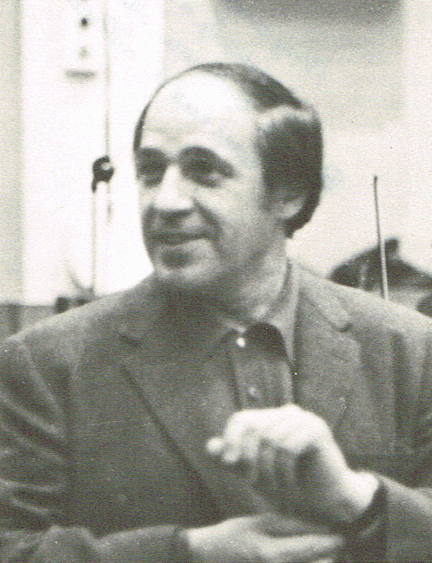
to
Pierre Boulez, composer - part 1 (of 4)
to
Pierre Boulez, conductor - part 2 (of 4)
to
Top 100 Composers: Pierre Boulez - part 3 (of 4)
to
Pierre Boulez, IRCAM - part 4 (of 4)

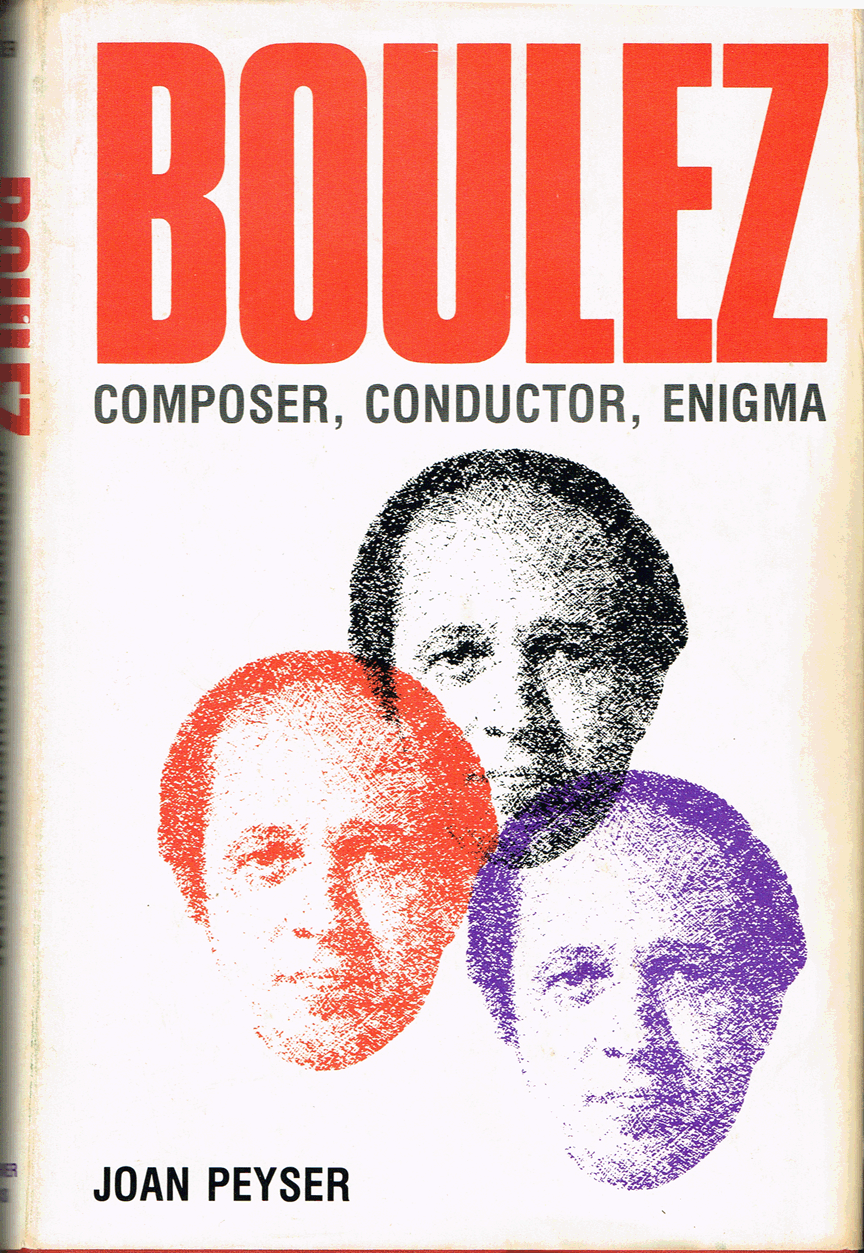
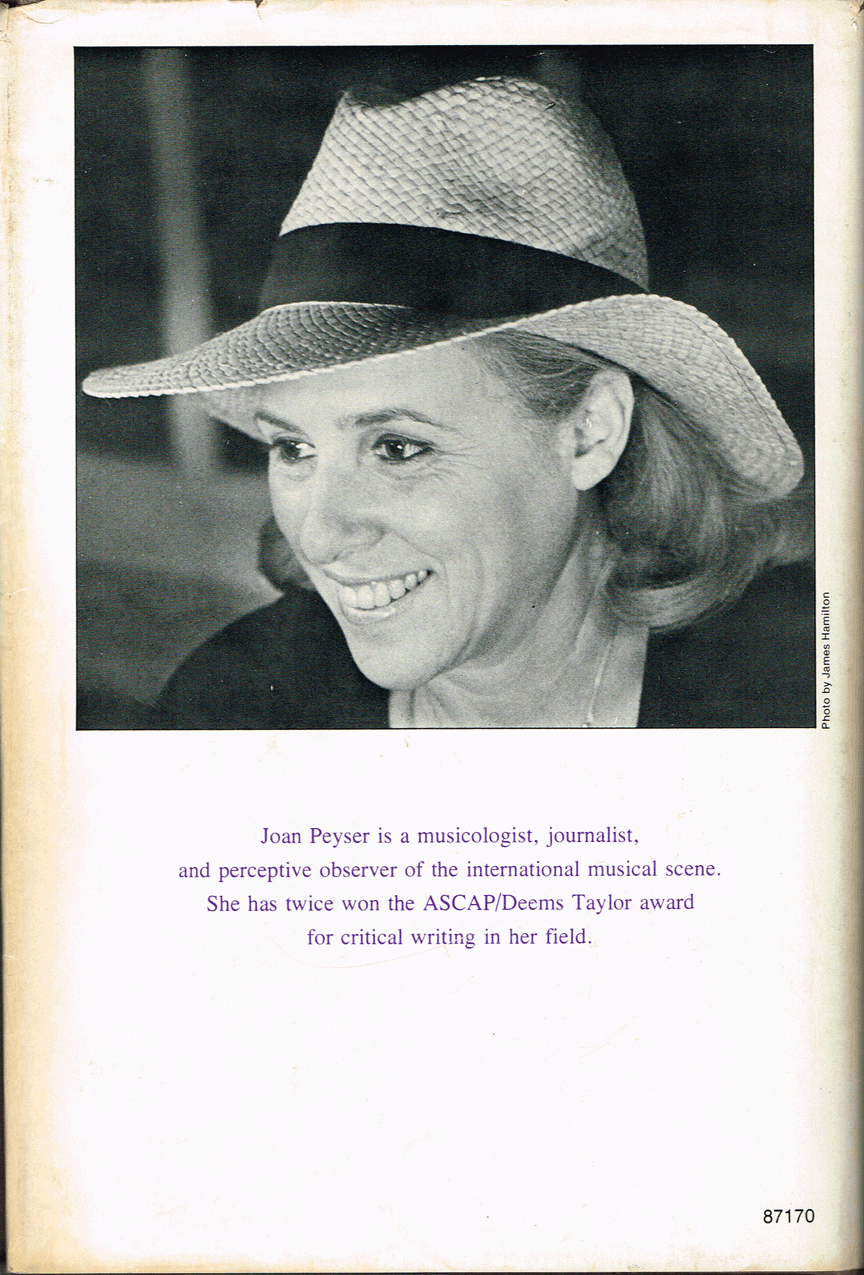
review of
Joan Peyser's Boulez, Composer, Conductor, Enigma
by tENTATIVELY, a cONVENIENCE - April 15-24, 2018
https://www.goodreads.com/story/show/622967-pierre-boulez?chapter=1
https://www.goodreads.com/review/show/2372975110
https://www.goodreads.com/book/show/10305490-boulez
My reading this bk isn't exactly completely strange but doing so illustrates how I come to do things sometimes. I'm very slowly compiling an online list of my "Top 100 Composers" ( http://idioideo.pleintekst.nl/Top100Composers.html ). Pierre Boulez is on that list. Alas, as w/ so many of the composers mentioned there, I don't feel absolutely enthralled w/ his music. Making matters 'worse' is that I'm making webpages for each of the composers but putting off making the webpages for the composers most important to me b/c making them will be so time-consuming. Since Boulez is a minor major composer for me it'll be easier to make a webpage for him than for other composers whose work I like much more. That results in a skewed prioritizing.
Reading this bk is an example of "skewed prioritizing". My friend Brainpang got a copy of Georgina Born's bk entitled Rationalizing Culture - IRCAM, Boulez, and the Institutionalization of the Musical Avant-Garde. He decided that he'd never read it so he asked me if I wanted his copy. I sd yes so he sent it to me. Since it's a present I prioritized reading it. However, since Peyser's bk covers Boulez's life up to the beginnings of IRCAM it seemed like I shd read it 1st & then read the Born. All this work, all this research for a composer whose work I'm only marginally enthusiastic about.
"On June 1, 1969, the New York Philharmonic announced the appointment of Pierre Boulez as its music director. He was to succeed Leonard Bernstein, the ebullient, gifted musical personality who had begun his career in the 1940s as the protégé of Serge Koussevitsky." - p 1
Hence begins the 1st paragraph of the "Introduction". As a 'setting of the stage' for English-language readers, it establishes Boulez as occupying a very prominent position in the classical music hierarchy of the US.
"The desire to escape from the severe discipline into which Boulez's idea had led moved whole sections of the new music world toward what he viewed as theatrical gimmickry and nihilism. Boulez accepted the Philharmonic post primarily to attack the situation. His purpose was to promote his own cause, to make familiar to large audiences the modern language in which he believed, in which form exercised a centripetal role." - p 2
Note that Peyser doesn't write "a central role" but "a centripetal role". Centripetal = "moving or tending to move toward a center.": SO is the reader to conclude that Peyser thinks that form isn't central but, instead, moves in that direction? That there either isn't anything in particular at the center or that there's something other than form? I think, more likely, she just liked the word "centripetal" more than "central".
I've already read one bk that focuses substantially on the New York Philharmonic under the direction of Bernstein, Benjamin Piekut's Experimentalism Otherwise - The New York Avant-Garde and Its Limits, in wch the reader learns of the Philharmonic's infamous resistance to performing John Cage's "Atlas Eclipticalis".
"Piekut actually interviewed members of the NYP decades after their notorious "Atlas Eclipticalis" concert:
""In Mansfield's opinion, the twenty concerts performed in the Avant-Garde series "were a gimmick . . . to satisfy the critics, to satisfy the people who wanted to see some kind of special interest being . . . programmed." The view of the series as a kind of conciliatory yet marketable gesture is held by another member of the orchestra (who wished to remain anonymous), who in conversation with me characterized Moseley as "a press man. His question was always, 'Is it newsworthy?'" Though the organization's administrators may have felt pressure to support the cutting edge of contemporary composition, they were also responding to the avant-garde's considerable notoriety in the early 1960s. As the clarinetist Stanley Drucker, who had joined the orchestra in 1948 under Bruno Walter, remembers, "As an idea, it was very New York. New York has an audience for everything. Maybe some things get a smaller audience, but they're all patronized." Indeed, "showbiz" was a term that sprang to the bassist Walter Botti's mind in my interview with him." - p 32 " - "Experimental, Ism; Other, Wise": https://www.goodreads.com/story/show/412180-experimental-ism-other-wise
Piekut's bk covers a small time & place: NYC, 1964. That's 5 yrs before the announcement of Boulez replacing Bernstein. Regardless of how it turned out, Bernstein's "Avant-Garde series" was far more 'Avant-Garde' than anything Boulez ever did w/ the Philharmonic - but Peyser's bk presents Boulez as if he's the 1st person to ever try to expand the Philharmonic's repertoire into the 20th century. What Boulez did do was foster a rather moronic anti-Americanism that probably appealed to the diehard 'loyalists' whose ancesters hadn't escaped the American Revolution to go to Canada:
"Boulez said he had been in Chicago at the time but that someone had quoted to him Babbitt's remark that a performance of a Babbitt piece in Lincoln Center was like a philosophy paper being read on the Johnny Carson show. Boulez attacked Babbitt's "ghetto' point of view and then put the knife deeply into America's back. There had been no strong musical personalities in the United States, he said, since World War II." - p 4
1st, I'm even less enthusiastic about Babbitt's music than I am about Boulez's. Babbitt doesn't even make it to my Top 100 Composers list (although he might be a 'runner-up'). That sd, I think Babbitt's quote is funny. He's saying outright that a prominent American cultural institution is more commercial than its PR image wd have the general public believe. Boulez, on the other hand, is just revealing his own extremely myopic ignorance. If I understand correctly, the above Boulez quote is from 1969 so we'll say that the period referred to as having "no strong musical personalities in the United States" is from 1945 to 1969. I'm sure Boulez was only referring to classical composers but the quote doesn't say that specifically so here's a somewhat off-the-top-of-my-head list of "strong musical personalities in the United States" in that era:
Art Ensemble of Chicago
Babbitt, Milton
Brant, Henry
Braxton, Anthony
Brown, Earle
Cage, John
Captain Beefheart & his Magic Band
Carter, Elliot
Coleman, Ornette
Copland, Aaron
Cowell, Henry
Crumb, George
Dolphy, Eric
Davidovsky, Mario
Davis, Miles
Doctor John the Night Tripper
Dodge, Charles
Druckman, Jacob
Ellington, Duke
Erb, Donald
Feldman, Morton
Foss, Lukas
Gaburo, Kenneth
Graettinger, Robert
Harrisson, Lou
Hendrix, Jimi
Hiller, Lejaren
Hovhaness, Alan
Hunt, Jerry
Kamin, Franz
Kraft, William
Lucier, Alvin
Mimaroglu, Ilhan
Mingus, Charlie
Mitchell, Joni
Partch, Harry
Reich, Steve
Reynolds, Roger
Schoenberg, Arnold
Shields, Alice
Siegmeister, Elie
Simone, Nina
Sonic Arts Union
Sun Ra
Taylor, Cecil
Varèse, Edgard
Velvet Underground
Wilson, Olly
Wolff, Christian
Wolpe, Stefan
Wuorinen, Charles
Zappa, Frank
..& that list is obviously very limited. I like most of the work by those above more than Boulez's so I think if Boulez had been more honest he might have sd: 'There have been no musical personalities close to or identical to me & my few European composer friends in the United States since World War II.'
I was immediately impressed by Peyser's writing b/c she seems to've pursued Boulez rapaciously regardless of his resistance to her writing this biography & b/c she actually seems to have some significant understanding of the music so her pursuit doesn't just come across as that of a malicious gossip.
"And so, for the next five years, through hundreds of hours of conversation, Boulez concealed a lot of his life from me. Just before I made my first trip to France I asked him for the address of René Leibowitz, his second and probably most important composition teacher. (Messiaen was his only other.) Boulez said, "Leibowitz is no friend of mine." I explained that I was not limiting my interviews to friends. "Of course," he answered, "you are preparing a document." Still, he did not help me to locate Leibowitz, who was then living in an apartment on the Left Bank. When I told Leibowitz my subject was Boulez, he became silent. Only after I explained that I was writing a history of midcentury music, in which Leibowitz had played a large role, did he begin to unfold his own story of the confrontation and terrible trouble with Boulez-including Boulez's efforts to wreck Leibowitz's career.
"A few weeks after our long conversation, Leibowitz died at fifty-nine of a heart attack. I wrote his obituary for the New York Times." - p 8
It seems like I've often sd that people who present their opinions as 'objectively true' & who, at least, have the appearance of being able to back up their assertions w/ great 'authority' are people who're going to 'go far' b/c the world is full of robopaths (aka 'sheep') who have no strong opinions of their own & who look to leaders to tell them 'what to think'. Boulez has had a highly 'successful' career b/c he is a substantial composer, a hard-working conductor, & b/c he meets the conditions of the opening sentence of this paragraph. I'm all for those 1st 2 characteristics, it's the last one that I find objectionable. Boulez sets himself up as an authority over just about everyone:
"Boulez wrote a letter attacking Craft's "sour mixture of incompetence and pedantry" and challenging the authorship of Stravinsky's writings, claiming what has subsequently been charged by others: that in the later years, they were not only written by Craft but not even reviewed by the aging master. Boulez ended by admonishing Craft to "stop imposing your insipid countenance on the features of a man who has nothing in common with your rancor, your impotence, and-in a word, your nothingness."" - p 9
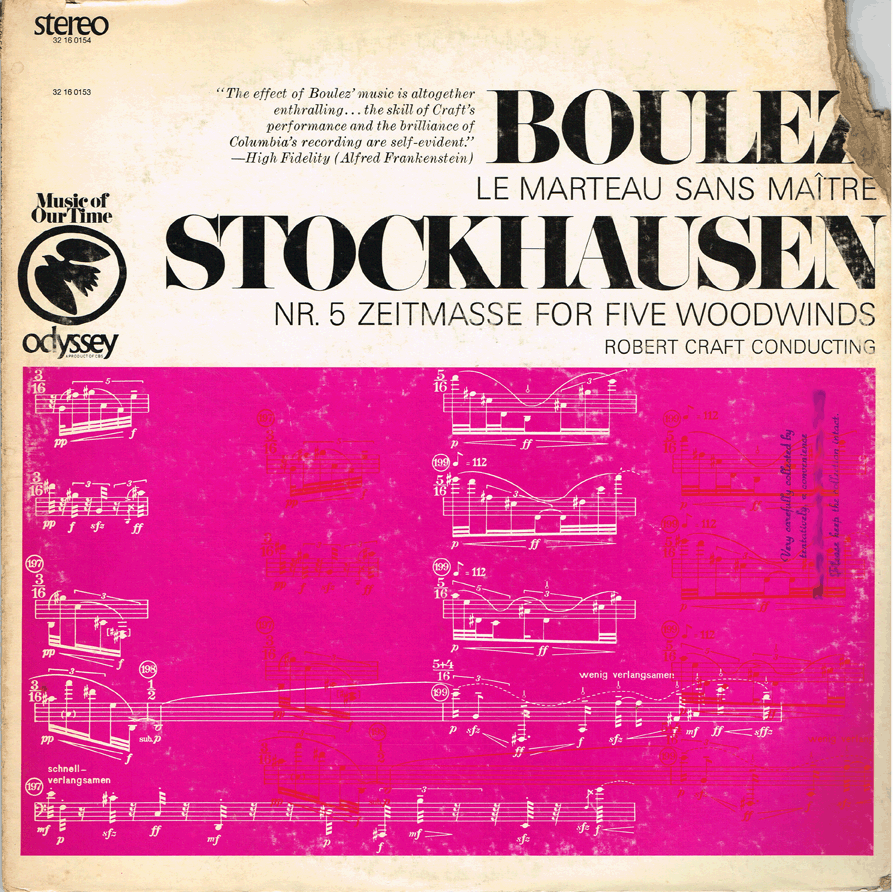
Whew! Boulez is definitely throwing stones from a glass house when he refers to "rancor" or "impotence" (his sex life apears to be non-existent). I don't know anything about the controversy regarding Craft & Stravinsky so I'll let that lie. What I do know is that I 1st heard what was then reputed to be the 'complete works' of Varèse conducted by Craft, that Craft recorded his conducting Antheil's "Ballet Mechanique", that Craft recorded his conducting what were then purported to be the complete works of Webern (1957), & of Schoenberg too. Not only did Craft do this but he did it before Boulez did - putting Boulez in an obviously secondary position as a 'champion' of the 'Viennese School' in the US. Craft cd honestly say: 'Been there, done that.' Hence, Boulez has to attack Craft's integrity in order to put Boulez at the top. The competitiveness of it strikes me as rather nasty, like dirty politics. Finally, making things even 'weirder' is that the 1st piece I ever heard by Boulez was "Le Marteau sans Maitre", Robert Craft conducting, when I got the Columbia Masterworks recording in 1974.
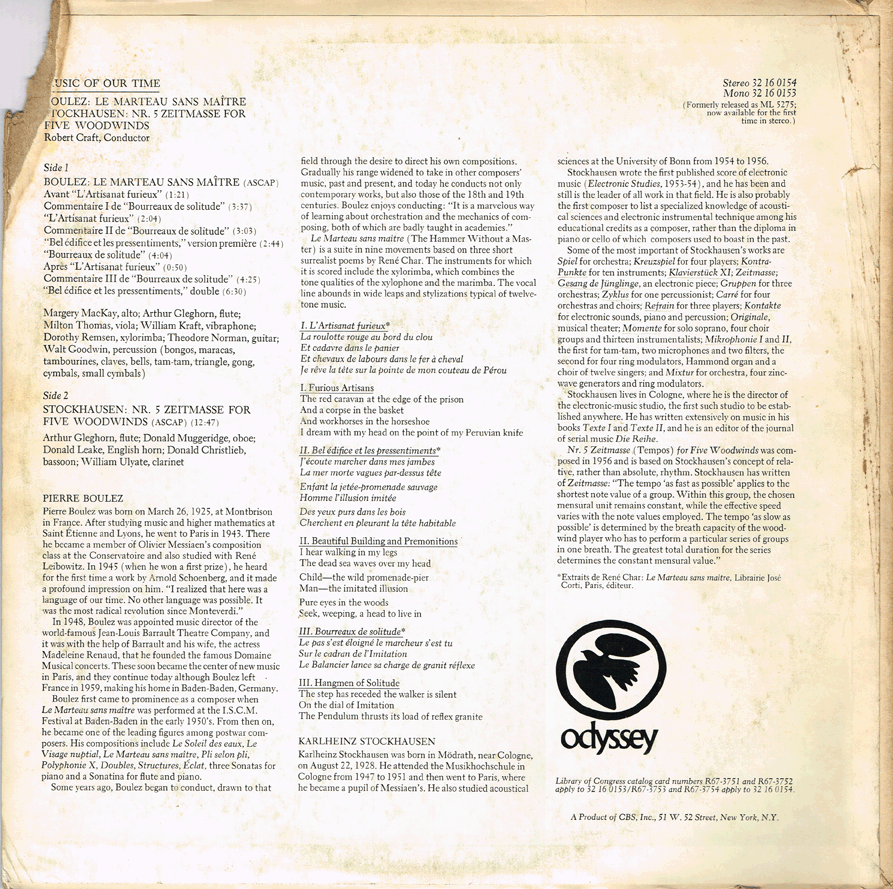
"Boulez's first project at Columbia was one that was very important to him: the complete works of Webern. Columbia had produced a Webern album under the direction of Robert Craft, but Boulez wanted to do one of his own. Boulez began discovering undiscovered Webern and also started to compose an essay about Webern that would be included in the package." - p 211
"Among the eager Webernians then was Pierre Boulez, who returns to be the mastermind of the new recordings, just as he was 30 years ago for a set made by CBS, now available on CD from Sony Classical. But there are differences. One is that the new box (Deutsche Grammophon 457 637-2; six CD's) is twice as large, including many works Webern withheld from publication.
"Some of these are juvenilia, imparting the unsurprising news that the composer at 16 was a talented, hopeful, somewhat incompetent beginner. His later rejects, though, include wonderful pieces, especially among the songs and instrumental movements he wrote in 1913 and 1914. During that period he gave thought to a sequence of orchestral pieces, some with solo soprano, rather in the manner of a distilled Mahler symphony. There might have been a similar string quartet with voice.
"Much later, though, Webern decided to issue sets of purely instrumental movements: the Six Bagatelles (Op. 9) for string quartet and the Five Pieces (Op. 10) for orchestra.
"This left out of account not only the song movements -- two with orchestra and the one with quartet are breathtaking -- but also quite a number of orchestral movements. Mr. Boulez includes five, and two extra bagatelles." - "MUSIC; A Complete Webern, With 'New' Works" by PAUL GRIFFITHS - AUG. 27, 2000, https://www.nytimes.com/2000/08/27/arts/music-a-complete-webern-with-new-works.html
For people like myself who've immersed ourselves in recordings of the more innovative 20th century musics & in reading about the same, this bk is something that fleshes out personalities more than most. A recurring character is the pianist Paul Jacobs. Peyser depicts him as a major champion of adventurous 20th century classical music. I hadn't realized how active he was. In my own pantheon of such pianists people such as David Tudor & the Kontarsky Brothers feature more prominently. Nonetheless, I have recordings of Jacobs playing Schönberg, Bartok, Busoni, Carter, Messiaen, & Stravinsky - certainly an impressive repertoire but not the most 'cutting edge' of the possibilities. One of the many points of interest about this bk, for me, was learning more about Jacobs. I'll probably pick up any recordings by him that I don't currently have out of curiousity.
"Boulez's refusal to share facts, thoughts, and feelings is not limited to his relationship with me. Paul Jacobs, the specialist in twentieth century keyboard music who has known Boulez since the mid-50s, says Boulez uses relationships the way other people go to the movies. Boulez would not argue the point. He believes "everyone is replaceable." No one, in any case, knows Boulez well. "Neither I nor anyone," Jacobs maintains, "has ever been able to penetrate Boulez."" - p 13
Since I'm obsessed w/ cultural production both as a creator & as a critic & since I have very specific opinions on the subject(s) it's somewhat 'inevitable' that I found myself critiqueing Boulez's philosophical positioning.
"I believe a civilization that conserves is one that will decay because it is afraid of going forward and attributes more importance to memory than the future. The strongest civilizations are those without memory-those capable of complete forgetfulness. They are strong enough to destroy because they can replace what is destroyed. Today our musical civilization is not strong; it shows clear signs of withering. . . .
"The more I grow, the more I detach myself from other composers, not only from the distant past but also from the recent past and even from the present. Conducting has forced me to absorb a great deal of history, so much so, in fact, that history seems more than ever to me a great burden. In my opinion we must get rid of it once and for all.
"-Pierre Boulez, 1975" - p 19
The above statement, taken literally, calls for total amnesia if it were taken to the extreme that the bombast seems to call for. We wd have amnesia, we wdn't even speak a language, let alone remember our names or know how to drive a car or ride a bike, let alone conduct an orchestra.
It seems flagrantly obvious that it's important to maintain a balance in society: a balance between conserving & creating. I'm all for conserving, e.g., libraries & food growing & distribution systems - to name obvious things. There is no such thing & never has been a civilization "without memory", nor cd Boulez point to one. It seems equally flagrantly obvious to me that Boulez detaches himself from other composers b/c he wants to proclaim himself the 'greatest, most distinct composer', one of a kind n'at. I doubt that any serious scholar of contemporary classical music feels as strongly about Boulez's work as he apparently does. To me, he tries & tries again to be on the 'cutting edge' but always ends up amongst the blunted razors. "Le Marteau sans Maitre" (1955) ain't shit in contrast to Schönberg's "Pierrot Lunaire" (1912), IMO, & the list goes on & on.
As for "Today our musical civilization is not strong; it shows clear signs of withering. . . . "?: To put it mildly, I find that an insupportable assertion. But, then, Boulez wants to be the one who defines what "musical civilization" is & his definition is apparently going to be to the detriment of everyone but himself. If a vital "musical civilization", one that isn't "withering", is one in wch there's healthy new growth (to continue to use the biological metaphor) in abundance then I think it's accurate to claim that there's more new growth & healthy cross-pollination than ever hostorically known before. The fear might be more of a metaphorical 'cancer', an overabundance, rather than a withering. I, for one, am not worried about a 'cancer' of "musical civilization" any more than I am of a "withering". Boulez's proclmation strikes me as so ludicrous that it's hard for me to even imagine the sheep baaaaaing along w/ it.
I'm primarily interested in & enthusiastic about music from 1885 to the present - but I have no desire to have the music prior to 1885 no longer conserved/performed. In fact, I wish that music as far into the past as there was music were something that we cd still hear now. I'd love to be able to hear music as it was performed in 2000BC.
At the same time that I'm often repulsed by Boulez I have to at least give him credit for saying things that few people wd dare to say. The next paragraph exemplifies this:
"Boulez saw benefits in the German occupation of Paris. "The theaters were crowded. People could not leave the cities and all of them jammed into concert halls. I went to a concert given by my own piano teacher and could hardly get into it. The Germans virtually brought high culture to France."" - p 25
Ahem. Um.. weren't the occupying Germans nazis? & weren't they killing & imprisoning & torturing hoards of people? &, um, wasn't the culture they were promoting "Heimat culture" - meaning the kitchiest crap they cd subjugate people w/? I mean it's not like they were promoting Webern now was it? I don't think they were promoting the Surrealists either now were they? &, yet, Boulez likes French poets: Char, Michaux, Mallarmé. These poets were hardly nazis or examples of 'German high culture'. Sheesh. I find it interesting that Boulez can make such a politically blasphemous statement but I can't exactly say I agree w/ it!!
"In 1944 when Boulez entered the advanced harmony class, he had heard only Messiaen's Variations for Violin and Piano. Boulez admits that he was initially awed, but soon the awe turned to disdain. Sometimes he is harsh on Messiaen today: "Messiaen never really interested me. His use of certain Indian and Greek rhythms poses a problem-at least to me. It is difficult to retrieve pieces of another civilization in a work. We must invent our own rhythmic vocabulary, following the norms that are our own. Even in my earliest pieces, I was aware of that."" - p 31
Oh, lardy. There he goes pontificating again! Why is it "difficult to retrieve pieces of another civilization in a work"? It's just something that one decides to do in whatever way one decides to do it. These 'laws' that Boulez is constantly laying down are a primary impediment to his being a truly GREAT composer instead of a 2nd rate excellent one.
I happen to like Messiaen's work very much even though he heavily sold himself as a Catholic composer, the Catholic church being something that I generally abhor. By 1944, Messiaen had been composing for 27 yrs. Surely in that time he'd composed some remarkable works. "Les Offrandes oubliées" (1930), e.g.. Or how about his "Fete des belles eaux" (1937) for 6 Ondes Martenots? Or his "Vingt Regards sur l'Enfant-Jésus" (1944)? I have a recording of Peter Serkin playing that that I find stunning. On the same page as the last quote, the reader learns that "To earn money Boulez played the ondes martenot, an electronic keyboard instrument, in a pit orchestra in the Folies Bergères." Did he 1st learn of the instrument & have access to one thru Messiaen? Let's do a little yr-by-yr comparison between Messiaen's works & Boulez's:
1945-46: Boulez: "Quatuor pour quatre ondes Martenot" (Quartet for four ondes Martenot) - ok, it's an unpublished piece, maybe Boulez rejected it as too derivative. Still, does it remind you of anything just mentioned?
1946-48: Messiaen: "Turangalila-Symphonie" - this is still one of my favorite symphonies along w/ Ives's "Symphony No. 4". Anything that Boulez composed during this time wd seem small scale or even trite in comparison.
That sd, here's a sample Boulez work that I've heard recordings of:
1946 (revised 1949) "Piano Sonata No. 1" - certainly this is a remarkable work, perhaps among Boulez's most innovative & probably more innovative than Messiaen's piano work as of this time.
THAT sd, I wdn't call that piano sonata more innovative than any of Cage's piano music, esp the prepared piano music, to the same point in time. &, of course, a case cd be made that Ives's "Concord Sonata" (1904-1915) is far more inspired than Boulez's piano sonatas.
In other words, if Boulez were to give credit where credit's due instead of disparaging people that he obviously learned from he'd be alot more appealing to me.
I'd like to hear more pieces by more composers for Ondes Martenot.
"During his early student days Boulez wrote several works of which we have no record today-a Sonata for two pianos, a work for ondes martenot, and Oublie Lapide, a piece for a cappella chorus." - p 32
"To be free to compose Boulez needed money, and he found work as soon as he left the Conservatoire. In 1946, shortly after Jean-Louis Barrault and Madeleine Renaud separated themselves from the Comédie Française adn established an independent company at the Théatre Marigny, they made plans to stage André Gide's translation of Hamlet with incidental music by Honegger. Honegger orchestrated the work for brass, percussion, and ondes martenot. To play the electronic keyboard instrument he recommended a counterpoint student who was exceptionally gifted on the instrument, Pierre Boulez." - p 52
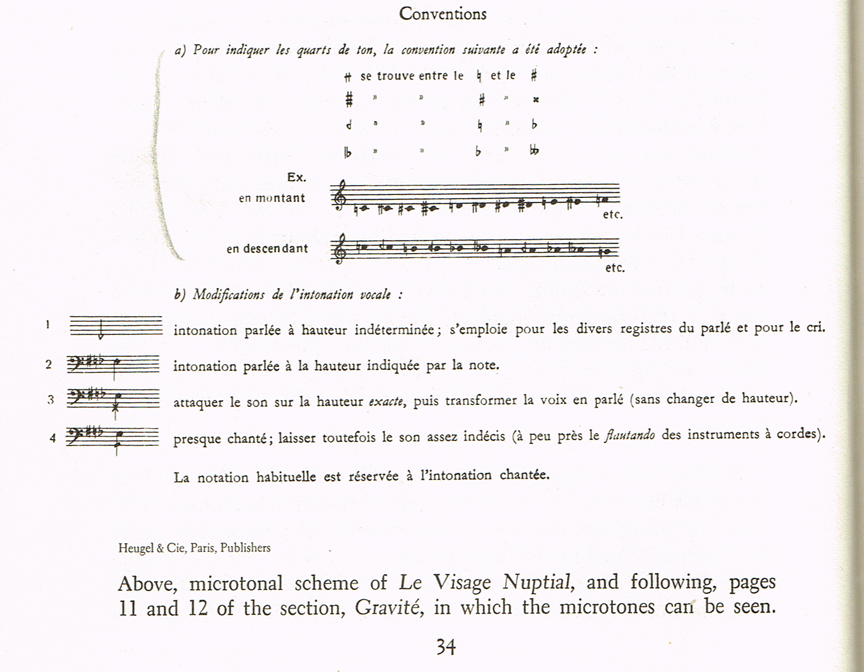
I don't recall previously knowing that Boulez composed music in quarter-tones. He did so in his "Le Visage Nuptial" (1946; revised 1951; revised 1988?89 - but that revision wd've been after this bk was written). In one of the many examples from Boulez scores that this bk provides, there's an explanation of the microtonal notation that's prefaced by "Pour indiquer les quarts de ton, la convention suivante a été adoptée" (To indicate quarter-tones, the following convention was adopted). It's not clear to me where the "convention" used came from. In Christopher Headington's The Illustrated Dictionary of Musical Terms the entry under "Quarter Tone" states:
"Half a semitone. Though theoretically feasible, in practice this interval is little used in western music and indeed is not always available-e.g., on keyboard instruments (though quarter-tone pianos have been made). Around the beginning of the 20th century, a few composers, notably Carrillo and Ives, began to employ quarter tones in their music, with an appropriate notation. It will be understodd that stave notation becomes increasingly difficult with sixth tones and even smaller intervals. The Mexican composer Julián Carrillo (1875-1965), perhaps the outstanding pioneer figure in microtonal music, used instead a numerical notation for music involving sixteenth tones. Few of the major figures among 20th-century composers have used quarter tones or other microtones, though Bartók does so, briefly and to some effect, in his First Violin Concerto and Sixth String Quartet." - p 115, Christopher Headington's The Illustrated Dictionary of Musical Terms, Harper & Row, 1980
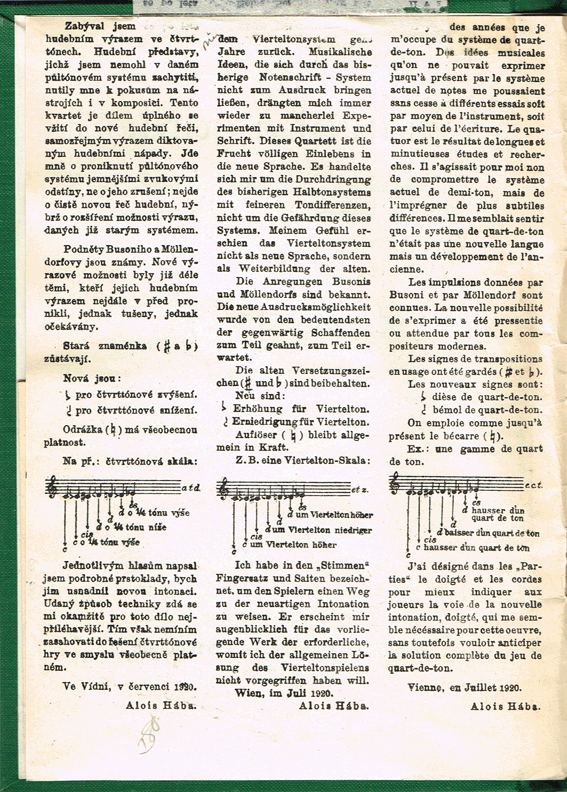
Headington's bk tends to be conservative but I still consult it from time-to-time b/c I have it laying on top of my spinet as a handy reference. There're many composers who use microtones, the most famous example probably being Harry Partch - although his use of them came later than did Ives's & Carrillo's. Closer to their time wd be Alois Hába whose opus 7 is a string quartet in quarter-tones from 1920. I've made a modest webpage re Hába wch shows the score for this that you can see here: http://idioideo.pleintekst.nl/Top100CHaba.html . The notation used there isn't the same as the notation Boulez used. Hába's symbol for 'sharp by a quarter tone' looks somewhat like an inverted question mark. His symbol for 'flat by a quarter tone' looks somewhat like an inverted question mark that's then flipped in its left-right orientation.
Boulez's notation uses 4 symbols instead of 2: a "sharp" w/ only one horizontal diagonal hatch mark designates a quarter-tone sharp, a "sharp" w/ 3 horizontal diagonal hatch marks designates 3 quarter-tones sharp; a "d" represents a quarter tone flat & a "|b" (not quite but you get the idea) represents 3 quarter tones flat. Given that quarter tone tunings are equal tempered one wonders why Hába didn't find sharp & flat differences necessary & cd, therefore, get by w/ only 2 new symbols - while Boulez not only finds it necessary to differentiate them but even has the last symbol be between "b" & "bb" rather than between flat & natural. In Wikipedia's Quarter tone entry ( https://en.wikipedia.org/wiki/Quarter_tone ) this is explained somewhat:
"The term quarter tone can refer to a number of different intervals, all very close in size. For example, some 17th- and 18th-century theorists used the term to describe the distance between a sharp and enharmonically distinct flat in mean-tone temperaments (e.g., D#?Eb). In the quarter tone scale, also called 24 tone equal temperament (24-TET), the quarter tone is 50 cents, or a frequency ratio of 242 or approximately 1.0293, and divides the octave into 24 equal steps (equal temperament)."
Since I tend to think of "quarter" as having a specific mathematical division meaning I tend to think of "quarter tones" as being a strict division of 24 tone equal temperament rather than as a generic term for a rough range of difference. In the Persian & Arabic examples given in the Wikipedia entry the symbol that I simplify to "d" (really a flipped flat symbol) is used - thusly showing a similarity to Boulez's usage. The quarter tone scale presented in an ascending & descending notation on the Wikipedia entry & is prefaced by this:
"Known as gadwal in Arabic, the quarter tone scale was developed in the Middle East in the eighteenth century and many of the first detailed writings in the nineteenth century Syria describe the scale as being of 24 equal tones. The invention of the scale is attributed to Mikhail Mishaqa whose work Essay on the Art of Music for the Emir Shihab (al-Risala al-shihabiyya fi 'l-sina a al-musiqiyya) is devoted to the topic but also makes clear his teacher Sheikh Muhammad al-Attar (1764?1828) was one of many already familiar with the concept."
The notation for this uses a sharp sign w/ only one vertical mark for a single quarter tone ascension & a sharp sign w/ 3 vertical marks for a triple quarter tone ascension; then there's a reversed flat sign (what I've typed here as "d") for a single quarter tone descent & a vertical line w/ a 'bulb' on both sides of its bottom (a combined "d" & "b" sharing the same vertical - looking somewhat like a downward-pointing arrowhead) as a triple quarter tone descent.
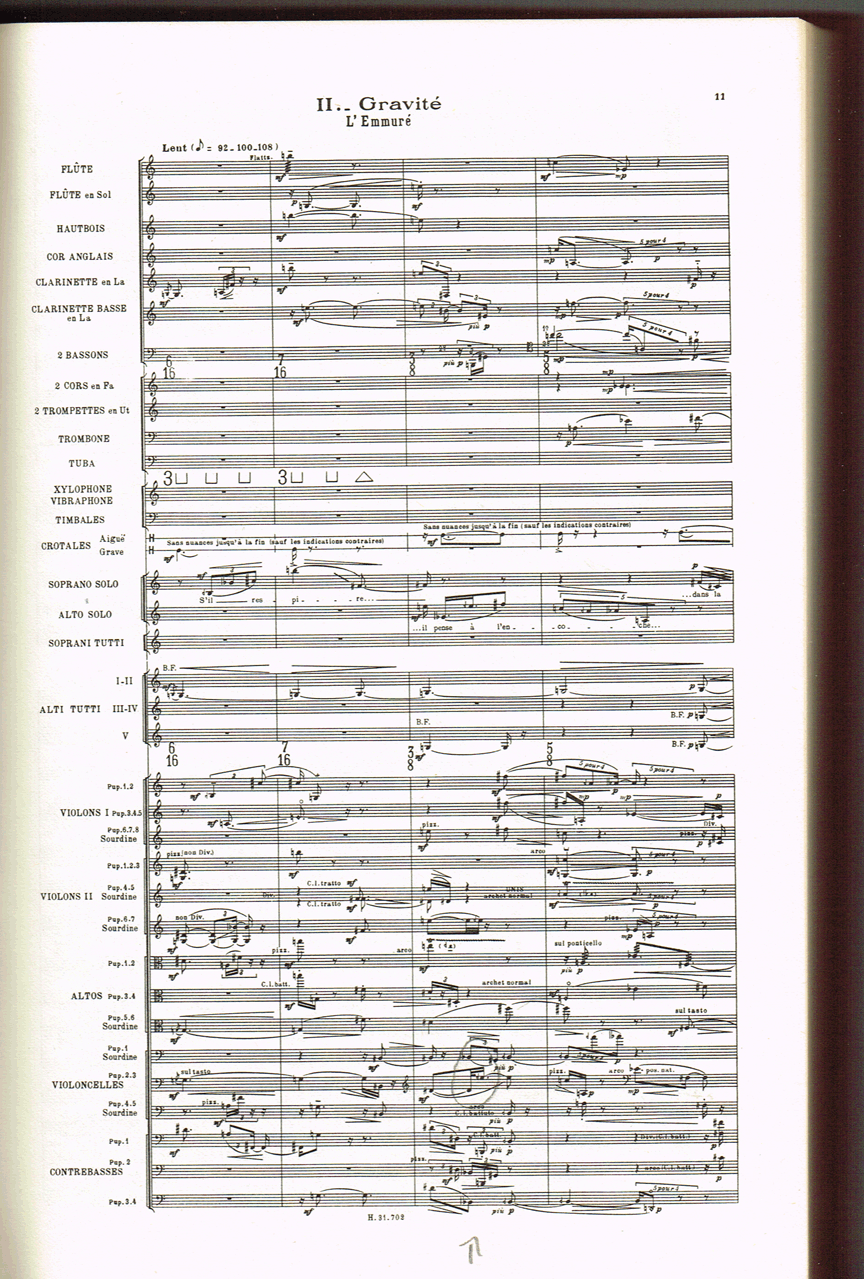
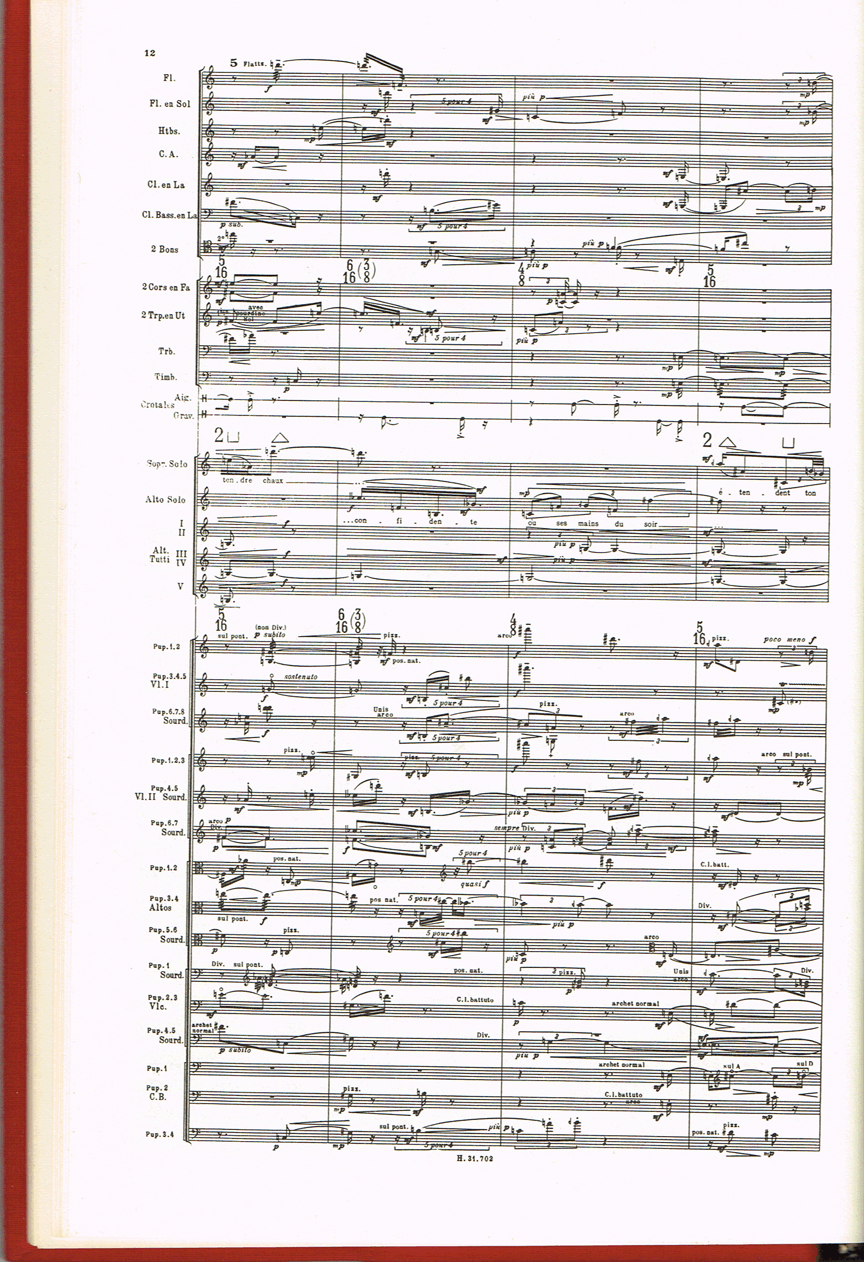
There's a sample page from Boulez's "Le Visage Nuptial" from the 11th page of the 2nd mvmt, "Gravité". In the 3rd measure of the 1st cello part in bass clef there's a Bb that descends to a G# & ascends to a dB (B 3 quarter tones flat). Presumably, Boulez is distinguishing here between dB & A a quarter tone sharp. What's not clear to me is whether the B 3 quarter tones flat is higher or lower than the A one quarter tone sharp & how much of a difference there is between them & what that difference is based on. Having watched a movie of Boulez conducting & having read about his conducting in this bk, I give him the benefit of the doubt that he can actually hear the desried difference & can correct the players when they make a mistake. He's not alone in this ability but it's still remarkable. I've been listening to microtonal music for at least 45 yrs & have played it for at least 23 yrs & I'm sure I wdn't be able to differentiate such a fine distinction.
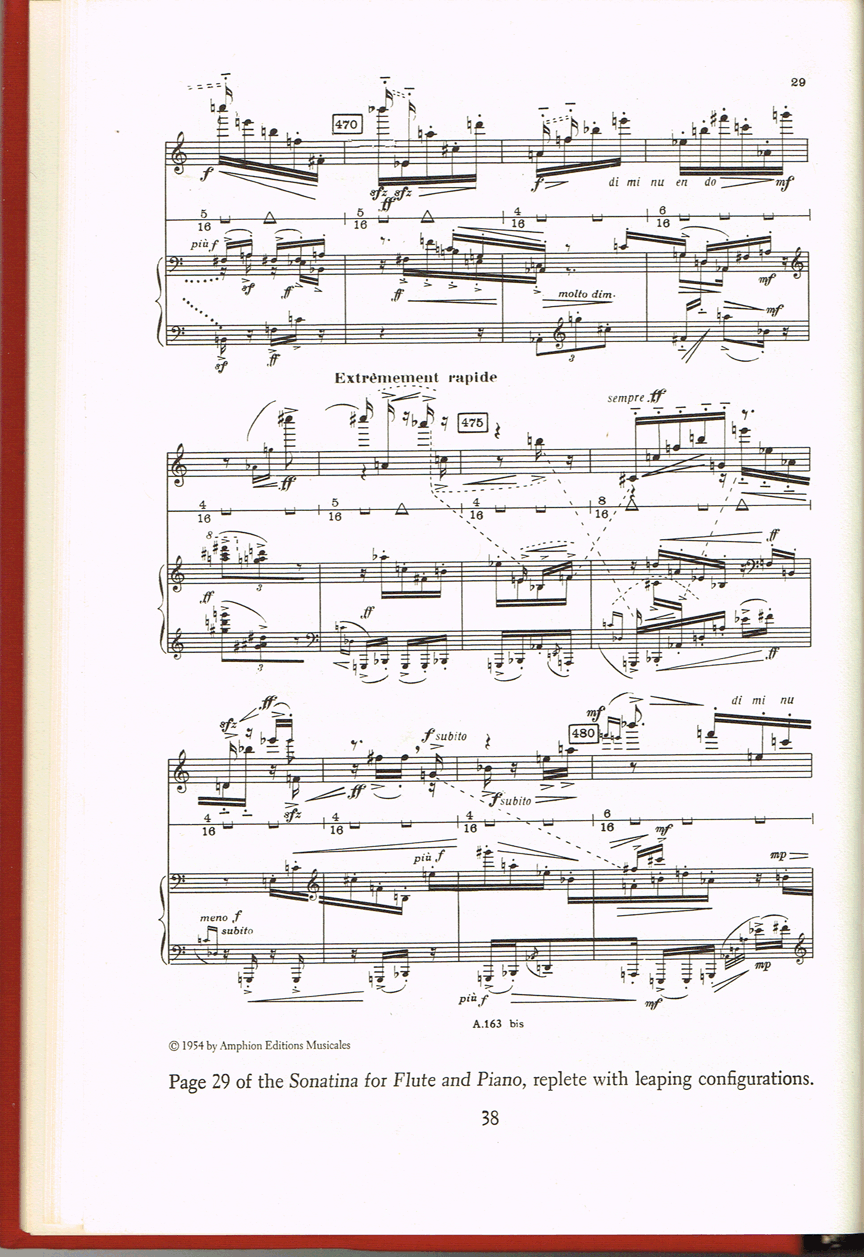
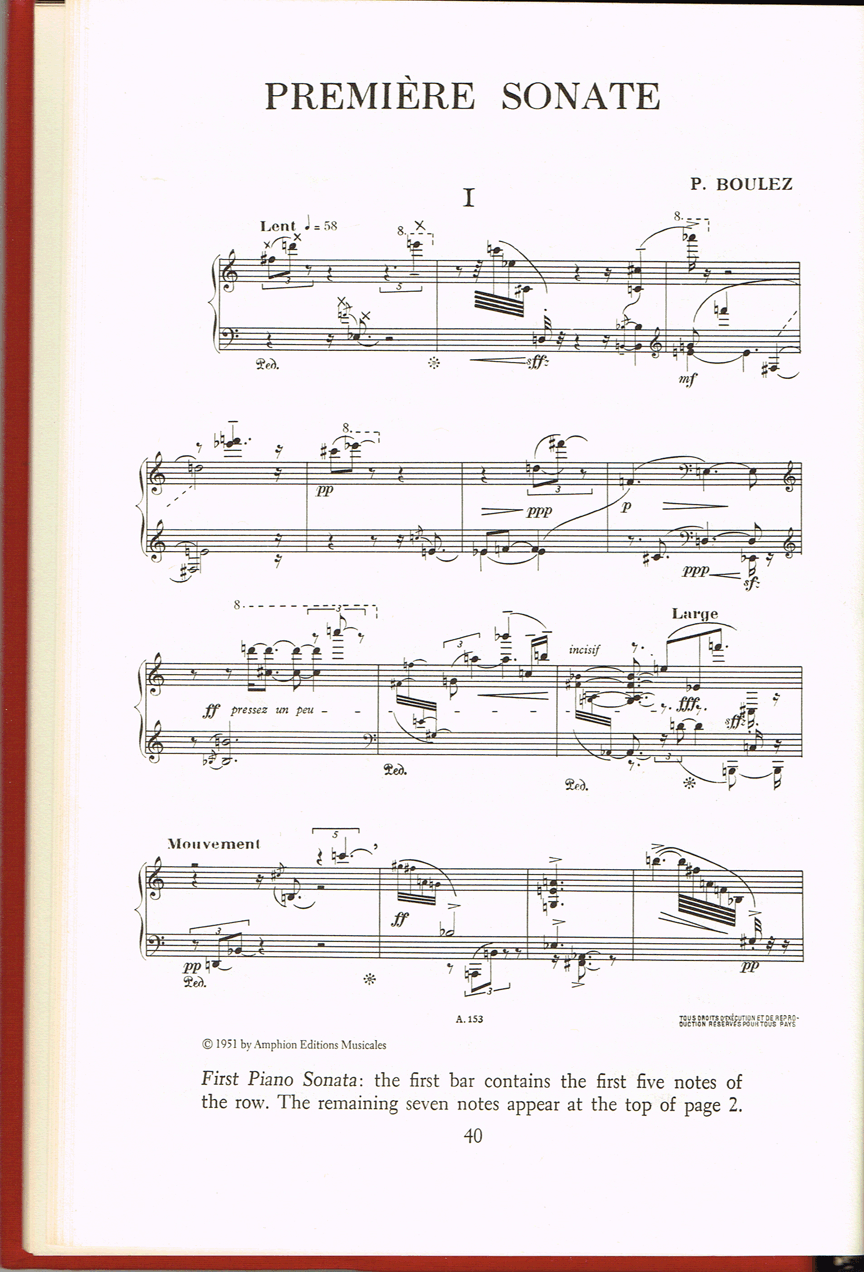
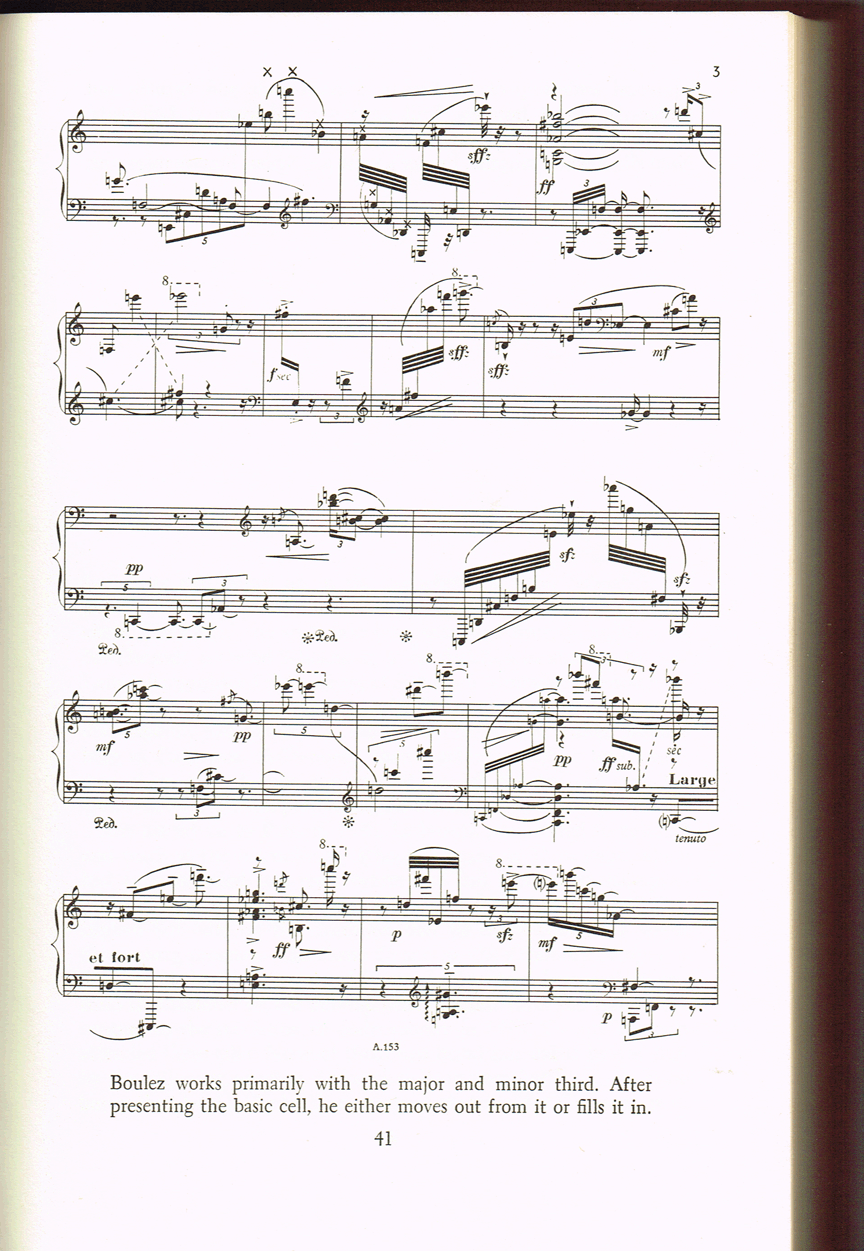
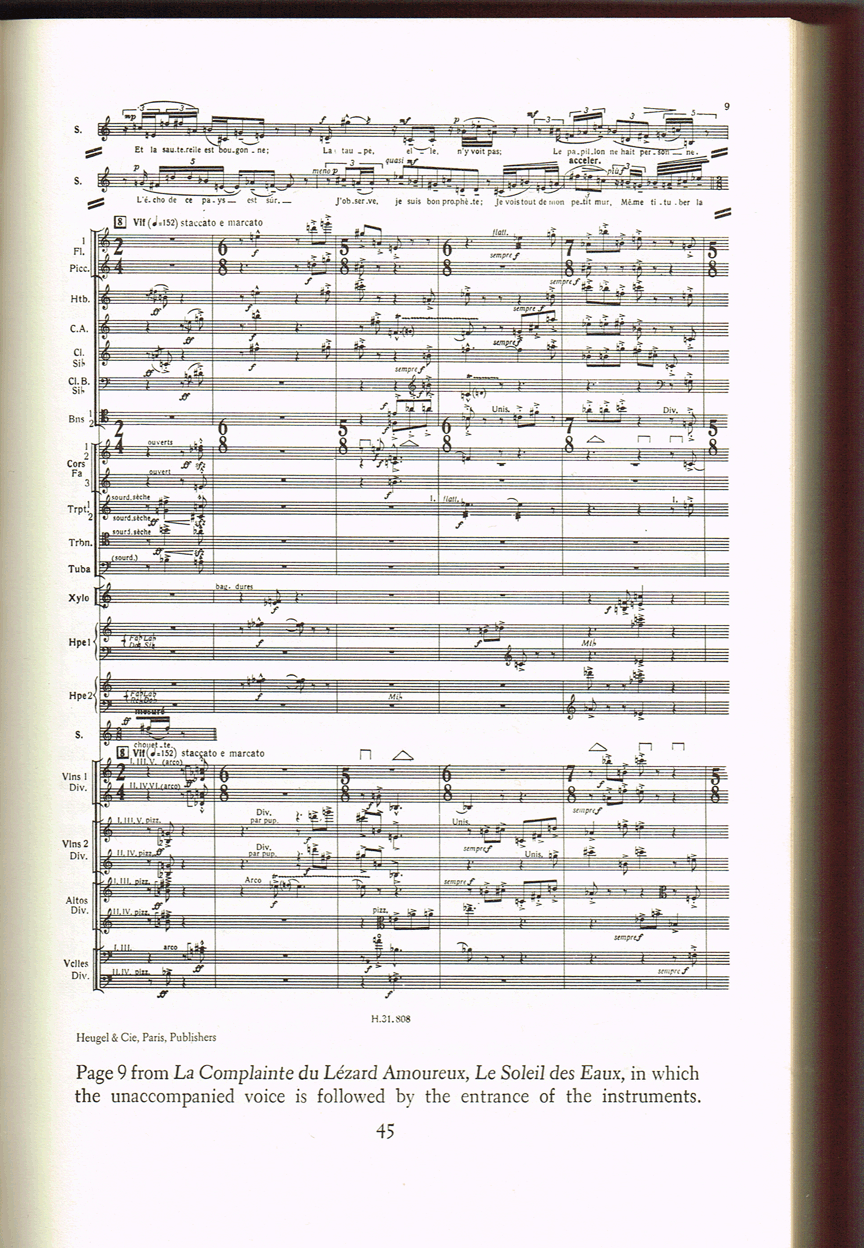
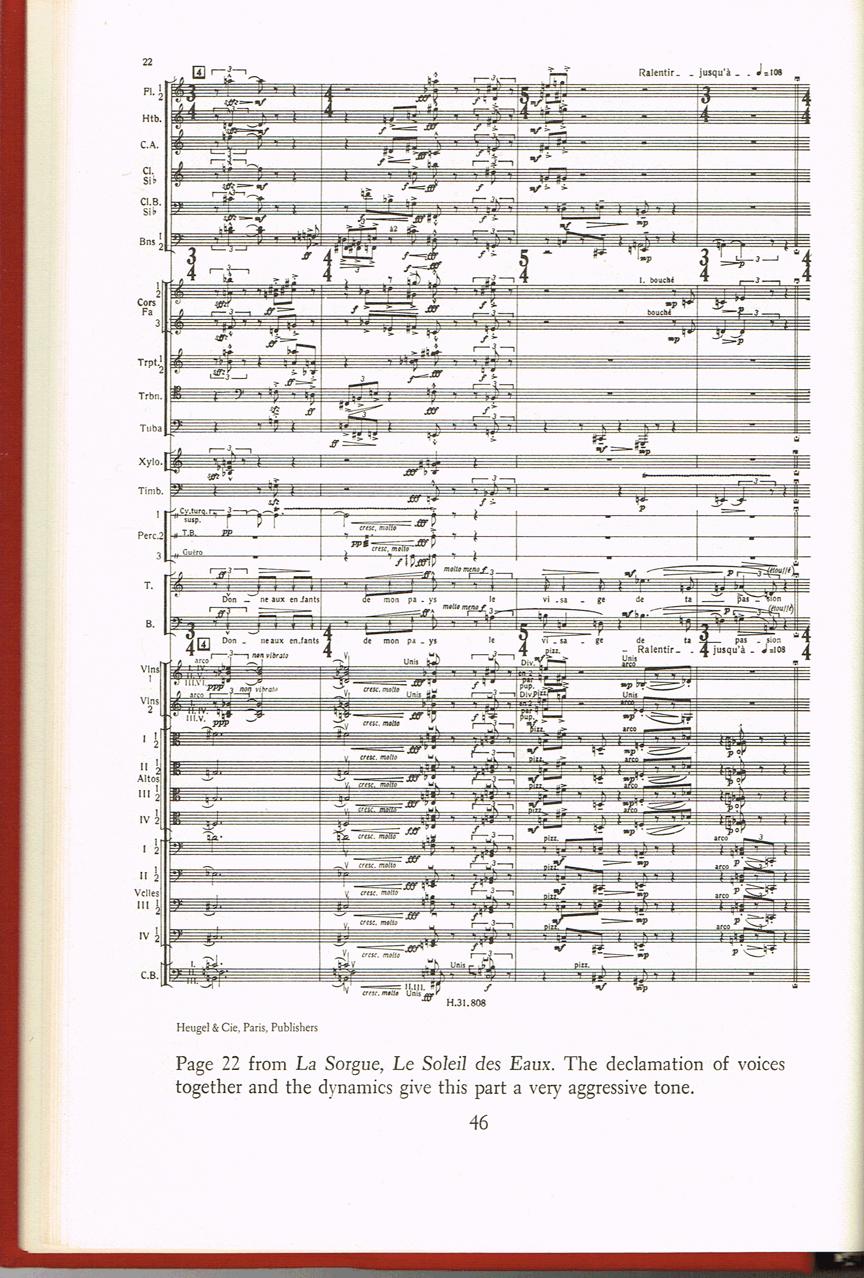
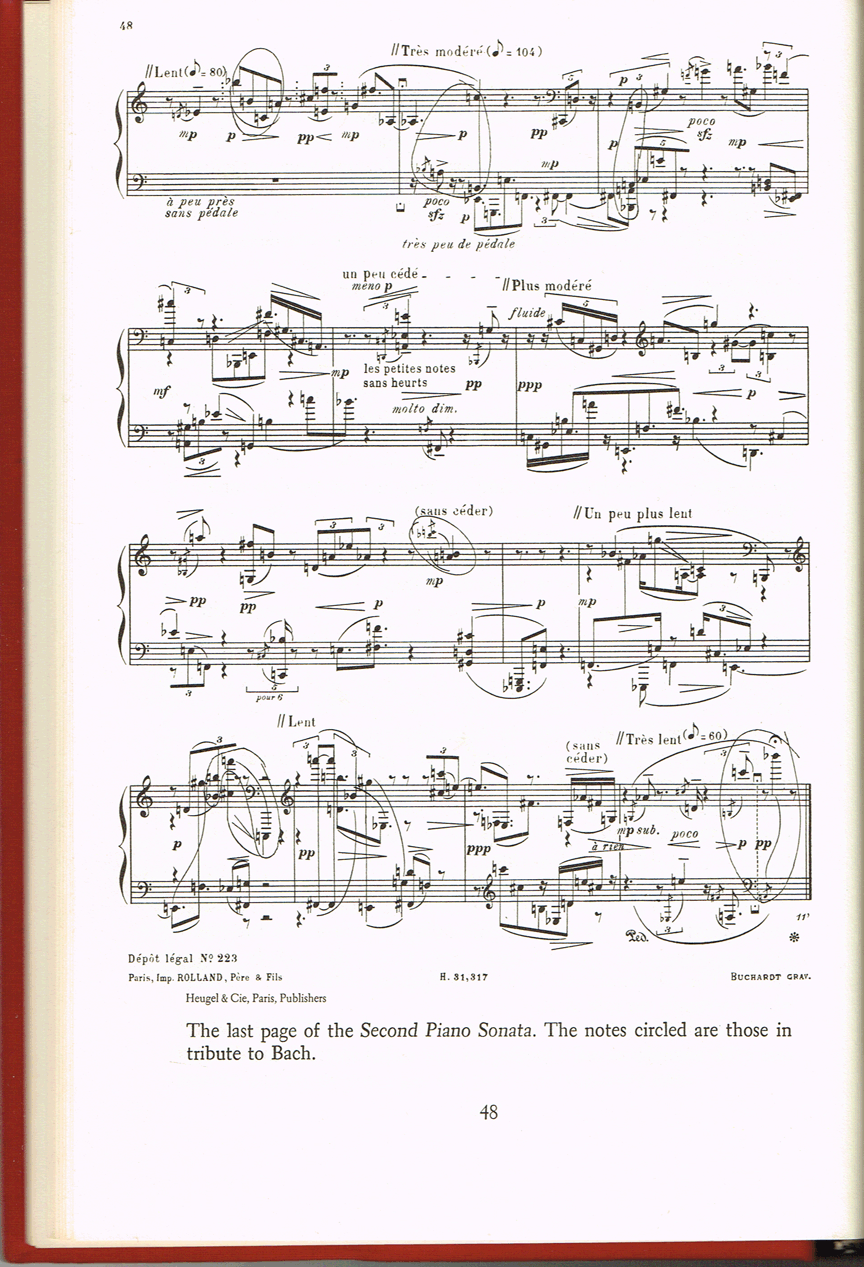
Peyser provides details that I've never read elsewhere:
"Cage's father, John Milton Cage. was born in Los Angeles in 1886 and was an inventor of some renown. He repeatedly ran away from home, and he never managed to complete high school. In 1913 he invented a submarine that stayed under water longer than any other in the world. But it ran on a gas engine and left bubbles behind. He had not, his son notes, considered the value of secrecy." - p 55
I knew that Cage's dad was an inventor but I don't recall ever reading about what he invented until now. But I had read about it already, actually: "The patent for his submarine was granted on January 26, 1915. Others were working on similar technology; for example, Isaac Rice of the Electric Boat Company patented an underwater vessel around the same time, which Krupps tried to patent for Germany after the First World War began. John senior had devised a highly theoretical launch for his submarine - it held the world underwater endurance record - but the key advantage of underwater travel had eluded him: his engine blew bubbles, making its presence obvious to everyone on the surface. To John senior, the submarine was well designed; if an accident occurred, the bubbles would let rescuers know where the craft lay. To the Navy, it was useless. Cage's father went bankrupt" (p 21, David Revill's The Roaring Silence, John Cage: A Life Arcade Publishing, 1992) There's more I thought I was reading here 1st:
"During his two years as student of Schoenberg, Cage met and married the daughter of an Alaskan priest, Xenia Kaskevaroff. About the same time he began to work-without pay-for Oscar Fischinger, an abract filmmaker in Hollywood. Fischinger used squares, circles, and triangles in his films. "Fischinger told me," Cage recalls, "that everything in the world has a spirit that can be released through its sound. I was not inclined towards spiritualism but I began to tap everything I saw. I explored everything through its sound. This led to my first percussion orchestra."" - p 57
Ok, I'd read about Cage studying w/ Schönberg before, that's a famous story - but just for the fun of it let's see what's written about that subject in Revill's bk:
"When they first met, Schoenberg told Cage, "You probably can't afford my price." Cage told him there was no question of affording his price as he had absolutely no money. Schoenberg asked him if he would devote his life to music. Cage, who had been unable to promise to dedicate his life to architecture, said yes. "In that case," Schoenberg concluded, "I will teach you free of charge."
"The timing of Cage's studies with Schoenberg is not clear. It certainly was not 1933, as Cage once claimed. Nor is it likely that Cage approached Schoenberg in the fall of 1934, as Calvin Tomkins suggests. David Nicholls has pointed out that Schoenberg arrived in America on October 31, 1934, but did not move from Boston to Hollywood until eleven months later. He suggests Cage returned to California in May 1935 and took Schoenberg's course at the University of Southern California in June or July.
"The nature and extent of their contact is not formally documented. Hans Keller, the British musician and critic of Austrian birth, went so far as acerbically to dismiss Cage's "public fantasies about his lessons with Schoenberg." "So long as Schoenberg was alive, we didn't hear about Cage's studies with him," wrote Keller, "Schoenberg would have denied them. Whatever he did with Schoenberg, he never came to 'study' with him." David Nicholls vouches for Cage's attendance at the six-week USC course; the biography of Schoenberg by Stuckenschmidt only mentions Cage taking the summer course. That Schoenberg taught Cage is not necessarily remarkable; as the former recognized, whereas in Vienna he had taught the most promising students, in the United States - especially in California, to which he moved principally for his health - he could not pick and choose, and often had to instruct beginners. Cage's own account is that "I studied counterpoint at his home and attended all his courses at USC and later at UCLA when he moved there. I also took his course in harmony." One of the classes, according to Cage, had only three or four students." - pp 47-48, David Revill's The Roaring Silence, John Cage: A Life Arcade Publishing, 1992
I take Cage's word for it. I suspect Keller of not liking Cage's music & of not understanding that if Cage was getting his lessons for free that Schoenberg wasn't likely to advertise it b/c he wasn't likely to want to be so generous to others. As for Cage working w/ Fischinger? That's almost as significant to filmmakers as Cage's studying w/ Schoenberg is to composers. The story about Fischinger is recounted in greater detail in the Revill bk too. I didn't remember that either. So much for my memory.
[For what it's worth, I've written about Cage. Some of the more substantial of such things that I've written that're online are my review of Cage's Anarchy: https://www.goodreads.com/review/show/1739013723 ; "There's no pun on the last name "Cage" in this title": - a review of the Richard Kostelanetz edited John Cage An Anthology: https://www.goodreads.com/story/show/607353-there-s-no-pun-on-the-last-name-cage-in-this-title?chapter=1; & "Improvisation Writes" - a review of Stefan Szczelkun's Improvisation Rites: from John Cage's 'Song Books' to the Scratch Orchestra's 'Nature Study Notes'. Collective practices 2011-2017: https://www.goodreads.com/story/show/610819-improvisation-writes?chapter=1 .]
According to Peyser, Cage & Boulez started off as friends, supporting each other's work b/c they were both fervently exploring & developing new music territory. To me, that's as it shd be.
"On his part Boulez did what he could for Cage. He introduced him to Messiaen who invited him to the Paris Conservatoire to demonstrate the prepared piano in class. He also brought him to Suzanna Tezenas. Mme Tezenas, Souvchinsky, and Boulez prepared a guest list of one hundred artists and made plans to present Cage's Sonatas and Interludes. The afternoon of the performance, Cage spent three hours carefully inserting objects into the piano that he had chosen for the work. Something was not in order with the una corda pedal and Suzanne Tezenas watched with apprehension as Cage poured cognac into her Bechstein to weaken the glue between the strings so he could move the hammers in a way that would secure the effect he had in mind. Cage worked with cardboard underneath his materials in order not to damage the soundboard. He says he always leaves a piano in better condition than he finds it." - p 61
["The soft pedal (or una corda pedal, Italian for "one string") is one of the standard pedals on a piano, generally placed leftmost among the pedals. On a grand piano this pedal shifts the whole action (including the keyboard) slightly to the right, so that the hammers which normally strike all three of the strings for a note strike only two of them. This softens the note and also modifies its tone quality. Tone quality is also affected by forcing the remaining two strings being struck to make contact with a part of the hammer felt which is not often hit (due to the whole action being shifted); this results in a duller sound, as opposed to the bright sound which is usually produced (due to the felt being hardened from regular use)." - https://en.wikipedia.org/wiki/Soft_pedal ]
""P.B. was at work on a score. The notes were so tiny, as tiny as the feet of a fly. About him were pieces of charts that would seem to have more properly belonged to a mathematician. The composition he was writing was Polyphonie X. I decided immediately to do it for the first performance of the festival I planned for Donaueschingen, near Baden-Baden, scheduled for October 1951." Strobel's festival became an annual attraction, providing what was probably the most important marketplace for new music in Europe. All the heads of German radio stations came, composition students came" - p 66
I think I probably 1st encountered reference to the existence of the Donaueschingen festival in the form of Sun Ra And His Intergalactic Research Arkestra's "It's After The End Of The World - Live At The Donaueschingen And Berlin Festivals" record recorded in 1970 & published on the BASF label. Was this the 1st time Sun Ra was welcomed into the European avant-garde?
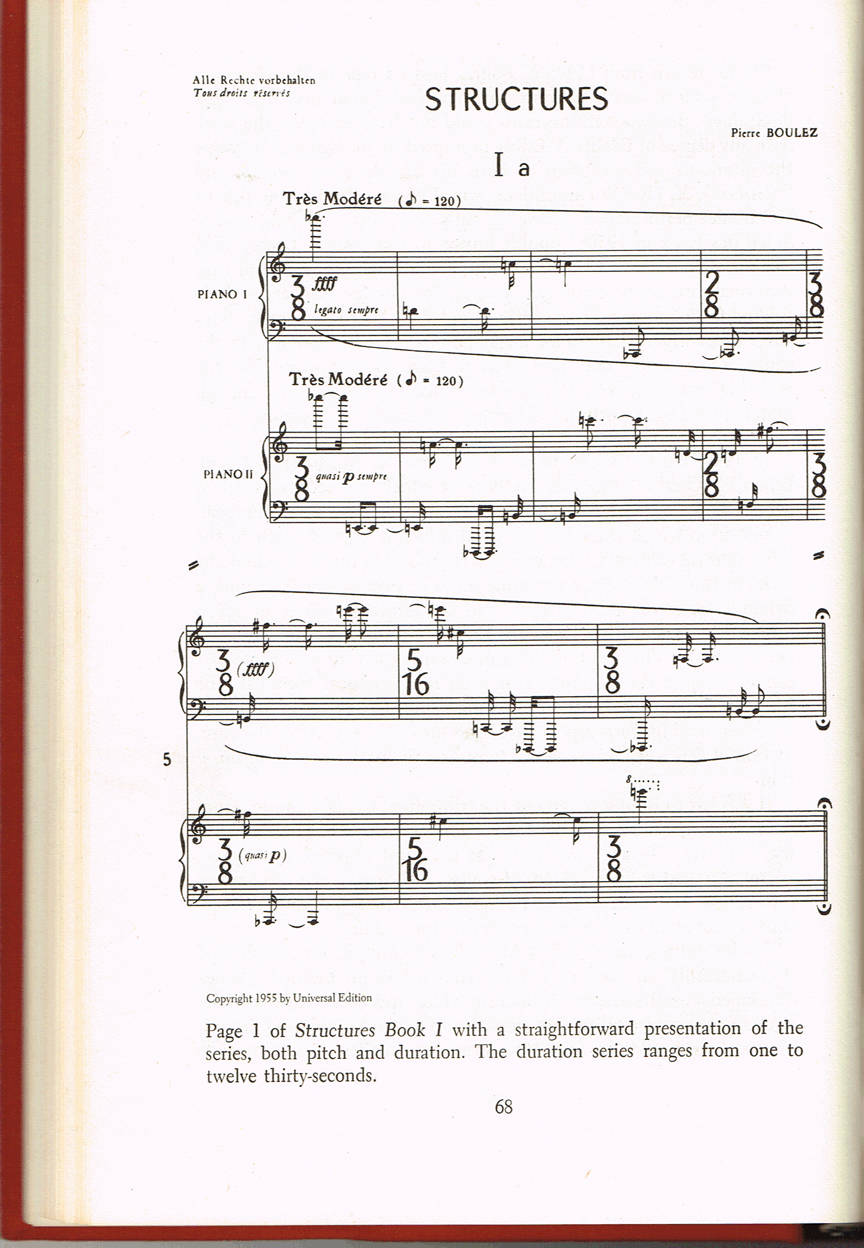
"Going one step further than the H C A B of the Second Sonata. Boulez planned the work" ["Structures"] "to be an Art of the Fugue for the serial language. It was to consist, Boulez says, of three large books cavering all aspects of the grammar. Book I, written in 1952, includes three pieces numbered 1 a, 1 b and 1 c. 1 a exposes the basic material which is stated in the opening bars by inversion between the two pianos. The four basic constituents remain clearly defined throughout the piece. 1 a concentrates on pitch and duration; 1 b on differences in attack; 1 c superimposes contrasts of dynamics on the other elements." - p 69
Various things are recurrent themes: the comparison, analogical seemingly more than metaphorical, between literature & 'the literature': between the written word & the notated music; Boulez's apparent obsession w/ replacing tonality w/ serlialism as if it's some sort of Reich meant to endure as a monolith for hundreds of yrs. Independent of how annoying I find that latter to be, Boulez's "Structures" piece, as outlined above, seems ambitious to an impressive extreme. Alas, as w/ so many of Boulez's works, his grand vision seems to've never been completely realized.
This bk truly is a treasure trove for people interested in mid 20th century avant-garde classical music. It's like reading a celebrity magazine for nerds.
"In january 1952, seven months after Boulez enlisted Pousseur, he mat and made a strong impression on Stockhausen, who had come to Paris to study at the Conservatoire. Srockhausen also made a strong impression on Boulez. "I recall the first meeting very well," Boulez says. "I knew no German. Stockhausen knew no French. A friend, Louis Sauger, translated. We gesticulated wildly. I knew immediately that here was someone exceptional. I was right. I came to trust his music more than anyone else. We talked about music all the time-in a way I've never talked about it with anyone else."" - p 76
Imagine the work cut out for the spontaneous translator!!
"Stockhausen spent much of his early life in a Catholic monastery. He graduated from a gymnasium in 1947 and then attended the State Academy in Cologne. There he studied piano and music education, all the while earning his living playing piano in Cologne bars, serving as accompanist to an amateur operetta theater, and providing background music for a magician's act.
"At the Cologne Academy Stockhausen studied with Frank Martin, the Swiss composer who concentrated on analyses of Bartók scores." - p 77
For people like myself who're obsessive about such things, certain details 'pop out' unexpectedy. Stockhausen studied w/ Frank Martin?! I listen to a variety of music, getting into often obscure areas b/c of some very tangential entry point of interest. Take, e.g., the record label Opus One. For the most part, the music they publish doesn't interest me. I do, however, like their covers best-viewed-in-blacklight. Liking the covers led to my procuring more records of theirs than I might have otherwise. They managed to hold my interest because they published things by The McLean Mix, Stefan Wolpe, Jack Behrans, Alice Shields, Michael Horwood, Ruth Anderson, Ralph Shapey, Tui St. George Tucker etc.. I must've had a way of getting their records cheap b/c I have an abundance of them. It was thru eventually just getting ANY Opus One record that I got ones w/ the work of Frank Martin on them, a composer I hadn't previously heard of. Opus One 78 has his work as does 92 as does 106 as does 122. The publisher obviously likes his music. I remember listening to it carefully at least several times for each piece & being nonplussed by it. Now that I know that he was Stockhausen's teacher I'll listen to the work w/ renewed interest. All of this history fascinates me. The thought of being at a concert such as the one described below boggles my mind. This wd be a primo intellectual experience:
"The audience reacted hostilely; still Cage continued to promote Boulez. In August 1952 he arranged for Tudor to play the Second Sonata at Black Mountain College in a program that included works by Feldman, Cowell, Stefan Wolpe, and himself." - p 79
For me, personally, the whole issue of tonality vs atonality is really a non-issue. For me, there's no 'right way of doing things': it's just a matter of having an inspiration & following it - preferably a new inspiration for each piece or a deeper development for each piece. Nonetheless, academia is all about teaching people the 'right way of doing things' so the more people such as Boulez ascending to power, the more tonalism got replaced as de rigeur by serialism. This refreshed things for a little while but, IMO, the bottom line is still that if a composer's uninspired the work isn't interesting - regardless of whether it's tonal or dodecaphonic.
"institutions invariably trail creative life, and by the late 1950s serialism had displaced tonality as the musical grammar of the young artist.
"Personal tragedies in this period abound. Marc Blitzstein suffered as Diamond did. Unable to reconcile his affection for tonality with his desire to be in the vanguard, Blitzstein became increasingly depressed and appears virtually to have precipitated his own murder in Martinique. Others made accommodations: Thomson cultivated a career in music journalism as critic for the New York Herald Tribune. Still others attached to the old grammar slowly moved into the new. Roger Sessions composed his first twelve-tone work, the Sonata for Solo Violin, in 1953. And Stravinsky's shift to the grammar succeeded in sweeping the rest along. After his Canticum Sacrum of 1957, in which he used the entire chromatic scale for the first time, Irving Fine, Arthur Berger, even Copland followed suit. But Stravinsky did not regard with affection those who shifted from the old to the new. No longer interested in disenchanted neoclassicists, he wanted to develop a new set of friends. One man whom he sought was Milton Babbitt, father of serialism in the United States, whom Boulez met at a party in Cage's loft when he visited New York in the fall of 1952." - p 89
I don't know Blitzstein's work that well. I have a recording of his "The Airborn Symphony". I associate him w/ leftist Americanism. Blitzstein's story is complex. Consider this:
"Marcus Samuel Blitzstein (March 2, 1905 ? January 22, 1964), was an American composer, lyricist, and librettist. He won national attention in 1937 when his pro-union musical The Cradle Will Rock, directed by Orson Welles, was shut down by the Works Progress Administration. He is known for The Cradle Will Rock and for his Off-Broadway translation/adaptation of The Threepenny Opera by Bertolt Brecht and Kurt Weill."
[..]
"After studying composition at the Curtis Institute of Music, he went to Europe to continue his studies in Berlin with Arnold Schoenberg (with whom he did not get on), and in Paris with Nadia Boulanger (with whom he did). Despite his later political beliefs, he was, in the early years of his career, a self-proclaimed and unrepentant artistic snob, who firmly believed that true art was only for the intellectual elite. He was vociferous in denouncing composers-in particular Respighi, Ravel, and Kurt Weill-who, he felt, debased their standards to reach a wider public."
[..]
"The dramatic premiere of the pro-union The Cradle Will Rock took place at the Venice Theater on June 16, 1937. The cast had been locked out of the Maxine Elliott Theatre by the Works Progress Administration, the government agency which had originally funded the production, so the cast and musicians walked with the audience to the nearby Venice. There, without costumes or sets, they performed the work concert-style, actors and musicians alike, sitting among the audience (to evade union restrictions on their performance) with Blitzstein narrating from the piano."
[..]
"In 1958, Blitzstein was subpoenaed to appear before the U.S. House Committee on Un-American Activities (HUAC). Appearing first in a closed session, Blitzstein admitted his membership in the Communist Party (ending in 1949) and, challenging the right of HUAC to question him at all, refused to name names or cooperate any further. He was recalled for a further public session, but after a day sitting anxiously in a waiting room he was not called to testify.
"During a visit to Martinique in 1964, at the age of 58, Blitzstein was murdered by three sailors he had picked up in a bar, one of whom he was said to have propositioned. He is buried at Chelton Hills Cemetery, Philadelphia, Pennsylvania."
- https://en.wikipedia.org/wiki/Marc_Blitzstein
Peyser's claim that Blizstein was unable "to reconcile his affection for tonality with his desire to be in the vanguard" doesn't get into politics or sexuality at all. Consider this excerpt from Martin Brody's ""Music for the Masses": Milton Babbitt's Cold War Music Theory" in OPEN SPACE 15/16 (you can read my review here: https://www.goodreads.com/story/show/357236-this-review-is-not-elegant?chapter=1 ):
"Babbitt's recollection of his antipathy to the Music Vanguard (and Copland's comments therein on the comparative situations of young Russian and American composers) suggest that he was highly engaged by the debates over proletarianism, radicalism in general, and music during the 1930s. Babbitt must have been painfully well aware that radical politics played an important role in defining a fragile American musical culture in search of techniques and values. As Copland declared in his article "Note to Young Composers" in the inaugural issue of the Music Vanguard, the proletarian movement threatened to overthrow the great bourgeois lineage of European musical tradition: "It is no secret that many of the young composers who had taken one or the other of these two older men [Schoenberg and Stravinsky] as their models have now thrown in their lot with that of the working class.
"Recalling the period over forty years later, Arthur Berger elaborated on Copland's claim:
"[A]rtists were being supported and commissioned to carry out projects with Americana as their subject matter. You can really understand that the mannerisms and devices issuing out of Vienna were too remote for this purpose. . . .
"Curiously enough, Americanism [at that time] went hand in hand with political leftism. . . . Now it should be obvious that the demands of a proletariat [sic] music required greater accessibility than could be vouchsafed by the type of music emanating from Vienna." - p 325", OPEN SPACE 15/16
The point is that the questions over atonality vs tonality were a deeply political one for many composers who were trying to make music in support of proletarian struggle. Blitzstein's death in Martinique reminds me of Gregory Battcock's death in San Juan, Puerto Rico & Pier Paolo Passolini's death in Ostia, Italy. Consider these excerpts from Ed Vulliamy's article entitled "Who really killed Pier Paolo Pasolini?" regarding the latter:
"Pelosi confessed: he and Pasolini had set off, and he had eaten a meal at a restaurant the director knew, the Biondo Tevere near St Paul's basilica, where he was known. Pino ate spaghetti with oil and garlic, Pasolini drank a beer. At 11.30pm they drove towards Ostia, where Pasolini "asked something I did not want" ? to sodomise the boy with a wooden stick. Pelosi refused, Pasolini struck; Pelosi ran, picked up two pieces of a table, seized the stick and battered Pasolini to death. As he escaped in the car, he ran over what he thought was a bump in the road. "I killed Pasolini," he told his cellmate, and the police."
[..]
"Then, in 2005, the floodgates opened. Pelosi, interviewed on television, retracted his confession, saying that two brothers and another man had killed Pasolini, calling him a "queer" and "dirty communist" as they beat him to death. They frequented, he said, the Tiburtina branch of the MSI neo-fascist party. Three years later, Pelosi gave further names in an essay called "Deep Black", released by the radical publisher Chiarelettere, revealing connections to even more extreme fascist cells tied to the state secret services, saying he had not previously dared to speak, after threats to his family."
[..]
"Yet the case remains closed, and there are those within Pasolini's circle as well as in the political class who prefer it so. Author Edoardo Sanguineti calls the death "delegated suicide" by a sado-masochist bent on his own destruction. Pasolini's cousin Nico Naldini ? also a homosexual poet ? wrote in the ambiguously entitled Brief Life of Pasolini about the director's "fetishistic rituals" and "attraction for boys who made him lose his sense of danger"."
All in all, Peyser's bk strikes me as remarkably good for depicting the in-fighting & competition between people in the field of advanced composition who might seem to be all-one-thing to an uninformed outsider:
"In 1947-48, Babbitt wrote his first important work, Composition for Four instruments. It was first performed in 1948 and published by New Music Editions in 1949. It was a thoroughgoing serial piece, composed not only three years before Boulez's Structures but before Messiaen's Mode de Valeurs et d'Intensités. But Babbitt disparages concern about being first and adds that his French colleagues are so far apart on fundamentals that the fact that it is all "serial" is of no consequence to him." pp 90-91
Nonetheless, in the Time-Life boxset of 4 records entitled The Story of Great Music: The Music of Today Babbitt & Boulez are the only 2 'modernist' composers allowed on, despite the collection's having been published in 1967. The other composers presented are Shostakovich (2 pieces), Walton, Vaughan Williams, Hindemith, Britten, Copland, Bernstein, & Poulenc - a very conservative selection musically. Babbitt's "Ensembles for Synthesizer - Part 1" is followed on the same record side by Bernstein's much more Broadway populist "Fancy Free" as if to say: 'Don't worry consumers! We had to include Babbitt but here's the music you actually love - to wash away the bad taste of intellect from your brain!' Boulez's "Le Soleil des Eaux" precedes Britten's "Four Sea Interludes" (from "Peter Grimes"). The political subtext of this compilation interests me insofar as it seems that musical conservatism in the US is neatly dovetailed w/ tipping the hat to Socialist Realism in the USSR. The Russians, the British, the Germans, the French, & the Americans are all represented but other nationalities aren't. This practically indicates whose power is being catered to. No Japanese composers? No South Americans? Certainly no Africans, etc, etc..
The politics of musical conservatism fascinate me. In the Soviet Union musical conservatism was maintained under the Stalinist dictatorship in the name of the proletariat, in the US musical conservatism was (& still is) maintained b/c 'that's what the people want'. The people in the latter case being more well-to-do folks. The workers & the rulling elites apparently want the same kind of 'easy-to-pretend-to-understand music'. For me, that implies that status quo power relations are what's 'conserved' in both the musical conservatism of the US & the Socialist Realism of the USSR. Boulez is interesting b/c while he's ostensibly representing the 'cutting edge of radical music' (wch isn't at all what serialism is 'about' IMO) he's really just reorienting the power structure to be more amenable to research. The basic hierarchical nature of the power structure remains in place. As w/ too many revolutions, it just turns into a matter of a new dictator self-installing.
"Shortly after Boulez left the United States, his essay "Schoenberg is dead!" reached New York. The effect was predictable. "George Perle, Leon Kirchner and I were furious," Babbitt says. "That essay was dead wrong. That was what finally separated us from Boulez. We could never forgive him for that." Nor did they. More than twenty years later, when a Boulez retrospective at the Whitney Museum fell on the same date as the Schoenberg centenary at Alice Tully Hall, people accused Boulez of setting the date to seduce the already small new-music audience away from Schoenberg across town to Boulez. Tully Hall was empty and the Whitney was jammed." - p 93
The Whitney probably had a better PR machine than Tully Hall did. Still, the competitiveness is obvious. Boulez wanted power & he got it. That doesn't make him a 'better' composer than Schoenberg but it doesn't make him a worse one either. To a certain extent, I can relate to Boulez's knocking down the hero-worship a notch or 2 but I have to wonder whether Schönberg 'deserved it'. When Stan Brakhage died I posted something on an experimental filmmakers listserv to the effect of 'now can we finally get rid of the canon?' I doubt that that won me any friends. But, then, I perceive Boulez & Brakhage as being similar in their egomanias & quests for power. I'm not so sure about Schönberg & I'm sure that I, personally, am not questing for power.
"The war of ideas between Schoenberg and Stravinsky began precisely in 1912, two years before the outbreak of World War I. Schoenberg was thirty-eight; Stravinsky, twenty-nine. Pierrot Lunaire, Schoenberg's highly expressionistic, atonal work, was performed in Berlin for the first time, and Stravinsky was in the audience. The two musical giants had never met. With the exception of one other occasion-the funeral of a mutual friend thirty years later-they were never to meet again. They remained the bitterest of enemies, attacking the opponent's mode of expression in letters, essays, and public statements." - p 94
[..]
"One year later, Stravinsky created Le Sacre du Printemps, that propulsive, innovative ballet which was first performed in a staged version in 1913. At its premiere it was greeted with ridicule and contempt"
[..]
"In retrospect, the most important result of the success of The Rite of Spring was the triumph of tonality and diatonicism over atonality and chromaticism"
[..]
"In July 1951, Schoenberg died. The event set in motion a chain of events which led Stravinsky to abandon neoclassicism and to embrace the serial language" - p 95
This competition, if it really existed as dramatically as it's presented here, seems stupid to me. Furthermore, I find it hard to accept that "the most important result of the success of The Rite of Spring was the triumph of tonality and diatonicism over atonality and chromaticism" given that it seems that Le Sacre du Printemps's main triumph seems to've been the public's embracing of its driving rhythms. The tonality just made the rhythms easier to swallow. Peyser has Boulez eventually withdrawing from systems-pushing in favor of just-plain-music:
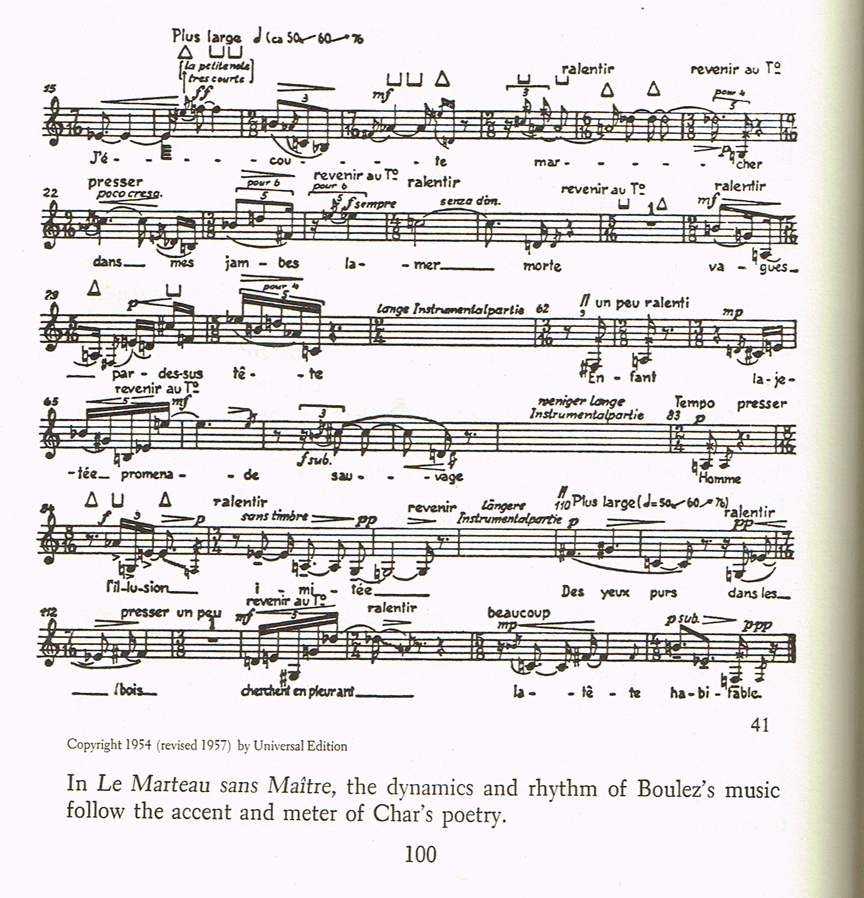
"For in contrast to Structures, what Boulez was concerned with in Marteau was the making of music, not system. Here Boulez introduces a soft resonance which displaces his earlier pointillistic style. Here Boulez exhibits a complete union of word and sound and does that despite the use of a poem in which each word has a weight and a meaning of its own. Here Boulez created a work of art notable for its delicacy of feeling, for its fineness of musical thought. But the wild, free spirit of the early days is gone. Neither "violent" or "brutal" appears in this score; there is little more aggressive than "moins lent" or "assez vite." The formidable inhibitions that gave birth to Structures, the annihilation of personality that that work suggests, has been transformed to far more artistic purposes in Marteau, but the essence of the inhibition remains intact. The personality of Webern has finally triumphed." - p 102
As I mentioned earlier, Le Marteau sans Maitre was the 1st Boulez piece I heard. I remember liking it & thinking that Boulez was a composer whose work I should listen to more of but not being as impressed by it as other things that I heard in 1974 such as John Cage's keyboard music & "Variations IV", Harry Partch's "Delusion of the Fury", Iannis Xenakis's electroacoustic music, Lukas Foss's "Baroque Variations", Robert Wyatt's "At the End of an Ear", The Fugs's "It Crawled into my Hand, Honest", & many, MANY other things that I won't continue to list here. & that's still the case to this day: Boulez, even though the works are strong, never quite makes work that stands above everything else around it - regardless of Boulez's seeming to think it does. That seems almost bizarre to me given how obviously labor-intensive the works are. I mean: all that work & they still fall flat for me?!
Peyser knows her contemporary music but maybe b/c I'm writing this review 42 yrs after she published the bk & I've had more time & resources available to me or maybe just b/c she wasn't as interested in some aspects of the avant-garde as I have been some of her statements cd use some scholarly qualifying:
"In reply to the criticism he received, Cage issued 4' and 33" (four minutes and thirty-three seconds). He says he had had the piece in mind since 1947 but did not believe it would be taken seriously then. "By 1952 it was necessary," he says."
[..]
"Surely this "work" represented no effort on Cage's part to revise or renew any work of the past. Surely it represented no effort on Cage's part to transform any aspect of his artistic inheritance. Rather was it a strong theatrical gesture designed to obliterate the past, to obliterate everything from Machaut through Boulez." - p 105
OK, I think the "Silent Sonata" is an important piece but it's hardly w/o precedent, contrary to common opinion, even among scholars. Here're 2 examples of earlier similar works:
Alphonse Alliais's "Funeral March for the Obsequies of a Large Deaf Man" (1884) - see the minutes to "mm 17" where this piece is discussed & a relevant image is shown: http://idioideo.pleintekst.nl/mmm017.html
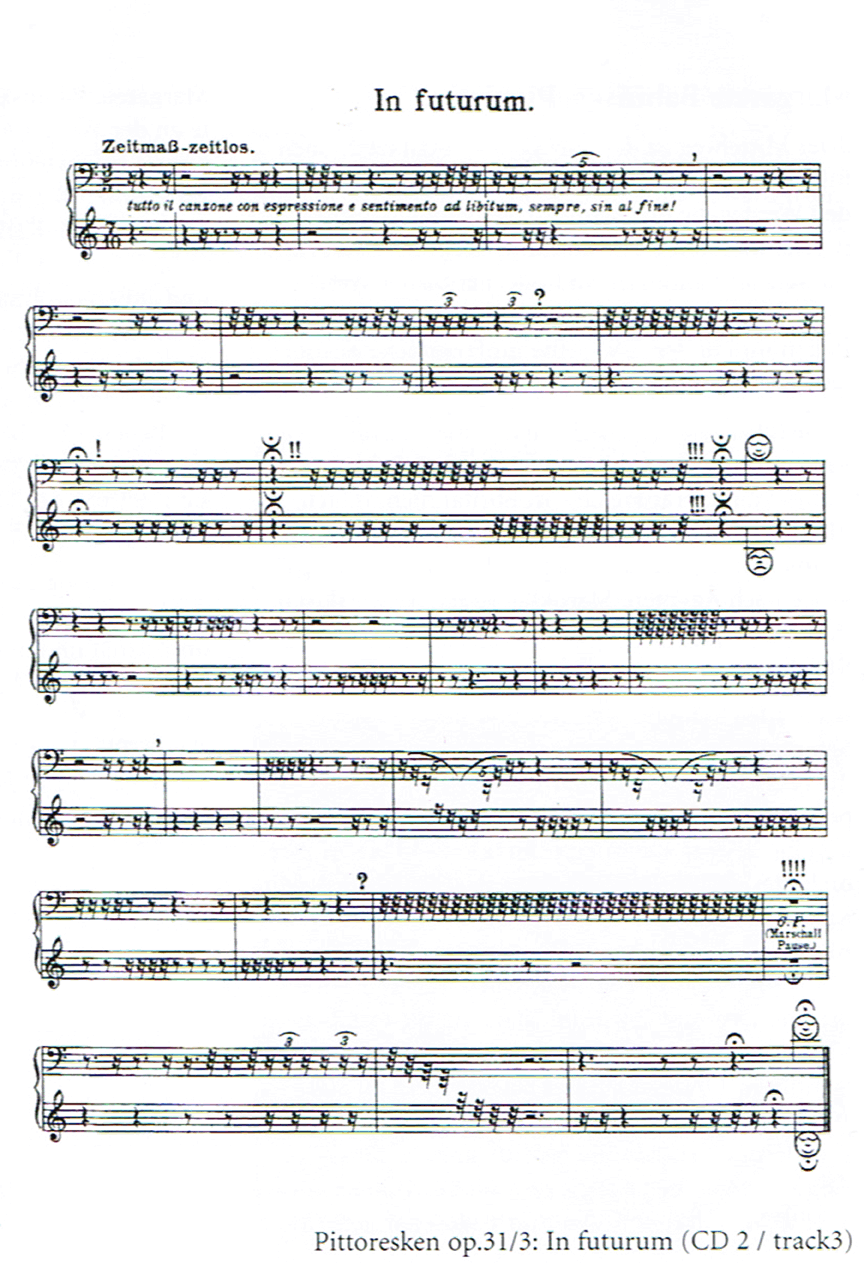
Erwin Schulhof's "Five Picturesques" Op. 31, mvmt 3: "In Futurum" (1919) - see my webpage re Schulhoff where I show the relevant score: http://idioideo.pleintekst.nl/Top100CSchulhoff.html
It's all too easy to imagine people now accepted as prominent composers & musicians as being respected in their day. Peyser gives us a good historical reminder of just how much the opposite can hold true:
"The first night out their ship rammed another. Tudor reports that Cage went "into a tizzy, screaming 'Save the scores!' " -they had manuscripts aboard of Boulez, Stockhausen, and several American colleagues. The scores as well as the passengers were saved, and they flew to Europe instead. Thus Cage and Tudor arrived ahead of schedule.
"Cage spent the additional time in Donaueschingen going over the program with Strobel. Unfortunately, according to Cage, Strobel demanded an audtion and hated everything he heard. "Strobel insisted that we cut the entire program down to only thirty minutes," Cage recalls. "Finally I agreed to do that, providing we could invite those in the audience to remain who wanted to hear the rest of what we had brought."" - p 106
"But other Europeans were not so hospitable. Everywhere Cage and Tudor went they were treated like a couple of clowns. At Donaueschingen the audience was angry and the press outraged. Complaints focused on the "noise." In describing the Cage-Tudor event to Boulez, Strobel characterized it as "poor Dada."" - p 107
Boulez often comes across in this bk as viciously competetive. Peyser does give us a glimpse of his 'nice guy side':
"In 1952 Desormière suffered a stroke that left him paralyzed. During that time Boulez sent scripts to the French Radio in Desormière's name in order that the conductor could collect the fees. He also escorted Desormière to musical events and social evenings-lifting him in and out of cars-to make his life as bearable as he could for the stricken man. This side of Boulez-and the Desormière situation is not exceptional-did not then, as it does now, reach the public eye. The public sees only the aggressive fighter." - p 116
Again, the personalities. I mentioned before that even though I have recordings of Paul Jacobs it's David Tudor that's tended to dominate my interest in avant-garde pianists. Stories like the following are definitely part of the reason why:
"Paul Jacobs has never played Boulez's Second Sonata; he says that he has never had the six months he feels the piece requires. Tudor, on the other hand, moved all the way to Boulez. Not only did he gain control over the notes but he felt he had to conquer the spirit as well. And so he went to the trouble of learning French in order to be able to read Char and Artaud, for he knew Boulez was reading them when he composed the work." - p 122
Such 'going that extra light yr' is characteristic of Tudor. I'm reminded of the story in Cage's "Indeterminacy" about the spices:
"Two wooden boxes containing Oriental spices and foodstuffs arrived from India. One was for David Tudor, the other for me. Each of us found, on opening the box, that the contents were all mixed up. The lids of the containers of spices had somehow come off. Plastic bags of dried beans and palm sugar had ripped open. The tin lids of cans of chili powder had come off. All of these things were mixed with each other and with the excelsior which had been put in the box to keep the containers in position. I put my box in a corner and simply tried to forget about it. David Tudor, on the other hand, set to work. Assembling bowls of various sizes, sieves of about eleven various-sized screens, a pair of tweezers, and a small knife, he began a process which lasted three days, at the end of which each spice was seperated from each other, each kind of bean from each other, and the palm sugar lumps had been scraped free of spice and excavations in them had removed embedded beans. He then called me up to say, "Whenever you want to get at that box of spices you have, let me know. I'll help you."" - http://davidtudor.org/Articles/cage.html
As much as I love Karlheinz Stockhausen's music in general his Klavierstücke I-XI have never done much for me. I have the scores for the 1st 4 & things about them seem 'impossible' to play regardless of how accomplished the pianist may be who's trying. Nonetheless, I take it that people do play them correctly. Even so, I wdn't even trust a computer to play them correctly because I'm not sure that any programmer has ever created an app capable of delving into such detail. As such, I'm not sure I think it's currently possible to even compare a recording of a human playing it to a recording of a computer playing it in order to look for mistakes.
[interpolation from my friend Ben Opie:
It definitely pushes up against human performance limits. You know the truly impossible measure? Look at the first page, last staff system, second measure in 5/4. There's a chord with a different dynamic level on nearly every note. This isn't humanly possible.
The overall tempo is pretty much determined by measure 6.
The work is laden with nested tuplets, or polyrhythms inside of polyrhythms. This is my explanation to my students: Take the first measure in 5/4, which would normally have 10 eighth notes. Now, squeeze in 11 instead. Of those 11, take the last five and squeeze in seven instead.
It's a ridiculous degree of polyrhythmic activity. Ultimately, what he's doing is redefining tempos for different areas of the piece. I talked about this with a particular composition student. He was sympathetic to Stockhausen, but we basically agreed that there might have been a more elegant solution to the issue of shifting tempos.
When I took the job at CMU, I was told I'd have to teach a Finale course in the spring. I thought I'd give myself something hard to do, so I laid out the first page of the Klavierstucke I. I've always loved its appearance, more than the actual work itself.
The Finale version I created plays the work correctly rhythmically. If I was to get serious about the dynamics, I'd probably export a MIDI version from Finale into a a sequencer, and fuss over the note velocities. The pedaling is an issue on playback too, which could probably fixed in the same way. If it was worth all the effort.]
I'm looking at the score to "Klavierstücke I" now. No doubt I'm a very bad person to try to analyze such a thing b/c my traditional score reading skills are so close to non-existent. Still, I'm looking at measure 48 & I see a division into treble & bass clefs in a meter of 2/8. OK. If I understand correctly, above the treble clef there's something indicating that the notes are organized in a triplet. That wd be simple enuf except that the opening designation in the treble clef is a 16th rest. That means the triplet starts off w/ silence. Right there, the difficulty escalates. The 1st note in the treble clef after the rest is a dotted 16th D4 (i.e.: the D immediately above Middle C) played forte followed by two 2 note chords in a quintuplet that start off ff & go to forte. The 2nd of these two 2 notes is made of dotted 16th notes again. This is followed by another sequence of two notes the 1st of wch is an Ab7 (i.e. almost 4 octaves above Middle C) played fff followed by a G natural played pp. These 2 notes are joined in a quintuplet. That's not even getting into the bass clef. All tolled, there're 3 quintuplets in the triplet. Similar dynamics changes happen in the bass clef. The tempo is "As fast as possible."
I have recordings of at least 2 pianists playing this piece. One by Aloys Kontarsky & one by Herbert Henck. The Kontarsky is 2:55 & the more recent Henck is 4:01. Given that the piece is only 63 measures that means that Kontarsky's "As fast as possible" was 175 ÷ 63 = 2.777777777777778 seconds per measure. Henck's wd be 241 ÷ 63 = 3.825396825396825 seconds per measure.
NOW, let's see what that means in terms of the note divisions described above. Let's make it 'easy' on ourselves & round Henck's time up to 4 seconds per measure. If the overall 2/8 measure is a triplet that means that three '8th' notes wd be played in the time of two 8th notes. That means that an 8th note = 2/3rds of an 8th note. The note divisions used in the treble & bass clef of measure 48 are:
a dotted 16th note = 3/32nds in a measure of 8/32nds X 2/3rds = 3/8 X 2/3 X 4 = Wow! a whopping second in wch the note's to be played. That's not really so bad. But, I haven't even gotten to the quintuplet aspect yet.
The longest note is an 8th note, the shortest is a 32nd. An 8th note wd be 1/2 of 4 seconds if it weren't complicated by the triplet divided into 3 quintuplets.
an 8th note in a triplet in 2/8 = 1/2 X 2/3 = (roughly) a division of a 4 second measure of 1.333 seconds.
a 32nd note in a triplet in 2/8 = 1/8 X 2/3 = (roughly) a division of a 4 second measure of 0.333 seconds. Think you can accurately count off 0.333 seconds in relation to 1.333 seconds in relation to 1 second?! Even that's not really so bad.
But, HEY!, it's not as simple as that. The measure is further divided into three quintuplets. If I understand correctly (doubtful), that means that a 32nd note = 1/5th of an 8th note instead of 1/4 of it that's actually 2/3rds of a non-triplet 8th note. Got that? If there wd ordinarily be eight 32nd notes in a 2/8 measure, there are now 15.
THAT means that:
an 8th note is still 2/3 of 4 seconds = 1.333 seconds but a 32nd note is 1/5 of that = 0.2666.
That means that a dotted 16th note is now 3 X 0.2666 = 0.7999 seconds.
That applied to measure 48 means that:
Right hand plays a rest of 0.5333 seconds followed by a D4 of 0.7999 seconds tied to a 2 note chord of 0.5333 seconds tied to a 2 note chord of 0.7999 seconds tied to a single note of 0.2666 seconds tied to a single note of 1.333 seconds.
Simultaneously, the left hand plays a single note that's 0.5333 seconds tied to another single note that's 0.7999 seconds tied to a single note that's 1.333 seconds tied to another single note that's 1.333 seconds.
Looked at that way it's almost swinging.. & almost 'easy'.. uh.. except for the 4 different dynamics marking for the right hand & the 3 different dynamics markings for the left hand. STILL, the pp of the left hand's opening 0.5333 seconds is simultaneous w/ a silence for the same duration in the right hand. That makes it 'easier'. THEN the left & the right hands both have notes that're 0.7999 seconds long & forte. Ok, it gets alittle more complicated after that b/c the right hand has to play 1st a double forte note followed by a forte note in the same time as just one forte note in the left hand. THEN the right hand plays a triple forte note followed quickly by a triple forte note in the left hand followed by a pp note in the right hand. There's also pedaling throughout this measure so that helps the painist cover over mistakes.
The point of all that analysis is to explain why many people claim that such Serialist pieces indicate what's to be striven for rather than what can actually be played. The same thing is sd about Franz Kamin's music & about Brian Ferneyhough's music, etc. I'm not sure that I buy that argument since I think the above is actually 'playable' by somebody if one allows a tolerance for timing insconsistencies of, say, .1333 seconds. After all, there are some amazing pianists out there.
[interpolation from my friend Ben Opie:
I'm told in Ferneyhough's case, he knows the stuff is impossible to play. He wants excellent performance of course, but it's the struggle he's interested in. I know of other composers who write *hard* music, and they expect it to be played absolutely correctly.
But that leads me to question, is there ever a truly "perfect" performance? Even of someone such as Haydn?]
NOW, onto Peyser's writing about "Klavierstücke XI":
"As for the external form, Stockhausen's score consists of one large sheet of paper. The pianist sees the whole work without having to turn a page. On this sheet there are sixteen unnumbered groups of music. The performer starts with the one he sees first and plays it exactly as he wants to: loud, soft. staccato, et cetera. Then he reads the dynamics at the end of the section and applies it to the next group on which his eye lights. If his eye moves to a group he has already played, then he plays it again, for the possibilities of varying the material are so great that it should be virtually impossible to play the same group in the same way. If, when he feels he has finished the piece, he discovers that he has left a group out, he knows he can still play it." - pp 124-125
By Klavierstüke IX, X, & XI I find them much more interesting to listen to. The through notation has given way to performer variables. However, how variable these variables really were is called into question:
"Tudor played the Klavierstüke XI at the scheduled concert in New York. But when it was time for him to go to Darmstadt, he experienced a "tightening of the hand and arm muscles" in addition to a kidney infection and cancelled his trip less than two weeks in advance. Tudor admits to deep disenchantment with the work. "I had the impression," Tudor reports, "when Stockhausne was talking to me about the piece that it would be much freer than it turned out to be. I remember my shock when I found the rhythmic values notated. How frantically I tried to get out of the four walls that the piece represented to me."" - p 125
So, instead, Paul Jacobs was recruited to perform it w/ very little notice & he gave the 1st European performance. "No aesthetic commitment interfered here; the muscles did exactly what they were told to do." (p 125) I'd love to hear a recording of Jacobs playing it. Instead I have recordings by Aloys Kontarsky, Herbert Henck, & Marie-Françoise Bucquet. Peyser recounts the following about the latter:
"After an expensive publicity campaign, the French pianist Marie-Françoise Bucquet offered four concerts of twentieth-century music at Alice Tully Hall with a top ticket price of $3. The first two concerts were sold out and Mlle Bucquet received not only standing ovations from the public but rave reviews from the critics who specialize in new music. It was only after Paul Jacobs informed those critics and a number of other journalists as well, several of whom printed what Jacobs said, that Shcoenberg's Opus 11 was "unrecognizable" and that Opus 23 "contained about ten percent of the right notes" that Mlle Bucquet's third and fourth concerts were marred not only by a plethora of empty seats but also by harsh criticism from the press." - p 246
SO, what does that tell us? That Bucquet was sloppy? That the critics's initial reaction was wrong? Was Jacobs telling the truth? It seems to me that "ten percent of the right notes" wd have to be a rather hateful exaggeration. At any rate, I wdn't know. I just wish I had a recording of Jacobs playing Klavierstüke XI so that I cd compare it to Bucquet's playing of the same. Then I cd decide wch version I like best w/o knowing wch was the most accurate. My friend Ben Opie & I listened to recordings of Xiaoxing Geng & Aloys Kontarsky & David Burge playing Stockhausen's Klavierstüke VIII & compared them . There's a movie of that here: https://archive.org/details/mm66PresentsPIANO but you'll have to go thru alot to find the relevant section. As I recall, the most striking differences we noticed were in tempo: Burge: fastest; Kontarsky: a little slower; Geng: slowest.
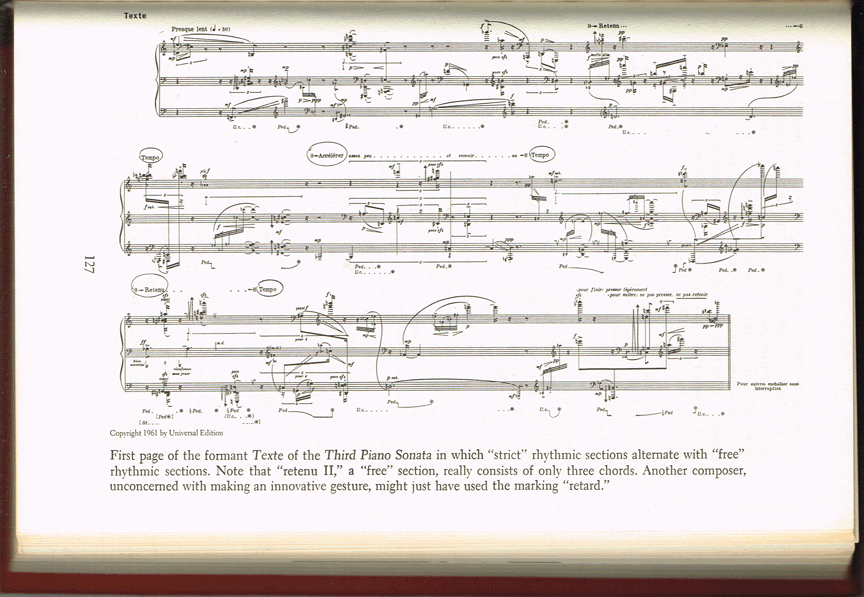
Jacobs's opinions continue to be interesting. Here, he's commenting on Boulez's 3rd piano sonata:
"["]What he does concern himself with is the exploitation of harmonics, with scrupulous instructions for the pedaling: one-half pedal for sixteenth notes, a full pedal for eighth notes. It's subtlety carried to absurdity."" - p 128
Is it really so absurd? I find degrees of pedal compression to be interesting & I think it's great that Boulez specifies them. There's definitely an important difference between a sustain pedal fully depressed & one half-depressed. This is mentioned again:
"The precise instructions for pedaling (exactly how high to raise the pedal)" [in the "Third Piano Soanata"] "are consistent with the tiny gradations in dynamics that can be seen from the enclosed sheet of Structures, Book II." - p 158
I use the term "aleatoric" in relation to my own projects in the sense of 'game-based' rather than 'chance'. According to Peyser, this usage in relation to music originated w/ Boulez:
"Boulez wrote an essay he entitled "Alea" for the Nouvelle Revue Française. It appeared in November 1957. In the first two paragraphs he attacked free-floating chance in his most violent, polemical way."
[..]
"Cage was enraged. He says, "After having repeatedly claimed that one could not do what I set out to do, Boulez discovered the Mallarmé Livre. It was a chance operation down to the last detail. With me the principle had to be rejected outright; with Mallarmé it suddenly became acceptable to him. Now Boulez was promoting chance, only it had to be his kind of chance."
"Cage still feels a sense of rage today. For, from the time of Boulez's famous essay, chance music has been widely known as "aleatory music." Cage still rejects this title. The most intolerable insult of all was that it was Boulez's erudite word with its esoteric roots (alea are dice) that gave Cage's fresh invention its quasi-official new name." - p 129
Ha ha! I love Cage's music much more than Boulez's but I still prefer the term "aleatoric". Boulez seems to be always trying to define himself as 'cutting edge' when he's really lagginf behind & he does it at the expense of the real innovators. That doesn't make his music uninteresting to me. Maybe it just makes me glad I never met him personally b/c I might've found him insufferable & that might've spoiled the listening.
Peyser does a wonderful job of putting Boulez into the context of contemporaneous other innovative composers. If this were only about Boulez. detached from a wider perspective, it might not've been so interesting to me.
"Able to work on several pieces at one time, Stockhausen began, in 1955, to develop ideas and materials for Gruppen, that aggressive large-scale work which, according to his own published notes, "initiated the spaital deployment of instrumental music." (The "spaital deployment of instrumental music" was, in fact, initiated by Giovanni Gabrieli and Berlioz a good while before, and used again more recently by the American composer Henry Brant. Indeed, composers who visited Stockhausen while he was at work on Gruppen report that an American Composer's Alliance Bulletin (1955: volume 4, no. 3) contained Brant's article "The Uses of Antiphonal Distribution and Polyphony of Tempi in Composing" was invariably open on Stockhausen's desk; Brant's own first "music-in-space" work was then two years old. In Gruppen three orchestras surround the listener." - p 132
Peyser is excellent at providing actual scholarly examples. I've never heard of Giovanni Gabrieli (or maybe I just know of him as "Gabrieli") & didn't know of his & Berlioz's spatial aspects. To those 2 & Brant I'd add Charles Ives's father George Ives:
"He was intrigued by musical happenstance, welcoming and examining the peculiarities of accidental rhythmic and tonal collision, as when two children played finger exercises in two different keys in adjacent houses, or when a passer-by whistled down the street while his wife, Mary Ives, sang a hymn in the kitchen-all audible to George Ives, standing between them, and interesting. Some such collisions he later arranged himself, as will be seen." - p 11, Henry & Sidney Cowell's Charles Ives and his Music (1955), Oxford University Press
"On certain national holidays, such as Washington's Birthday or the Fourth of July, it was usual for several bands from the country near by to join under George Ives's leadership in Danbury, and he would sometimes try breaking them up into sections that were stationed about, one perhaps up in the church steeple, another on the roof of the Danbury News Building on Main Street, and a third on the village green. Each section would play, in turn, a variation on Greenland's Icy Mountains or Jerusalem the Golden specially composed for it." - p 21, Henry & Sidney Cowell's Charles Ives and his Music (1955), Oxford University Press
Charles Ives, too, explored this spatial element:
"He also applied the idea of spearating groups of players in some of his orchestral music. In the Fourth Symphony, for example, the matter of relative intensities requires, to Ives's mind, that members of the various instrumental sections be placed on different parts of the stage, and even in the auditorium, to control the distance the sound travels from the sounding body to the listening ear. This is for the sake of variety in intensity, since the effect of tones played loudly at a distance is very different from the same tones played soctly close at hand." - p 21, Henry & Sidney Cowell's Charles Ives and his Music (1955), Oxford University Press
There are more examples but those 3 shd suffice. Ives's wonderful "Fourth Symphony" is from 1910-24 but didn't get its 1st performance until 1965 so it's probable that Stockhausen might not've known about it yet in 1955. Nonetheless, the point is obvious: Stockhausen wasn't the 1st. In fact, I find George Ives's experimentaion w/ marching bands more interesting than Gruppen anyway.
Peyser communicates very well, hopefully accurately, the ego battles that happen in the avant-garde classical world: "Even John Cage, who professes to be unconcerned about matters of prestige, concedes that he was enraged when in his sixtieth year Feldman manipulated him into a position where he was the pianist for Feldman's work in Germany." (p 136) As w/ any other info, my sense of how accurate something is is determined by whatever input I've had that's relevant to it. Peyser seems consistently accurate.
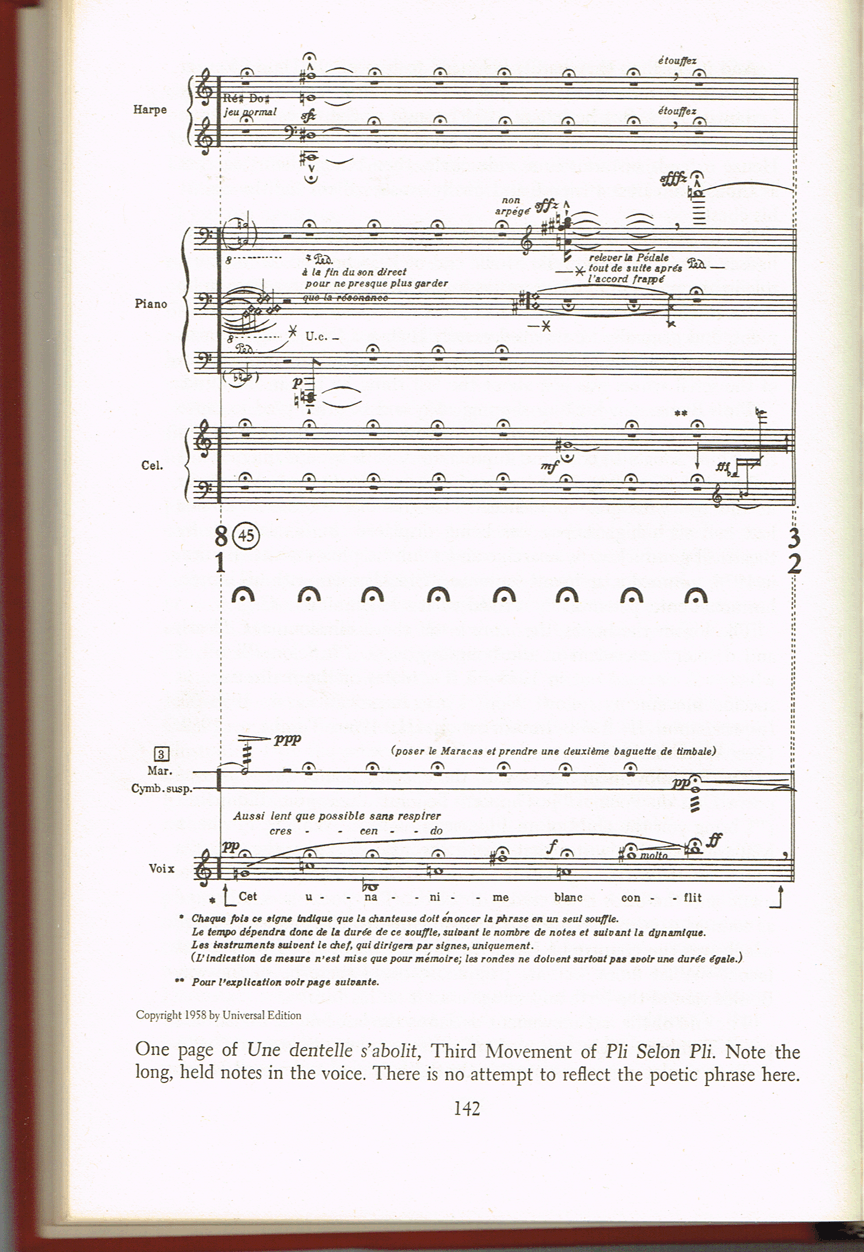
"Boulez adds that after 1955, when he visited Baden-Baden regularly, he had the opportunity to watch Rosbaud and pick up some details, "particularly Rosbaud's patience with the musicians when they make mistakes. If musicians make mistakes, it is not because they want to make mistakes, but because there is something they do not understand and it is up to the conductor to help them. How can I describe my development as a conductor? I always had a good ear, could catch mistakes and correct them. But it is true that I gradually became more sensitive to stylistic matters, to phrasing, tempo, balance, timbre, color, and all the rest."" - p 146
"But at the beginning his aim was more modest. Lawrence Morton says: "Boulez told me long ago how concerned he was about the poor performances he heard in his young professional days of the Viennese, Bartók, Stravinsky, etc. How could conductors ever be expected to do his own music decently if they still didn't know how to conduct the classics of the twentieth century? And I remember my first visit to Cleveland in the late 1960s: he commented then that even at this late date he had found errors in Debussy scores that had so far escaped conductors everywhere. So the first impulse towards professional conducting was stimulated by the need for accuracy in the twentieth-century classics.["]" - p 168
"In those years he concentrated on his conducting technique, avoiding the baton which he calls a "crochet de manchot [the one-armed man's hook] that keeps you from expressing yourself with your fingers." Boulez's use of his fingers and thumb in conducting as against his arms and body in conducting seems analagous to his use of tiny gradations in dynamics and durations as against big structure in his own music. Boulez has a marvelous ear, a remarkable sense of rhythmic exactitude. But what separates him frm the other major conductors is the precision of his digital gestures, immeasurably useful in the intricate twentieth-century scores he loves. Boulez indicates time and rhythm with the forefinger and thumb of his right hand. The left is rarely used to imitate the right. It is as though the "ethics" that legislates against the repetition of a "theme" in composition also legislates against the left hand imitating the right. Instead he raises or lowers the left hand steadily with his fingers extended rigidly to indicate an increase or decrease in volume." - p 169
"Above all, he works for correct intonation. During the course of an orchestral passage, Boulez stops: "Third trumpet, your E flat is too sharp." Then he thrusts his right arm out in front of him and brings down his thumb, ever so slowly, until the instrument has the exact pitch. To close the issue, he whistles it. The performance that results is crystal clear." - p 193
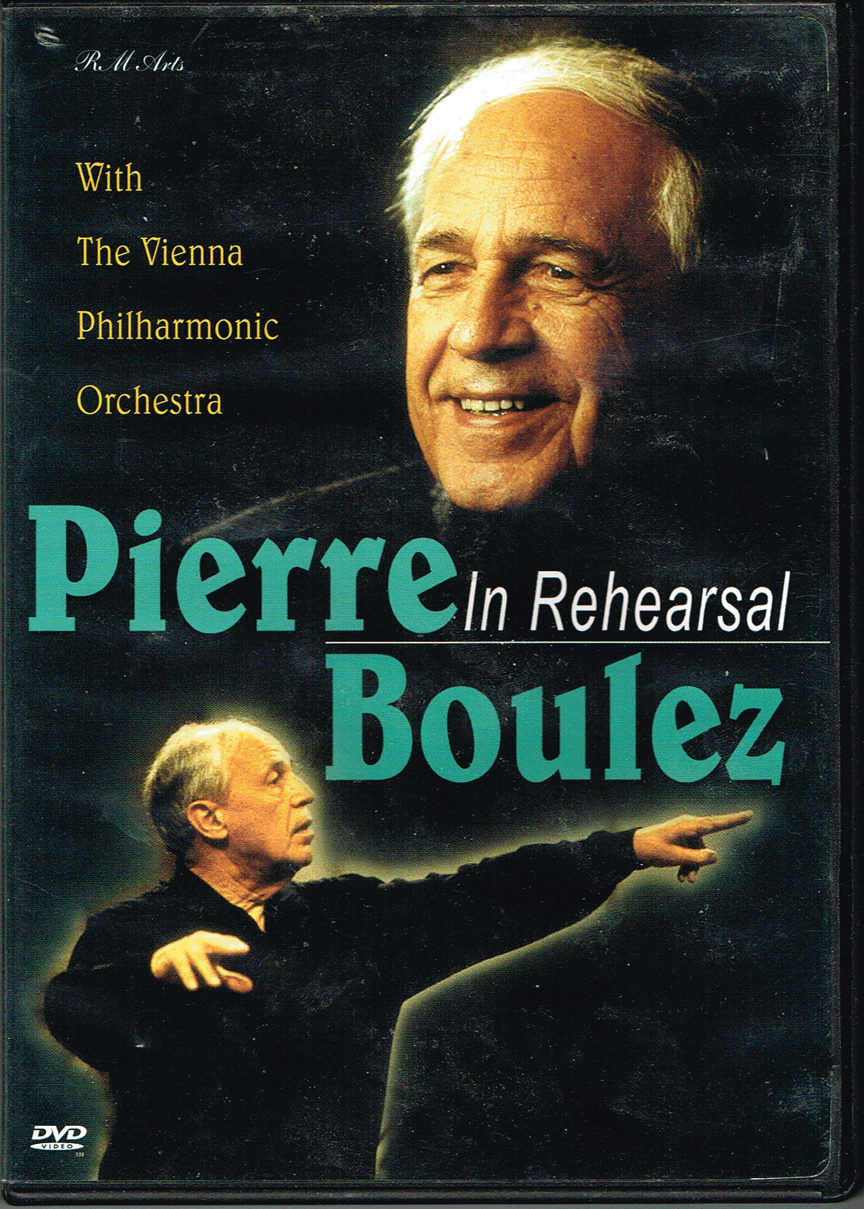
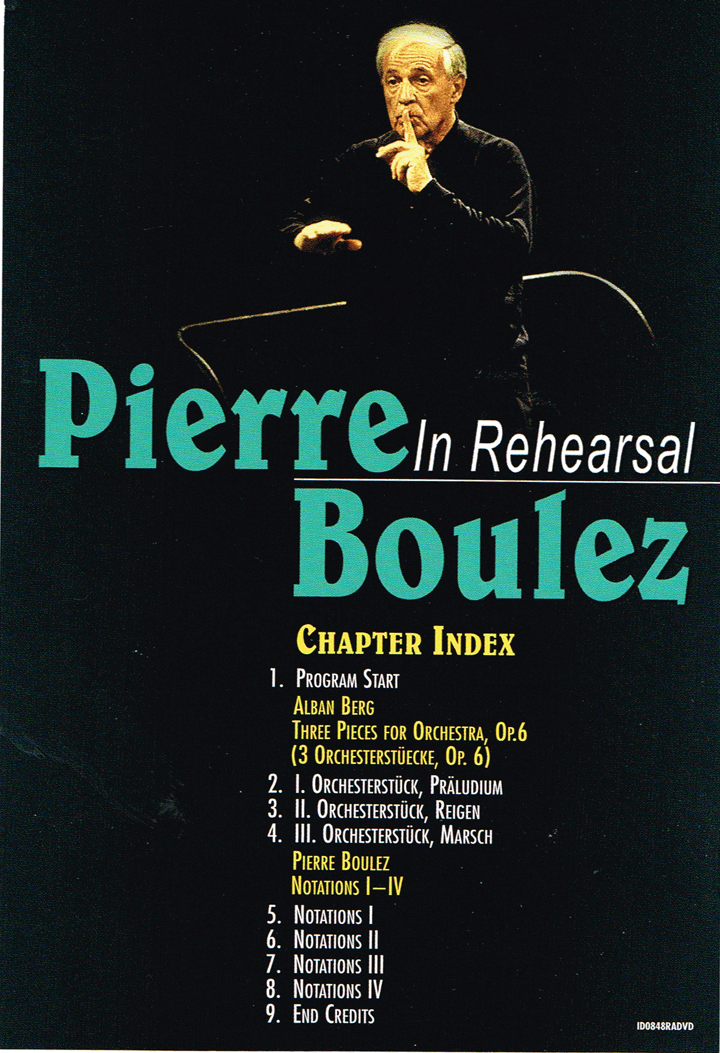
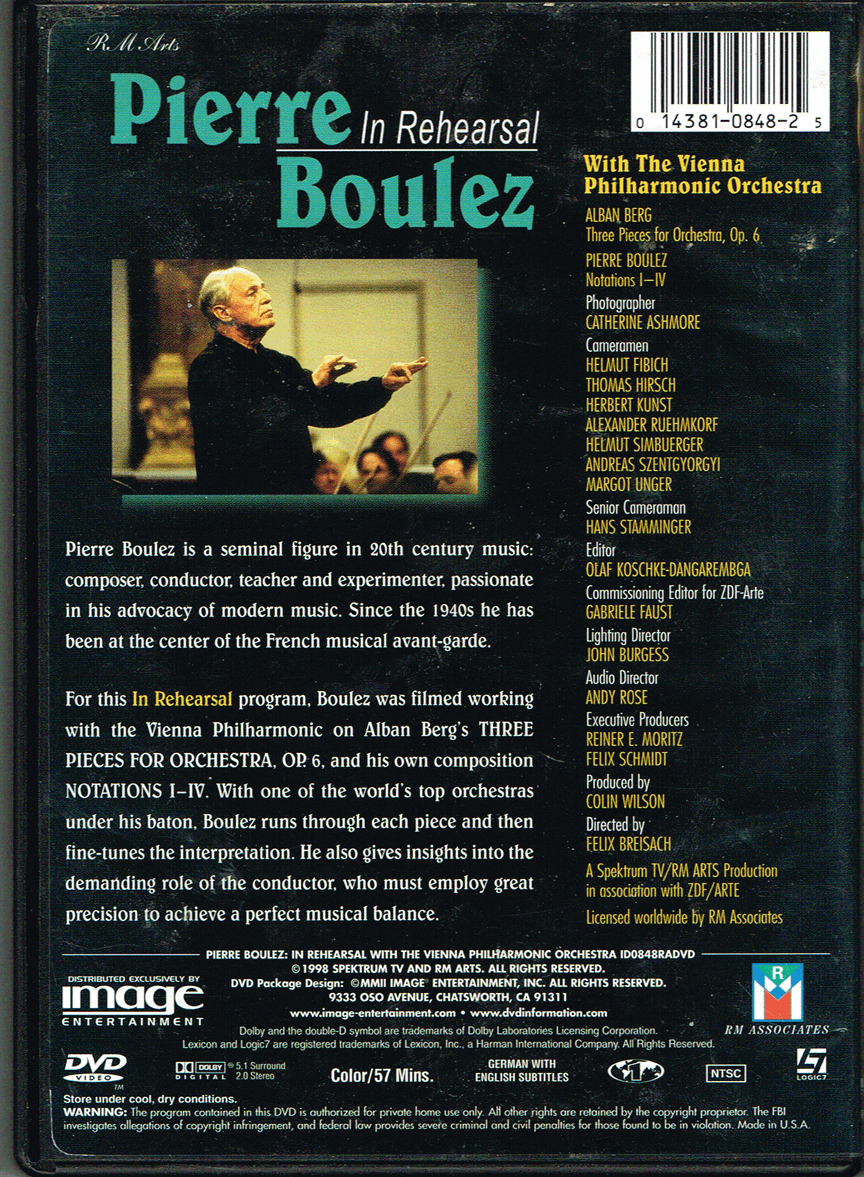
I recently witnessed a DVD of Boulez conducting the Vienna Philharmonic Orchestra. The two pieces being rehearsed were Alban Berg's "Three Pieces for Orchestra", Op. 6; & Boulez's "Notations I-IV". I can unabashedly say that I was very impressed by Boulez's conducting for precisely the qualities gone into above. His accuracy of hearing was mind-blowing. His patience in correcting was also mind-blowing. One thing that's strange about the movie is that there was a young trumpeter who almost seemed cast to be the buffoon. Not only is he singled out for correction fairly often but he's shown joking w/ the adjacent musicians as if he's a high schooler who just can't control his ebulliance & has trouble paying attention. He's such a perfect 'bad example' that it seems staged.
"Mme Sacher asked Boulez for s sheet of his manuscript. On receiving it she pressed him to accept a fee; when he refused, she gave him a Karmann Ghia instead." pp 146-147
That happened to me once too. Unfortunately, the car was stolen & had been used in a murder & I got se(n)t up.
Just kidding.
Boulez criticizes graphic notation: ""This mania for graphics can lead to illiteracy." (The use of graphs in place of notes will lead to a situation in which no one can read scores.)" (p 149) Fair enuf - but the scores are still scores, even if they don't use traditional notation, so, therefore, not fair enuf.
Boulez is definitely attached to being the maestro, the head of a hierarchy. At least he worked hard for it:
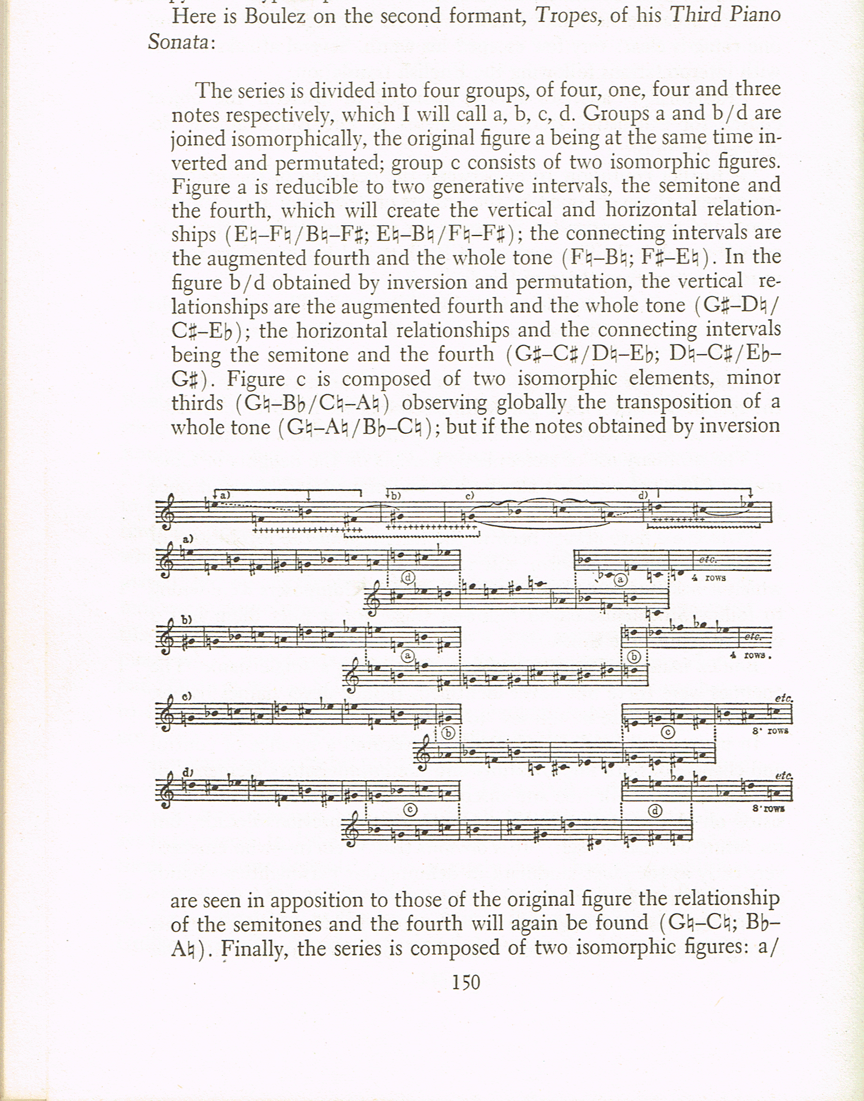
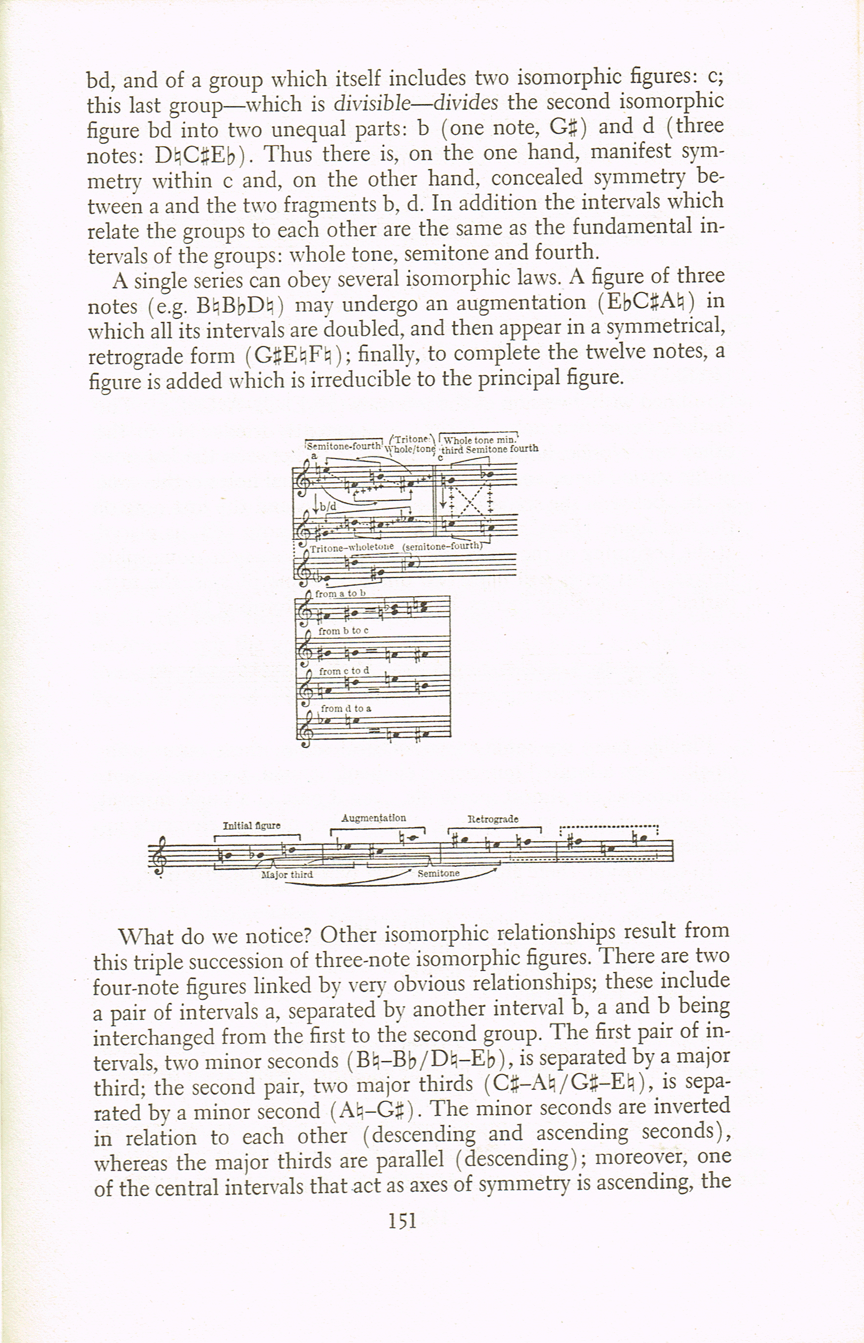
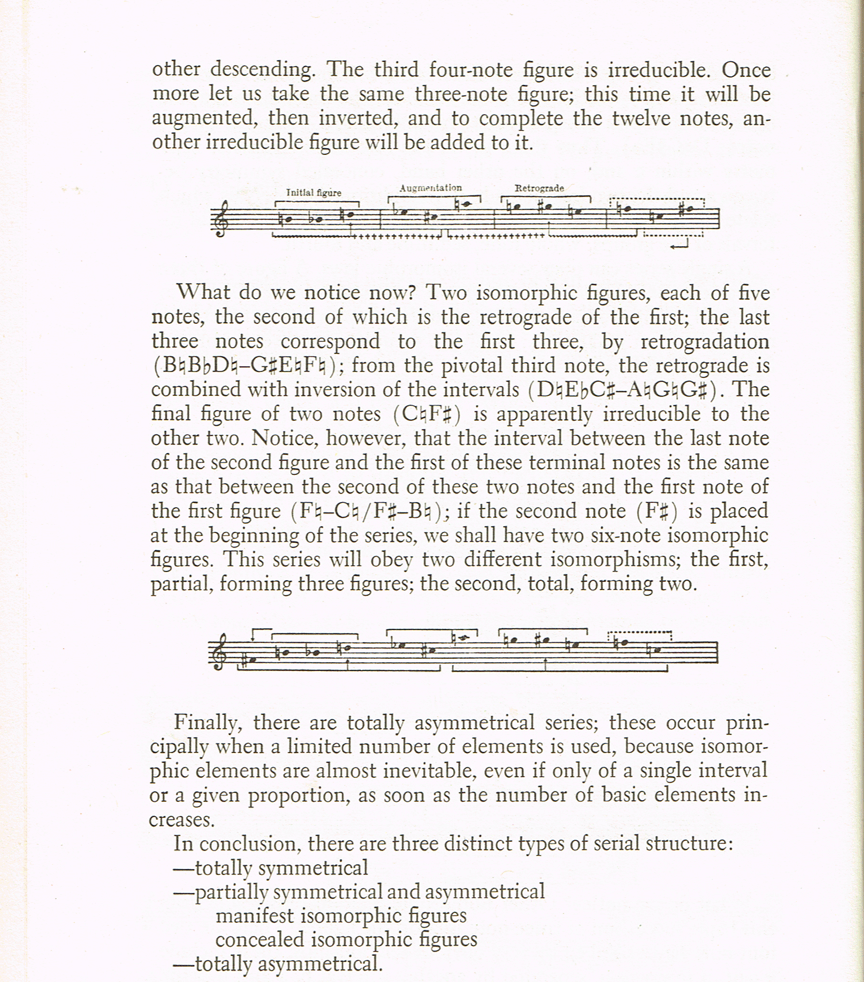
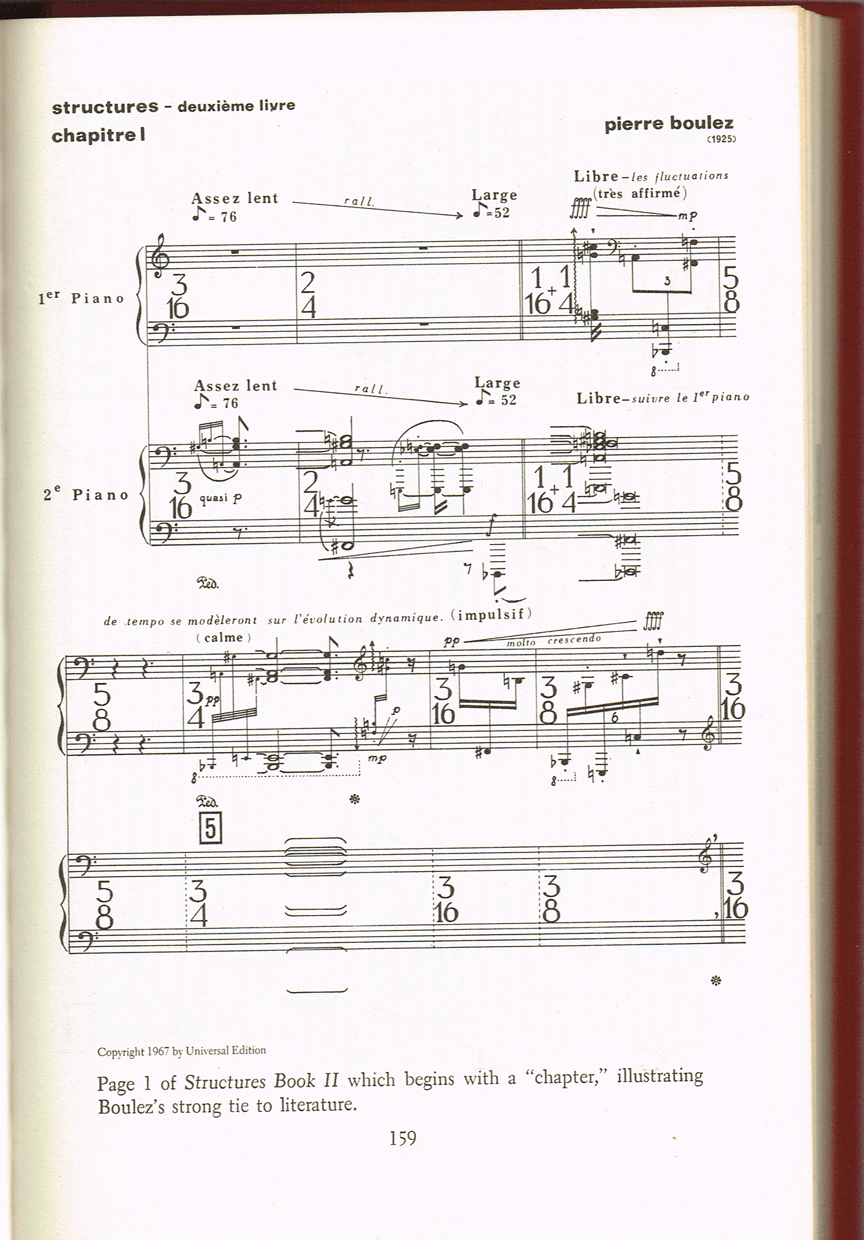
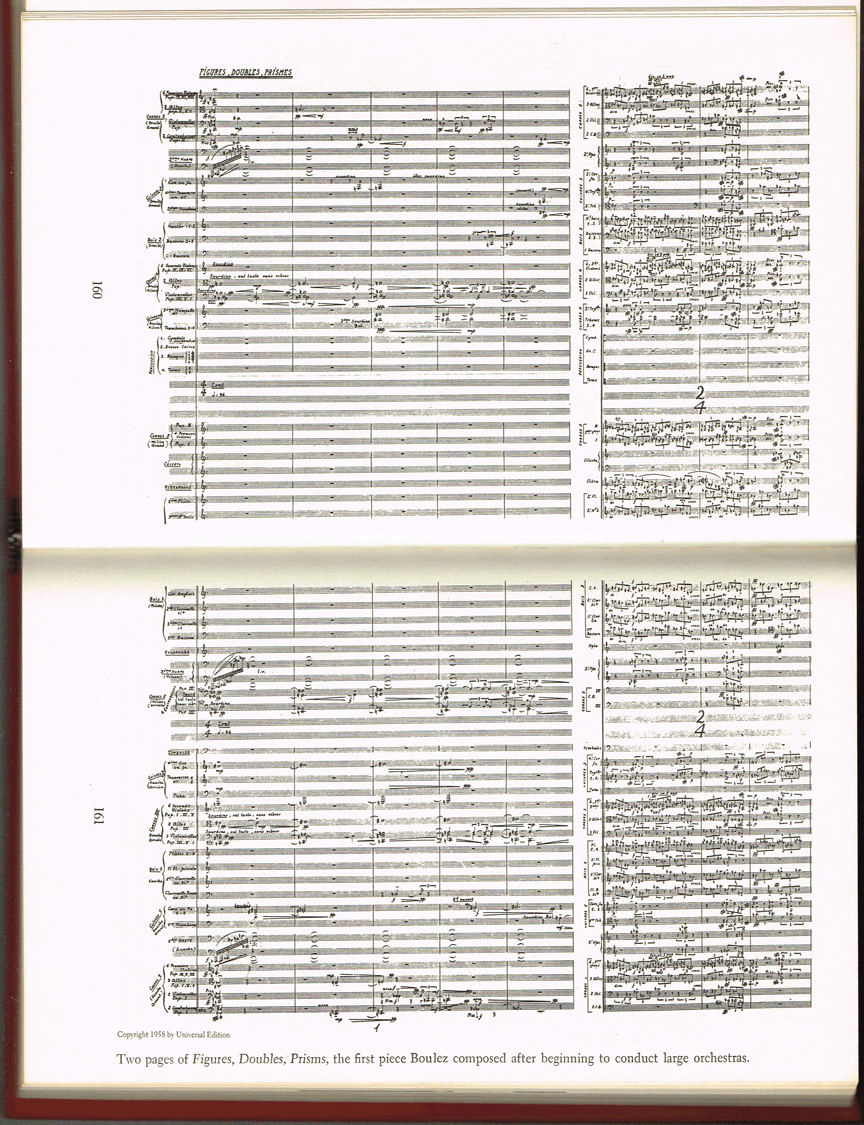
"Obviously still inspired by Mallarmé's Le Livre, Boulez attempted, in his own words, "to break completely the closed form." But he refused to share the responsibility with the performer. In a 1964 interview in The Times of London, Boulez deprecated the performer's ability to participate in the creative process. "I have no confidence in the imagination of performers," he said. "The performer's head is full of formulas drawn from the music he plays. If he had the necessary invention, he would be a composer himself." - p 162
SOOOOOO.. what about the performers who are also composers? Take, e.g., trombonist/composer Vinko Globokar: refer to his record on Deutsche Grammophon's "avant garde" imprint in wch he performs his own "Discours II pour cinq trombones" (1967/68) & a work by Berio & a work by Stockhausen. He wanted co-composer credit on a performance of Stockhausen's "Aufwärts" & Stockhausen was against this so Globokar. chose to be listed on the record as "Anonym". I have mixed feelings about this. On the one hand, I think that the composer deserves credit for initiating the process but I think the performers, depending upon the degree of their creative input - wch is considerable in the case of "Aufwärts" - deserves to be given substantial credit too. Hence my preference for the term "realization" rather than just "performance" in the case of works where the performers are major contributors. More about Stockhausen:
"Once a devout Catholic, Stockhausen dropped his ties to structure and God at the same time. He left his wife and their four children and married a painter and produced more progeny. Then he built a splendid house in the suburbs of Cologne and expected both women and all the children to live with him." - p 166
Ignoring the impractical megalomania of expecting everyone to live together as one big happy family I have to wonder about the "he built a splendid house" part of the above. Maybe HE built it - but it seems more likely that he had some design ideas & pd someone else to build it for him. Rich people have a tendency to take credit for things that they pay other people to do for them. I hate that. I esp hate it when it's something creative. I call the results "Employer Art". The attitude of rich people often seems to be that people who can actually do physical things are beneath notice, certainly beneath getting credit. I cd say more, MUCH MORE, but I'll move on.
Simultaneous w/ writing this review, I've been pulling together all the Boulez recordings I have, both as composer & conductor, & organizing them for creating a series of chronological retrospective tapes. It's been fun to see what his conducting repertoire has been & wch orchestras he's recorded w/. I have recordings of him w/:
Cleveland Orchestra performing:
Debussy's "Nocturnes-Nuages"
Messiaen's "Chronochromie-Antistrophe I"
Ensemble Intercontemporain performing:
Schoenberg's "Lied der Waltaube (from "Gurrelider")"
Schoenberg's "Chamber Symphony No. 1. Op. 9"
Webern's "Vier Lieder"
Schoenberg's "Serenade, Op. 24"
Schoenberg's "Ode to Napoleon Bonaparte, Op. 41"
Ligeti's "Concerto for Piano and Orchestra"
Ligeti's "Concerto for Violoncello and Orchestra"
Dufourt's "Antiphysis"
Grisey's "Modulations"
Birtwistle's "...agm..."
Kurtág's "Messages de Feu Demoiselle R.V. Troussova"
Zappa's "The Perfect Stranger"
Zappa's "Naval Aviation in Art?"
Zappa's "Dupree's Paradise"
Ligeti's "Concerto for Violin and Orchestra"
Vienna Philharmonic Orchestra performing:
Mahler's "Symphony No. 6-Allegro ma non troppo. Heftig, aber markig (excerpt)"
Berlin Philharmonic Orchestra performing:
Ravel's "Une barque sur l'océan"
Chicago Symphony Orchestra performing:
Schoenberg's "Pelleas und Melisande, Symphonic Poem Op. 5"
Stravinsky's "Fireworks"
Bartok's "Orchestral Pieces. Op. 12-Scherzo"
Schoenberg's "Variations Op. 31"
& the BBC Symphony Orchestra performing:
Schoenberg's "Five Pieces for Orchestra, Op. 16"
Schoenberg's "Variations for Orchestra, Op. 31"
Schoenberg's "Begleitmusik zu einer Lichtspielszene, Op. 34"
Schoenberg's "Die Jakobsleiter" (Fragment)
Schoenberg's "A Survivor from Warsaw, Op. 46"
"Glock invited Boulez to be guest conductor of the BBC in 1964. "Boulez brought a tiny list," Glock recalls, "not more than twenty works. We gave a whole series in Festival Hall of twentieth-century programs. I was tremendously impressed by the way Boulez rehearsed. The concerts were so fresh, so entirely new for everyone. Many people wrote and told me that. He gave the orchestra a beautiful sound, not velvety, but delicate and disciplined."" - p 171
Peyser is somewhat undiplomatic in her presentation of Boulez's vitriolic nature. She discusses his reaction to American composers & American new music in general:
"When I mentioned an American composer whose work he dislikes, Boulez suddenly came to life, launching a virtuoso attack on various facets of U.S. music.
"Electronic music: "The same frenzy for technology began in Europe about 1953. By 1958 it had all died down. The idea of electronics as the big future of music is just an American trick of fashion. Next year they'll discover the viola da gamba. Playing Bach on the computer doesn't interest me at all because it's artistically irrelevant. All this indicates a simplistic way of thinking-an appalling low level of thinking."
"As for "Perspectives of New Music," an avant-garde journal published by the Princeton University Press: "'Perspectives' is similar to 'Die Reihe,' begun in Germany about 1953. Its writers think they are great scientists. They are not.["]" - p 181
Whew! If those are real quotes, Boulez was suffering from diarrhea-of-the-mouth - or his listener(s) were suffering from having to listen to it. Boulez displays the same type of behaviors over & over: he disses other people's work & then imitates it later as if the way he's doing it is the 'right' way & the other people can be dismissed as imbeciles. He did it w/ chance music, here he's doing it w/ electronics - something he clearly knows next-to-nothing about. Then he cofounds IRCAM wch is supposed to link music w/ science & technology & wch gets millions for this purpose ? after dissing Americans for linking music w/ science & technology. The dating of European electronic music as from 1953-1958 is just ludicrous. His apparent purpose is to say that Americans are Johnny-come-latelies when, in fact, the Teleharmonium was invented by an American, Thaddeus Cahill, in the 19th century. To then act like one single acoustic instrument wd faddishly replace an entire resource is ridiculous. That's like saying: "Oh they're all about drinking fluids, those inferiors, the next thing you know they'll be discovering orange juice & forget fluids in general.' THEN he mentions playing "Bach on the computer", wch also doesn't interest me, but is probably a reference to Walter Carlos's "The Well-Tempered Synthesizer" wch is hardly representative of all that was going on in electronic music in America at the time.
As for "All this indicates a simplistic way of thinking-an appalling low level of thinking.": I completely agree - but it's Boulez who's displaying it. It's actually pretty amazing that someone in such a prominent position culturally cd say things that're so stupid. He died in 2016 but this belligerent aspect of his personality reminds me of a certain "Rump" who's attained prominence in the US, presumably thru all manners of pay-offs to Russian hackers & electoral college money-palmers. Boulez goes on to dig his intellectual grave even deeper:
"["]The Americans do operate under a severe handicap, of course; they have no strong personalities in the field. If they were strong enough to establish their personality on the world, they would see that no national favoritism exists.
""After World War II, Europeans were thirsty for all America's creative products-Faulkner, Cummings, Jackson Pollock. Europeans bought, almost without discrimination, anything Steinbeck or Dos Passos wrote. But for an American artist to be exported to Germany he has to be better than the German product. They have no one in America as good as Hans Werner Henze, and that is not setting your sights very high. A composer of the stature of Stockhausen they have not."" - p 182
Amazing. It's almost as if he's playing a game of how-many-insulting-inaccuracies-can-I-slip-into-one-short-statement? If I understand correctly, this interview was conducted in 1969. There's so much to address in the above that it's hard to begin. There were many great composer in Germany post-WWII, probably most, or all, of them that Boulez wd refer to were in West Germany. West Germany's culture was heavily influenced by the occupying US military who were making sure that non-nazi culture wd thrive. Henze & Stockhausen were both West Germans when that division existed. It's unlikely that they wd've thrived under Soviet influence. I like Henze's music & I love Stockhausen's. Still, I don't think that a hierarchy is as clear as Boulez is stating. Composers are different from each other & those differences are what maks them interesting. We're not talking about something as quantifiable as whether someone ran a mile in record-breaking time in the Olympics.
IMO, "strong personalities" in new music in the US leading up to 1969 wd be the people I've already listed above. To dismiss these people is like dismissing a whole culture - wch seems to be Boulez's purpose. Hence, yes, Boulez is displaying "national favoritism". Even the writers & painters he picked are weird for various reasons: Faulkner, Steinbeck, & Dos Passos are all writers that I like but I don't consider any of them to be particularly avant-garde so they're not correlatives of new music composers. Someone like William S. Burroughs, who lived in Paris but was still very American, might've been more appropriate. It's well-known that Jackson Pollock & other abstract expressionists were pushed by the CIA as a politically 'safe' American alternative to Soviet art.
Furthermore, the idea of Americans not being "strong enough to establish their personality on the world" is exceptionally ludicrous considering how much the American entertainment industry overdominates the world. Maybe he's excluding Hollywood movies from the 'culture' he's referring to. Maybe Hollywood movies didn't dominate very much in 1969. At any rate, American culture has certainly been responsible for overly homogenizing world culture since then but, according to Wikipedia, long before too:
"In countries outside the United States of America, Americanization or Americanisation is the influence American culture and business has on other countries, such as their media, cuisine, business practices, popular culture, technology, or political techniques. The term has been used since at least 1907."
[..]
"Hollywood (the American film and television industry) since the 1920s has dominated most of the world's media markets."
- https://en.wikipedia.org/wiki/Americanization
See?! The great oracle agrees w/ me.
Reading Boulez, Composer, Conductor, Enigma I vacillate between finding the guy insufferably arrogant & appealing. "The morning after the party I met Boulez in Severance Hall. I outlined my purpose in regard to the book. Boulez agreed to cooperate and to waive all approval rights." (p 188) Waiving the approval rights impresses me as a big deal. I'd probably do that too - but w/ reluctance b/c I know how many vicious lying enemies I have that I'd like to cut in half vertically but still keep alive & force each half to work a 17 hr a day job for prison wages. So there.
I'm generally pro-union but reading about various composers's struggles w/ them makes me a tad more sympathetic to how big industrialists probably feel when all they're trying to do is exploit workers for their own greed.
"He has suggested a rehearsal storage plan: if one program requires only seven hours' work, can we have 13 for the next? The union says no."
I'm reminded of the infamous incident when John Cage was attempting to perform his "Water Walk" on January, 1960, on the "I've Got A Secret" TV show. The score called for turning radios on but unions argued about who had the job of plugging in the radios so they didn't get plugged in. Cage played them by knocking them off the table. I'm further reminded of Stockhausen's being interrupted in his rehearsals of "Licht" by union interference b/c the rehearsal was going on too long. I'd rather that unions stuck up for lower wage workers than waste their time pampering people w/ 6 figure annual incomes.
"It seemed only right and propoer that Boulez's milieu in the United States would not be the social whirl but rather his avant-garde concerts in Greenwich Village. It was at these "Prospective Encounters," held in one of the Shakespeare Festival's complex of theaters, that Boulez was to present contemporary works-a counterpart to the Round House Concerts in London. And it was to the first of these concerts that Life, Time, Newsweek, and network TV sent its reporters and camera crews. On the ride downtown in the Philharmonic car, someone remarked on the ugliness of the abstract sculpture in Cooper Square. Boulez said, "It's better than the generals on horseback all over France."" - p 198
& I agree w/ Boulez about that one. Although from me such a statement wd be political. From Boulez it might just be aesthetic. Then again, maybe more generals seeking gloire wd've been useful during the nazi invasion of France. Then then again again, maybe it wasn't a lack of glory-seeking that made France fall, maybe it was a lack of competitive military technology - & I'm not a big fan of that either.
"Because of the attention that the press and public had focused on the first of the Village concerts, the programming for it was critical. Boulez chose Mario Davidovsky's Synchronisms No. 6 for piano and electronic instruments-a ten minute work for piano and tape, and Charles Wuorinen's The Politics of Harmony-a forty minute work with musicians from the Philharmonic and members of the American Mime Theater. Davidovsky and Wuorinen were logical choices: both were members of the Columbia University music department and the Columbia-Princeton Electronic Music Center, probably the most powerful base for composers in the United States. In addition, Wuorinen had recently been awarded the 1970 Pulitzer Prize in composition." - pp 198-199
Now, this facinates me b/c Boulez disses American composers but chooses 2 for his premier gig in his avant-garde series. This was probably a political move. I happen to like both of their work & I've made a Top 100 Composers page for each of them: Davisdovsky: http://idioideo.pleintekst.nl/Top100CDavidovsky.html ; Wuorinen: http://idioideo.pleintekst.nl/Top100CWuorinen.html . However, both composers just sortof barely make it to the list. Nonetheless, this was a concert I wd've loved to be at & the Wurorinen piece is one I don't know that seems particularly interesting.
"Boulez explained that Davidovsky was not there because he hurt his back while moving one of the speakers into place." (p 199) Jacobs plays the Davidovsky. Then Boulez steps in to talk. "Then he invited Wuorinen to say a few words about Davidovsky's piece." [/] "Wuroinen began by dissociating himself from Davidovsky. He said Davidovsky liked to "manipulate substances" whereas he preferred to "work with pitch relationships." As it came out it was a put-down of Davidovsky." (p 199) Maybe so, but I prefer texture-based music to pitch-based music so, to me, it wdn't be a put-down. "Robert Miller, a pianist specializing in the contemporary repertoire who had given the world premier of Davidovsky's piece, reported that Davidovsky's bad back was caused by learning that the Philharmonic, which had devoted so many hours to rehearsing Worinen's piece, would not replace the small piano in the house with an appropriate concert-size grand." (pp 199-200) "Teresa Sterne, the volatile director of Nonesuch Records, a company with an excellent history regarding new music, was livid with rage. She said Boulez was on "a big ego trip," that two-thirds of the audience were professional musicians and what the hell is he doing talking to them as though they were kids." (p 200)
Nonesuch was a great label. It sounds to me like Sterne was spot-on & that, once again, Boulez was a condescending asshole. All in all, it sounds a bit nasty doesn't it? C'mon children, play nice or we won't let you go outside today. Boulez, you might just have to sit on those delicate conductor hands of yours & we wdn't want that now wd we?! But Boulez stubbornly continues to risk being punished:
"a reporter from the Indianapolis Star interviewed Boulez. Something prompted Boulez to say that Verdi was "stupid, stupid, stupid."" - p 206
I'm hardly an expert on opera, & even less an expert on Verdi, I'm not sure I've ever even heard his music, I am sure I've never had much interest in it. This lack of interest has had more to do w/ a general distaste for opera. Reading about Boulez calling Verdi "stupid" makes me curious. I find it a little hard to think that anyone who composed roughtly 33 operas cd be "stupid". Even if I were to strongly dislike all of them there's still a significant amt of effort & thought involved in their production. Of course, Boulez might generally be being provocative & attacking sacred cows.
"At dinner Moseley asked Boulez if he had been friendly with Nadia Boulanger during his student days in Paris. "Certainly not!" Boulez answered. "After the war, Messiaen and Leibowitz were the important figures and no one had any use for Boulanger, I knew only one person who studied with her then and he found her dry and pedantic."" - p 208
Now, now, really! Is that really necessary?! I've never had the impression that Boulanger was theoretically ambitious but it seems that Boulez has some barely disguised envy here b/c if there's one thing for sure about her, she had a helluvalot of serious students. There're at least 200 listed on Wikipedia & it continues to astound me how often I run across mention of her in my readings. Of those 200, here's a selected list chosen b/c they're being outside the neo-classical box wch wd be one of the justifications for Boulez's contempt &/or b/c I know their work somewhat & like it:
Ruth Anderson
George Antheil
Leslie Bassett
Arthur Berger
Marc Blitzstein
Eliot Carter ( http://idioideo.pleintekst.nl/Top100CCarter.html )
Paul Chihara
Aaron Copland
Donald Erb ( http://idioideo.pleintekst.nl/Top100CErb.html )
Philip Glass
Karel Husa
Gian Carlo Menotti
Astor Piazzolla
Elie Siegmeister
Even that extremely stripped-down list is pretty impressive. As for "dry and pedantic"?: that seems a bit like the pot calling the kettle black. Whatever Nadia Boulanger may've been, she certainly wasn't a slouch. But Boulez's viciousness just marches on.. & on.. - unless Peyser is more to blame for picking the corn out of the shit.. or surrounding the corn w/ shit. Whatever.
"If Boulez despises the Messiaen quartet," ["Quartet for the End of Time"] "what, then, does he love? He never uses the word love (-except to describe his feeling for yogurt), but if I were to assess what he does love, I would include pre-1925 Schoenberg and Stravinsky, Webern, Berg, some Debussy, and some Berlioz. He probably merely likes Varèse and some works by Bartók, Ravel, Messiaen, Carter, Stockhausen, Vinko Globokar, and Berio. George Crumb, who presently enjoys considerable success in the United States and Europe, he finds "cheap-a kind of entropy of serialism."" - p 210
Oh, lardy, that's just ridiculous. I think he has baton-envy or something. I like most or all of the composers listed above but the ones that I like clearly far more than Boulez are Arnold Schoenberg, Edgard Varèse [despite his apparent unscrupulousness as described in Joel Sachs's Henry Cowell - A Man Made of Music: see my review here: https://www.goodreads.com/story/show/610289-henry-cowell?chapter=1 ], Olivier Messiaen, Karlheinz Stockhausen, Luciano Berio, & George Crumb. Sorry, Boulez [NOT], but the 'cheapness' is in yr cheap shot at Crumb, who's a fantastic composer.
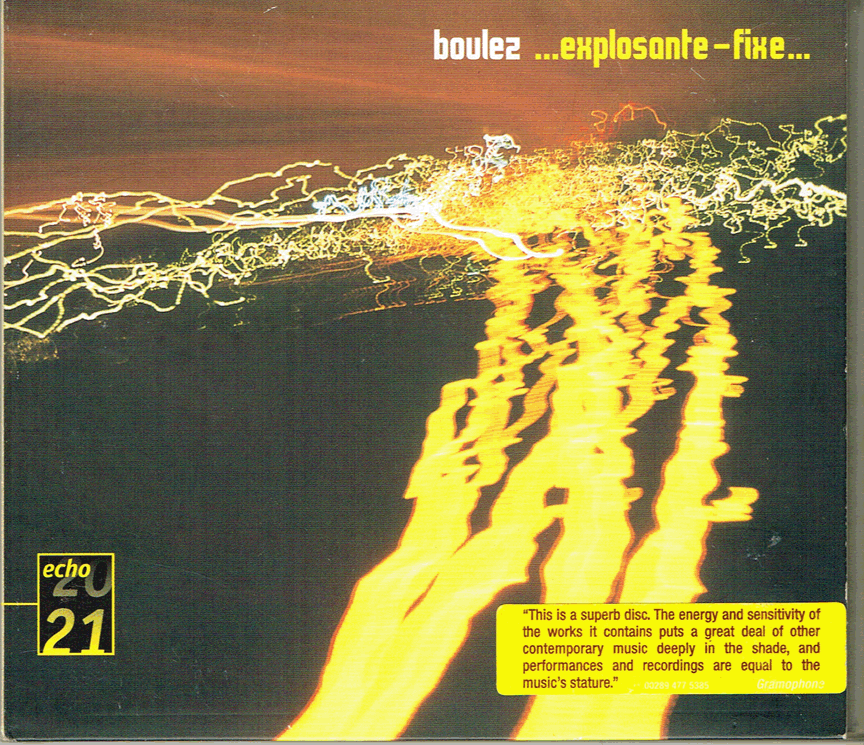
"On January 5, 1973, the Chamber Music Society of Lincoln Center played Boulez's explosante-fixe, his first major composition after becoming music director in New York. During its preparation, Boulez was nervous-a state reserved only for his own creative work. The piece is quiet, unsensational, and the audience responded with polite applause. Schonberg" [the critic: Harold Schonberg] "wrote a respectful review. Explosante-fixe was to be recorded later that week, but, after the performance, Boulez apparently wasn't satisfied and cancelled the recording date.
"Scored for vibraphone, harp, violin, flute, clarinet, trumpet, and a number of complicated devices including a giant new electronic instrument, the Halaphone, the work was supposed to have lasted eighteen minutes. But in its first performance it lasted much longer than that. The new instrument-named for its inventor, Peter Haller-was said to have been capable of projecting sounds in various directions and at various speeds. It is reported to have cost Miss Alice Tully $5,000 to bring it here from Germany." - p 222
To requote Peyser quoting Boulez: "The same frenzy for technology began in Europe about 1953. By 1958 it had all died down. The idea of electronics as the big future of music is just an American trick of fashion." In other words, Boulez sd that 'We Europeans have been there, done that - but we're so sophisticated that after 1958 we knew that that was a dead end.' &, yet, here's Boulez in 1973 using electronics. Don't that just beat all? I'm fairly knowledgable about electronic instruments &, yet, I've never heard of the Halaphone before &, in fact, on the CD recording that I have of explosante-fixe there's no mention of the Halaphone. Instead, there's "IRCAM/Eelctro-scoustic realization: Andrew Gerszo". As for Harold Sconberg's January 7, 1973 review in the New York Times?:
"Music: Now We Have the Halaphone
"Remember those early, innocent days in 1959 when stereo recording was introduced? When the engineers had the joy of recording Ping-Pong balls: left speaker, middle, right speaker? Tap, tap, tap, and your head was moving left to right. Onward goes time, and instruments are more and more sophisticated, and now we have the halaphone.
"This electronic gadget was used in the new composition by Pierre Boulez, which was commissioned by the Chamber Music Society of Lincoln Center and had its premiere at Alice Tully Hall on Friday night. Mr. Boulez has named his new work ". . explosante/fixe ...." and has scored it for flute, clarinet, trumpet, violin, viola, cello, harp and vibraphone. And halaphone. It is his first work using electronics.
"But this is electronics with a difference. Previously, most composers were content to create taped sounds and relay them through recorders and speakers. But the halaphone picks up a sound and projects it in various directions, at various speeds, making it move all over the hall.
"Mr. Boulez has fallen upon the halaphone with the enthusiasm of those 1959 stereo engineers. The gadget does give a composer a chance to experiment with a new kind of sound, and all kinds of ingenious effects are possible. For example, "explosante/fixe .. ." starts with a flute solo. Presently the flutist is in effect playing a duet with herself (it was Paula Robison at this concert), with her sound coming out in various parts of the hall in a different timbre and even a time delay (for this, an echo chamber).
"The Program
"??
"In the music itself, Mr. Boulez does not appear to have broken new ground. He has composed a piece in which instruments play on a given level ("fixe"), alternating with the "explosante" of other instruments. The language is serial-derived, athematic, organized (if one knows Mr. Boulez) in an overwhelmingly integrated manner. Webern is in the background; there are the Boulez and Stockhausen of the fifties; there is the emphasis on construction and organization -a good halfhour's worth.
"Mr. Boulez sat at the rear, amid the electronic jiggerypokery. The musicians were up front, each with a microphone that the technicians could cut in and out. At the end, there were many bravos, a few muted boos, and a good round of applause."
- https://www.nytimes.com/1973/01/07/archives/music-now-we-have-the-halaphone-the-program.html
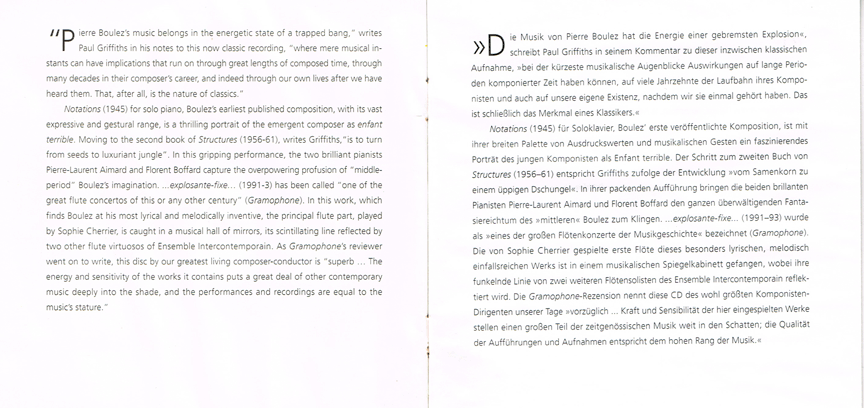
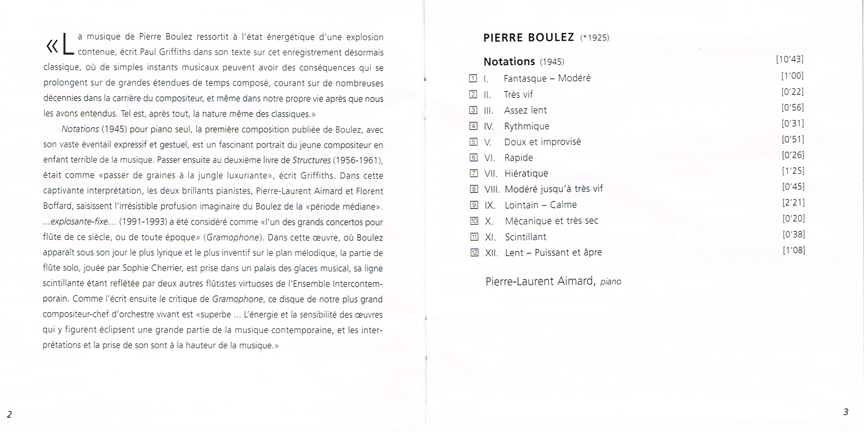
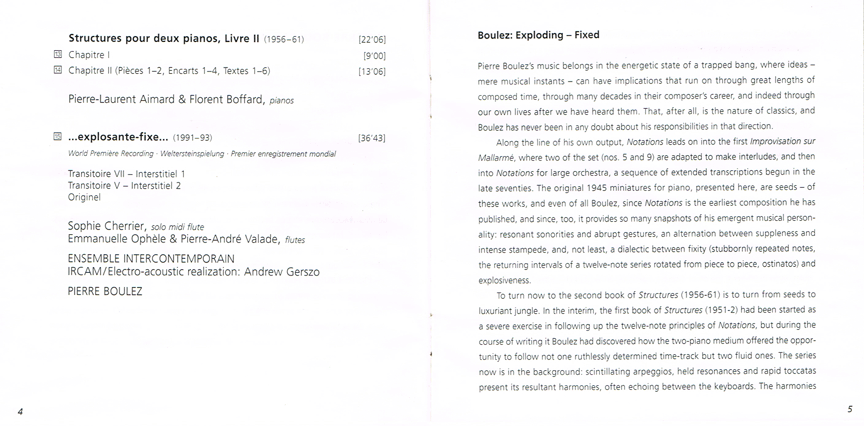
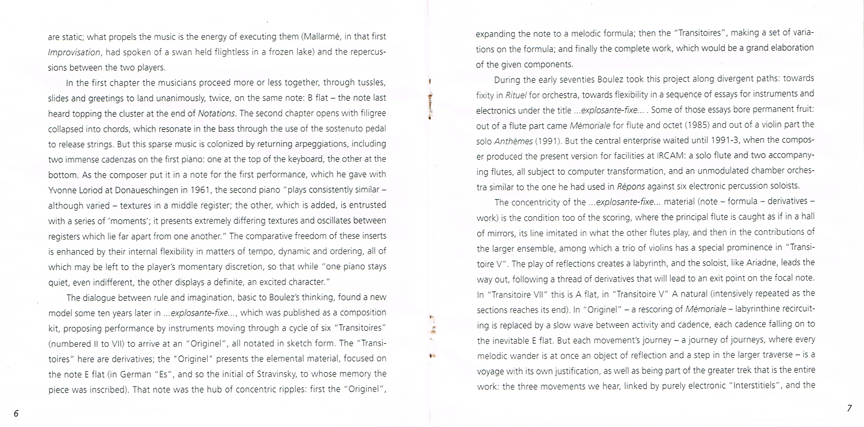
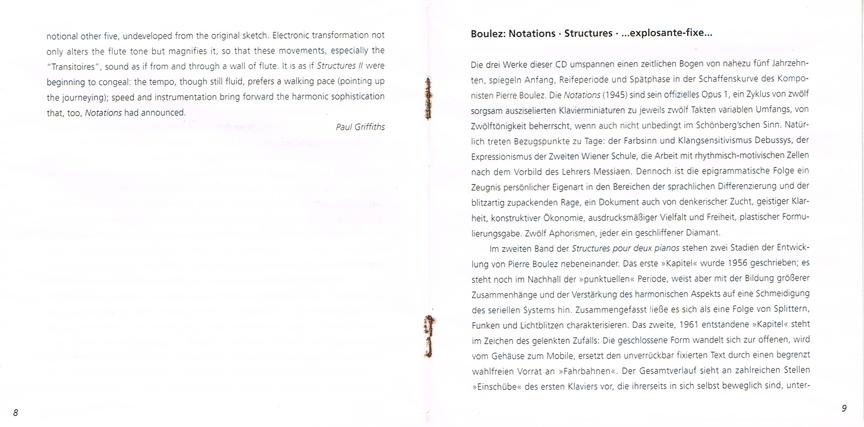
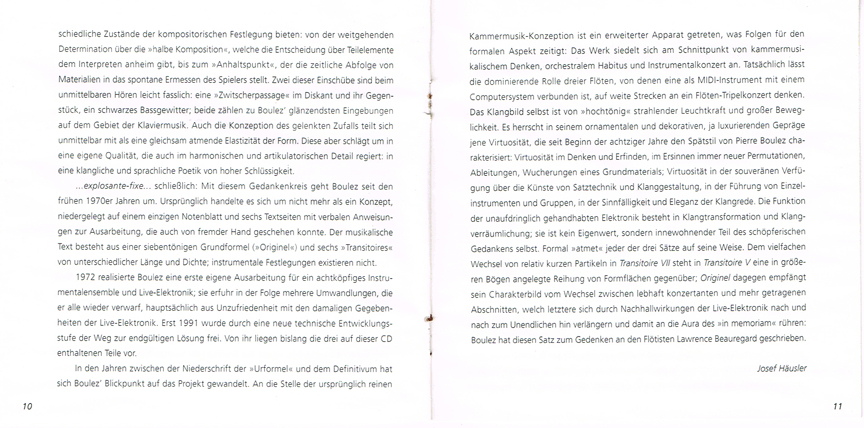
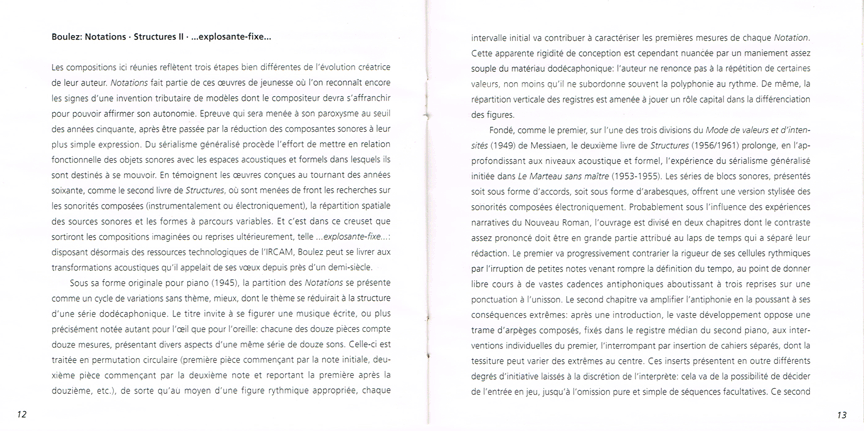
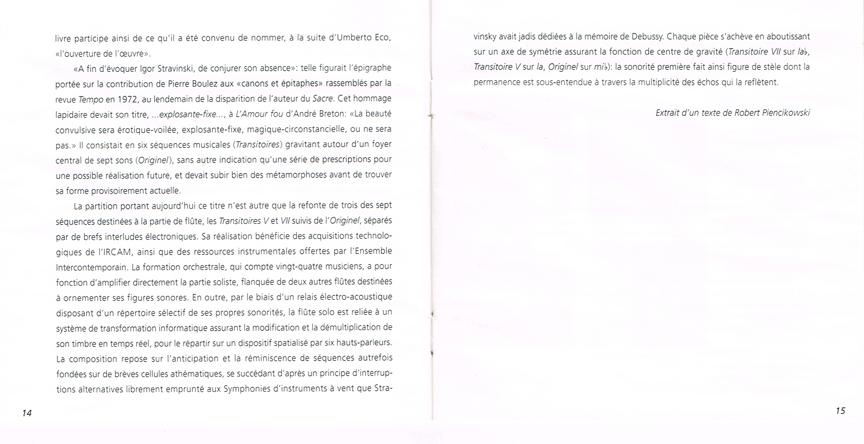
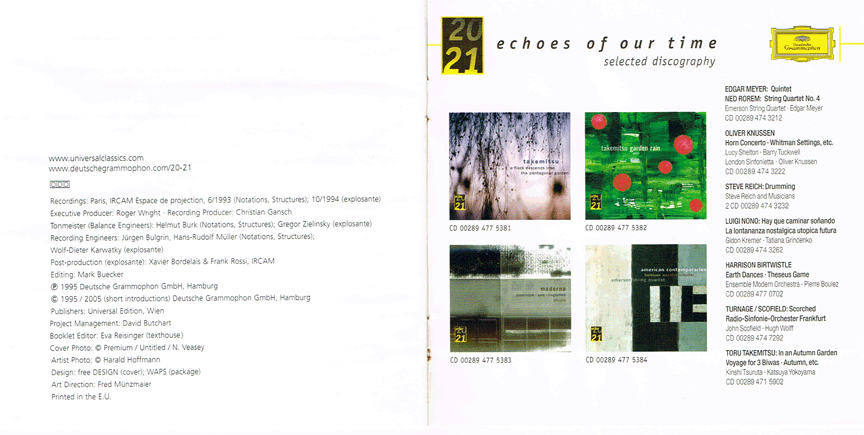
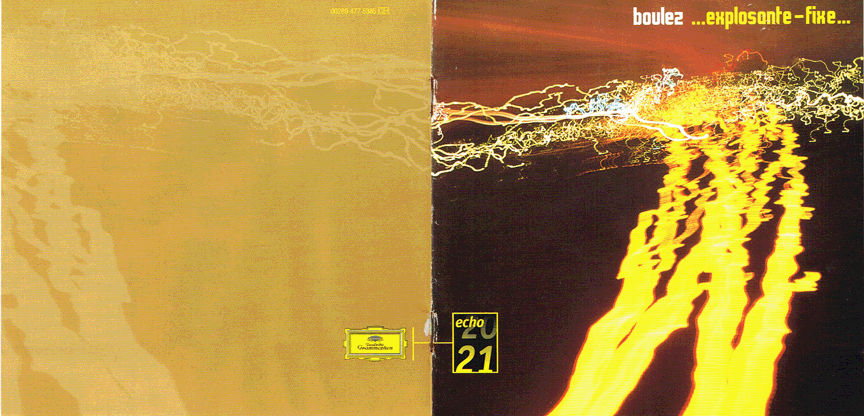
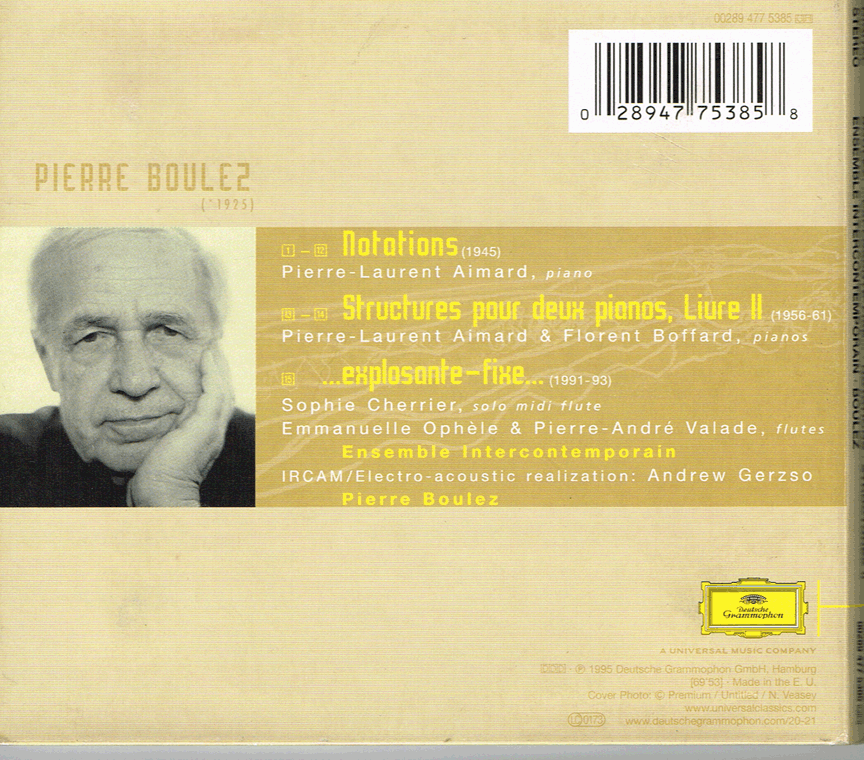
But what was the fate of the Halaphone? In cursory research online I find the above as the 1st entry. The 2nd entry, & the only one of the 1st page's worth that seemed relevant, was a question, "What is "halaphone"?", to the Steve Hoffman Music Forums that contains this: "Anyone familiar with "Halaphone"? It was a device created by one Hans-Peter Haller, and I found out about it in the January 20, 1973 issue of Billboard". ( http://forums.stevehoffman.tv/threads/what-is-halaphone.306906/ ) I see no reply to the question. The Halaphone is not mentioned in Paul Griffiths's CD notes. Are we to interpret that as a sign of I-want-people-to-forget-that-I-ever-made-the-Halaphone-boo-boo? Imagine what Boulez wd've sd about the use of the instrument by any other composer other than himself - esp an American!!!!! Here's what I come up w/:
'American composers continue to act as if electronics can save the day with their weak cheap compositions. The premier of "Blow-it-out-your-ass, Mr. Breton" at Alice Tully Hall used electronics that apparently its composer, "Pi" Crumbs (named after his inability to count rationally), was bilked into spending inordinate amounts of someone else's money on. The device?: a "Halaphone". Crumbs was hoping gimmickry that he didn't understand would save his otherwise tepid piece. Alas, instead of saving it, the Halaphone more than doubled its length - making an already tepid piece something that left the audience cold. A vacuum cleaner would have been a better choice. It might very well take another 4 decades to erase memory of this embarassment with a recording that tries to recoup the losses.'
Ok, ok, that's not fair, I'm pretending to put words in Boulez's mouth. But, honestly, if even half of what Peyser quotes Boulez as saying is true, he deserves the parody. Consider this:
"About the same time, Boulez began to compose again. He says he was brought back to coposition by Stockhausen's Momente because that piece was so "bad." Stockhausen completed it one year after the release of Sergeant Pepper-what one writer has called the "flower-child movement's anthem." As the Beatles appropriated techniques from the music avant-garde, so Stockhausen, in this particular work, appropriates much of the manner and message of rock.
"Momente, which opens with a resounding strike on a gong and a soprano's piercing invitation to "listen to the moments, to the music of love," is scored for brass, electronic organs, and percussion instruments. Bizarrely dressed hippies stream through the theater as they sing, shout, mutter, giggle, clap their hands, and stamp their feet. "Momente brought me strongly back to composition," Boulez says, "because it was the cheapest thing Stockhausen had done." As Stockhausen's "good period" had moved Boulez away from composition, Stockhauen's "bad period" moved him back in. For Boulez, Stockhausen's submission to the vulgar and popular undermined the essence of "music" in music." - p 230
I got a copy of the record of "Momente" in 1974. The record was published by nonesuch, always a good sign. The cover has an artwork by Stockhausen's 2nd wife, Mary Bauermeister, whose work I like. According to the liner notes "Momente was composed in 1961-62 on commission from the West German Radio, Cologne." According to the notes, the 1st performance took place in Cologne, May 21, 1962. Unmentioned in Peyser's description are the 4 choral groups. The recording I have begins w/ hand-clapping, wch is very prominent, & no gong. Since, to again quoe the notes, "It is not a closed work with unequivocally fixed beginning, unfolding, and end" it's not surprising that the version Peyser might've witnessed wd be different. Still, I find Peyser's description very suspect. The piece was composed from 1961-62, 5 yrs before Sgt Pepper's Lonely Heart's Club Band came out. Therefore, it wasn't influenced by it.
A Wikipedia article dates the term "hippie" to predating the 1960s but as a person who was alive during that time & who was often called a "hippie" w/o self-declaring myself as such, I think this part of the Wikipedia entry is more relevant:
"In a June 11, 1963 syndicated column by Dorothy Killgallen, she wrote "New York hippies have a new kick ? baking marijuana in cookies". The term "hippie" appears in a New York Times book review of April 21, 1964"
[..]
"Numerous theories abound as to the origin of this word. One of the most credible involves the beatniks, who abandoned North Beach, San Francisco, to flee commercialism in the early 1960s. Many of them moved to the Haight-Ashbury area of San Francisco, where they were idolized and emulated by the young university students who lived in the neighborhood. The beats (the hip people) started calling these students "hippies", or younger versions of themselves. Actually, the counterculture seldom called itself hippies; it was the media and straight society who popularized the term. More often, we called ourselves freaks or heads. Not until later did we begin calling ourselves hippies, and by then we were "aging hippies". An alternate spelling seldom used in the United States by people in the know was hippy, but it was spelled that way in England - John Bassett McCleary"
- https://en.wikipedia.org/wiki/Etymology_of_hippie
In other words, the term "hippie" & 'hippies' as they've been thought of for the last 55 (or less) yrs, didn't even exist when Stockhausen composed the piece. Stockhausen's comments in the liner notes seem particularly apropos:
"Many music listeners feel it objectionable when the chorus members not only sing in the customary manner but also employ small instruments or clap their hands, snap their fingers, stamp their feet, or slap their knees, for the sight of such methods of tone- and noise-production can have a comic effect (above all when 64 ladies and gentlemen of the chorus, clad in formal clothes and long evening gowns, perform such tasks seated, and the soloist makes similar gestures). In one newspaper criticism, there was talk of a cabaret performance and the whole thing was ridiculed. What should one do in such a case? When electronic music began, I had to put up with the same reactions. As soon as noises were introduced into music, listeners laughed and swore and labeled the whole thing a hoax or a wilful destruction of the Western musical tradition. My very first compositions (1951-52) met with the same reactions when single, isolated tones, short groups of tones, or long pauses appeared in this "punctual" music. I do know that this reaction quickly subsides with listeners and spectators who hear my work several times, and that their perception then concentrates, as ever, on what I have made with my sound material and the necessary methods of sound production-i.e. the music; but it seems generically inherent in my musical development that what concerns most listeners at first contact with my music is not the music but the "paraphernalia"-the "spectacle", to put it negatively. I don't know quite how to deal with this misunderstanding; I must put up with being labeled "sensationalist", "out to create a shock", even "cabaret clown", before understanding of the purely musical range of problems of tone-color composition sets in. Even when one no longer sees anything at all-in other words, when listening to loudspeakers-extra-musical associations posess many listeners, once more on the basis of the unaccustomed treatment of sound."
I was so surpised by Peyser's description of "Momente" that I just listened to it again for the 1st time in a long time & found it as stunningly original & fresh as ever. To beat a dead critic by now, I find it much more full of life than anything by Boulez. I remember being profoundly impressed by this piece when I 1st heard it. Where the "vulgarity" is is beyond me. It seems that the typical bourgeois response to innovation is rearing its ugly ass & shttting on the imagination, as usual. If Peyser thinks that this piece was somehow indebted to rock music then I find it hard to agree. There's no steady beat, for one thing, something that's de rigeur in rock. It seems that it might've been interesting to watch as well as to listen to so I can accept the possibility that it was theatrical. As far as I'm concerned, that's good. But for a more pop music oriented musical theater piece, I suggest the Incredible String Band's U as a more viable candidate.
I reckon Peyser must've been referring to the version of "Momente" from 1972, 5 yrs after Sgt Pepper's Lonely Heart's Club Band :
"Completion of the D moments was only accomplished in 1969, and the first complete performance took place in Bonn on 8 December 1972, in a version beginning with the newly composed, 25-minute-long I(k) moment, which is very different from the previously composed moments and which some critics at the time felt was out of proportion to and out of character with the rest (Griffiths 1973; Maconie 1973, 33; Maconie 1976, 175). Rudolph Frisius simply regards the original "applause" moment beginning as being characteristic of the "informal" music in the spirit of the early sixties, whereas the new beginning of the 1972 version looks forward, in its evocative ritual gestures, to Stockhausen's works of the seventies (Frisius 2008, 148)." - https://en.wikipedia.org/wiki/Momente
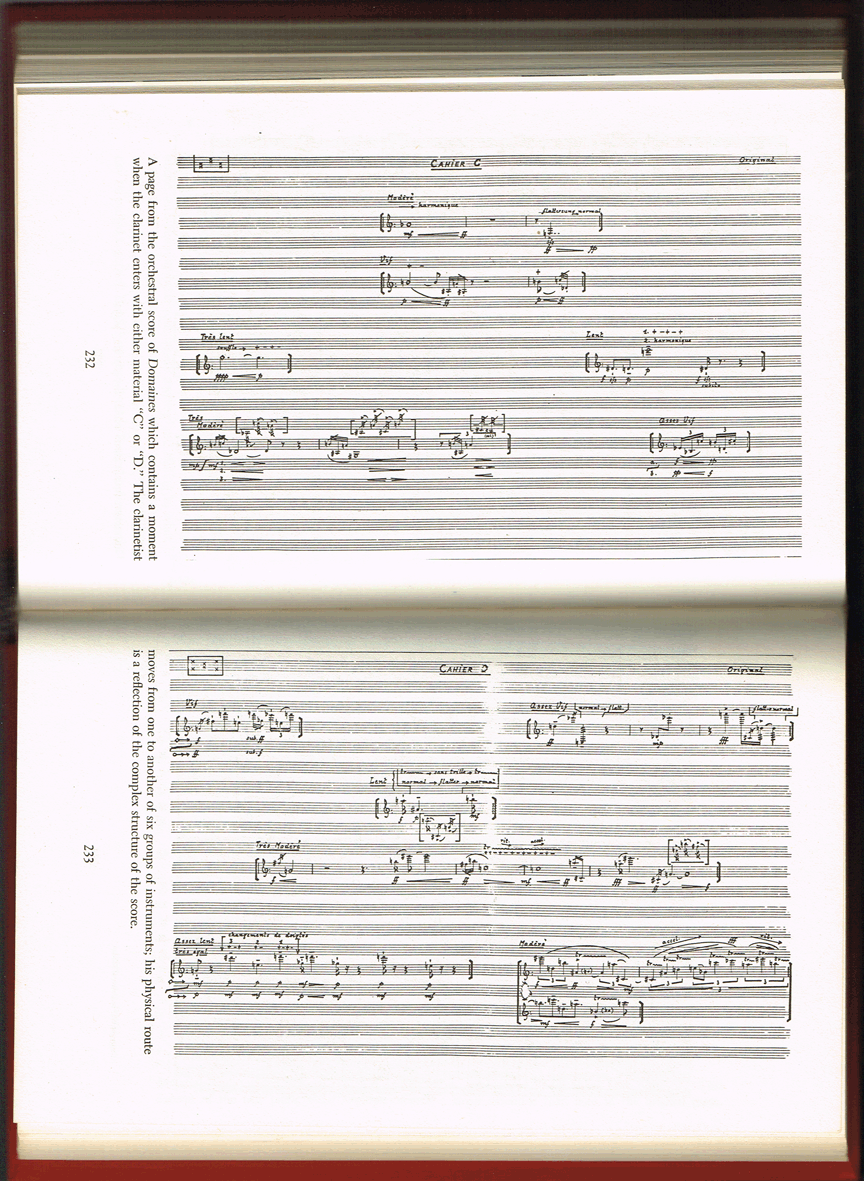
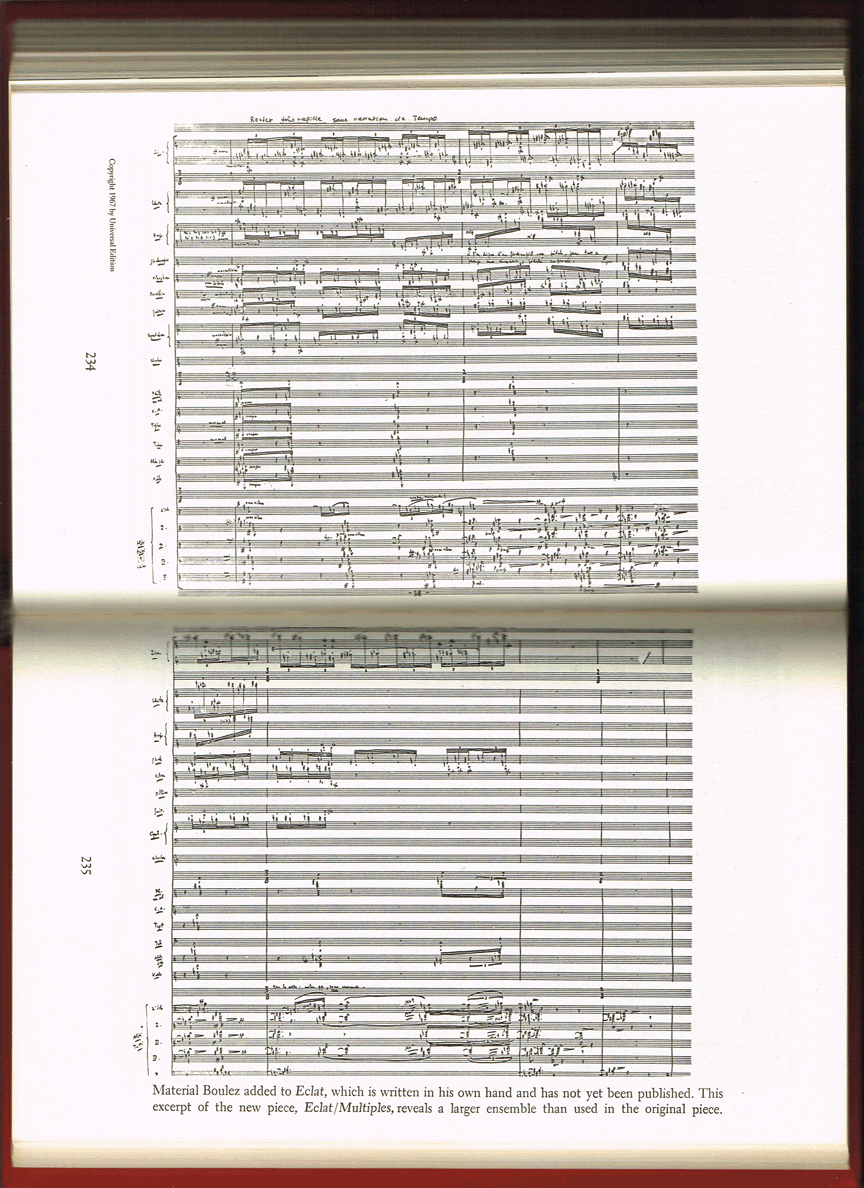
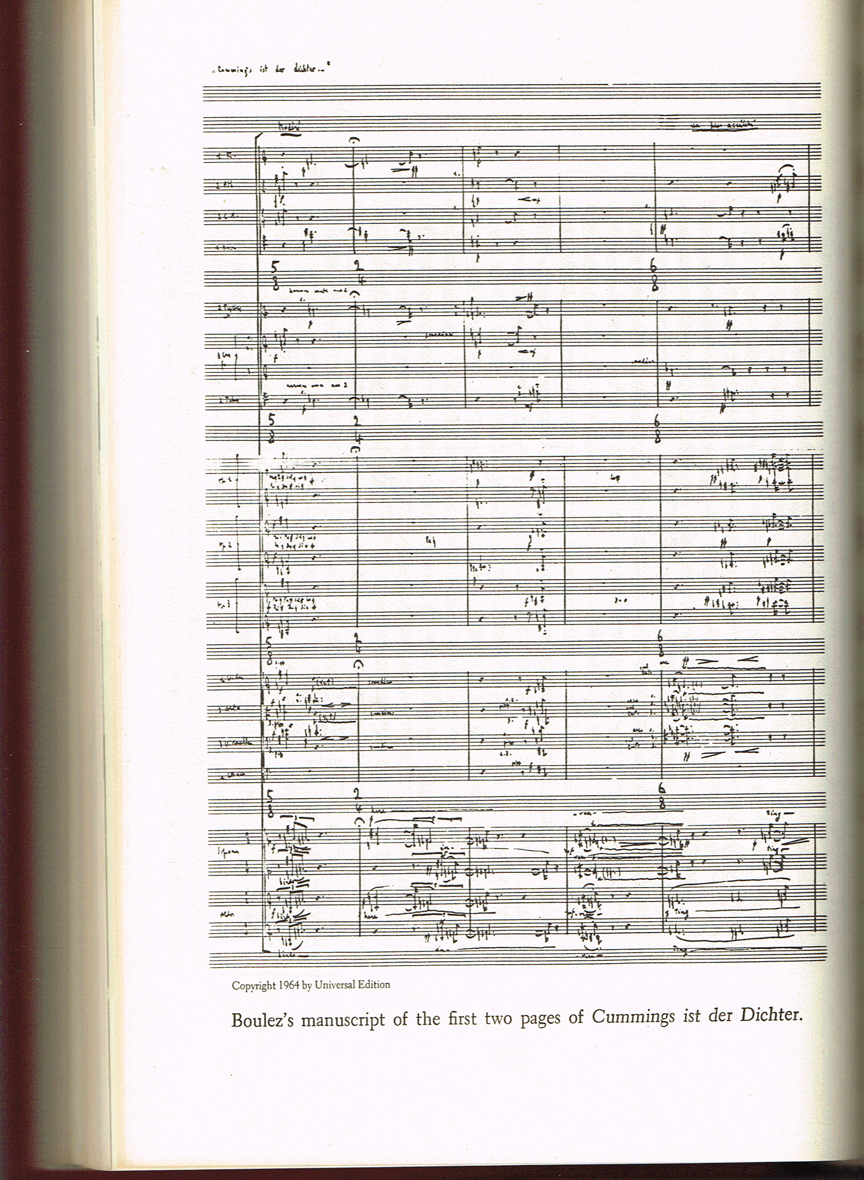
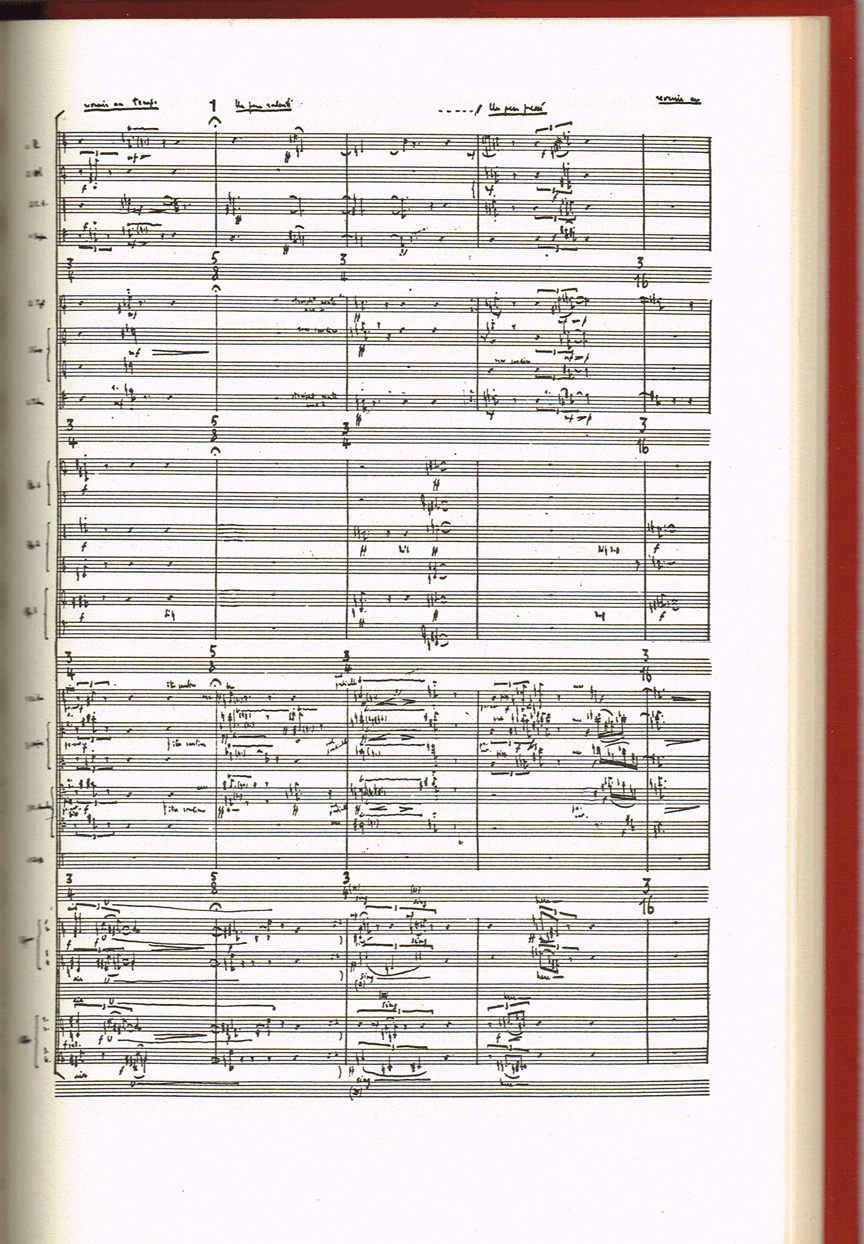
Boulez is presented as continuing to diss Stockhausen, this time in relation to a performance under Boulez of "Mixtur":
"["]Stockhausen prefers to surround himself with subordinates. He likes feudal relationships.
""So I said to him, 'If you do not want to come, how are we to realize this piece?' In reply he sent inadequate, unprofessional, pontificating acolytes. One of them told the percussionist how to scratch a tam-tam. This kind of pontificating I do not need. The clan of Stockhausen was very hostile. Those in charge of the ring modulators were never on time. I said, 'If you want to do it, do it; if you don't, I don't care.' This was reported to Stockhausen by his Mafia. Then he and I talked. I said to Stockhasuen, 'I can talk with you but not with those on a low level with the Lord.'
""After it was over. he told me he heard the work did not receive a good performance. I said it was not a good work to begin with. We have not spoken since then."" - p 242
It just doesn't stop, does it?! Once again, the pot calls the kettle black: It seems to me that Boulez "prefers to surround himself with subordinates. He likes feudal relationships" & that's a reason why he was a conductor & the head of IRCAM. I have no idea who the purported "inadequate, unprofessional, pontificating acolytes" were as of January, 1972, the date of the performance in question, but here're some examples of people who assisted Stockhausen &/or were his pupils:
Cornelius "Cardew served as an assistant to Karlheinz Stockhausen from 1958 to 1960." [..] "In 1959, Cardew performed in the first British performance of Pierre Boulez's Le marteau sans maître at Dartington International Summer School of Music (having learnt to play the guitar for the occasion as no professional guitar player was available)." [..] "Cardew stated his attitude towards the avant-garde in Stockhausen Serves Imperialism" ( https://en.wikipedia.org/wiki/Cornelius_Cardew ) (a PDF of the latter can be downloaded from UbuWeb here: http://www.ensemble21.com/cardew_stockhausen.pdf )
Hugh Davies: "After attending Westminster School, he studied music at Worcester College, Oxford from 1961 to 1964. Shortly after he travelled to Cologne, Germany to work for Karlheinz Stockhausen as his personal assistant. For two years, he assembled and documented material for Stockhausen's compositions and was a member of his live ensemble." [..] "From the 1960s onwards Davies made very significant contributions to the documentation of electronic music history, and in 1968 published a catalogue in which he listed - ostensibly - all the works of electronic music ever composed worldwide. It has been argued that, through his research and documentation, Davies characterised electronic music for the first time as a truly international, interdisciplinary field." - https://en.wikipedia.org/wiki/Hugh_Davies_(composer)
Péter "Eötvös played regularly with the Stockhausen Ensemble between 1968 and 1976. He was a founding member of the Oeldorf Group in 1973, continuing his association until the late 1970s. From 1979 to 1991, he was Musical Director and conductor of the Ensemble InterContemporain (EIC). From 1985 to 1988, he was principal guest conductor with the BBC Symphony Orchestra." - https://en.wikipedia.org/wiki/Péter_Eötvös
Was Eötvös one of the "inadequate, unprofessional, pontificating acolytes"?! He fits the time period. Funny how he went on to become the "Musical Director and conductor of the Ensemble InterContemporain". The list of Stockhausen students & assistants is pretty impressive to me so Boulez's criticisms seem more than a tad vitriolic & unbelievable, If those "in charge of the ring modulators were never on time" that wd annoy me too. I have a recording of "Mixtur". It's not conducted by Boulez. The piece is dated from 1964 & uses 4 ring modulators to effect the orchestral instruments. That wd've been very remarkable at the time & wd still be remarkable today. Stockhausen's notes to the record say:
"I made a new version for 31 players in 1967; this score for MIXTUR for small ensemble has appeared seperately (Universal Edition, Vienna).
"The premiere performance of the version for small ensemble took place on August 23, 1967, in Frankfurt with the ensemble Hudba Dneska, Bratislava, conducted by Ladislav Kupovnic to whom this version is dedicated. The sine-wave generators were played by Johannes G. Fritsch, Harald Bojé, Rolf Gehlhaar and David Johnson; the balance between loudspeaker and orchestral sound was regulated by me."
This is the same personel as on the record. Cd these have been the "inadequate, unprofessional, pontificating acolytes"?! I have other recordings w/ Fritsch, Bojé, & Gehlhaar on them & they sound good to me. I suspect that 'the problem' wasn't that those guys were "inadequate, unprofessional, pontificating acolytes" but that they weren't subervient to Boulez. Maybe Stockhausen was nicer to them.
"Elliott Carter, at present America's most celebrated composer, has frequently confided to friends that those in responsible positions in universities, on foundation boards, and with prize committees understand nothing of the new music they hear, and that one is therefore obliged to use all the resources at hand to get what every composer wants most: his music performed, published, and recorded extensively."
[..]
"Of course there are now performing groups specializing in the twentieth-century repertoire; this is the last quarter of the century. But even here these groups are generally led by an authoritarian composer to whom the rest of the group is attached. Stockhausen's "Improvisation Group" in Cologne, Wuorinen's "Group for Contemporary Music" in New York are examples of this particular practice." - p 247
As for Elliott Carter being "America's most celebrated composer" in the 1970s?: I find that a little hard to accept. Maybe he was celebrated in NYC. Maybe. But I would think that someone more popular, like Leonard Bernstein, w/ pieces like "West Side Story" coupled w/ his having been the conductor of the New York Philharmonic Orchestra, wd be more likely. Carter is a very dry, very formal, very academic composer whose work wdn't be very accessible to anyone outside academia & even there only moderately so. Even Milton Babbitt might've had more renown at the time. To quote what I wrote eariler: "Nonetheless, in the Time-Life boxset of 4 records entitled The Story of Great Music: The Music of Today Babbitt & Boulez are the only 2 'modernist' composers allowed on, despite the collection's having been published in 1967."
It seems that Boulez grew on Peyser as she wrote the bk b/c she seems to develop a chip on her shoulder. I don't know of any group founded & led by Stockhausen called "Improvisation Group". Stockhausen worked w/ players who were open to trying out techniques that few other people wd. As such, there was a group of musicians that he regularly worked w/ but they weren't a group w/ a name like a band. "Wuorinen's "Group for Contemporary Music"" was actually cofounded w/ Wuorinen's fellow Columbia University students Joel Krosnick and Harvey Sollberger. The presentation of these groups as run along authoritarian lines seems exaggerated to me. Obviously, given that the players around Stockhausen were there to play his music, Stockhausen was going to be the leader. I've already addressed Vinko Globokar's problem w/ that. But, c'mon, Wuroinen & the other composers whose work The Group for Contemporary Music plays are all through-notation composers so their word on what goes in a piece is naturally respected. Show me a classical music group dedicated to through-composed music where the composer's opinion is disregarded. Peyser seems to think that this 'authoritarianism' is somehow unique to comtemporary music. Instead, it's been more undermined in contemporary music than anywhere else. Peyser goes on to claim:
"What separates comtemporary "serious" music from the great art of the past is its refusal to give the listener form that is immediately graspable." - p 250
Be that as it may, that doesn't mean that composers of the past were greeted by total enthusiasm for the 'graspable' nature of their work. Was Beethoven one of the great composers of the past who gave "the listener form that is immediately graspable"? One might think so given how revered he's become post-mortem. But I invite the reader of this review to read the Beethoven section of the wonderful Nicolas Slonimsky edited Lexicon of Musical Invective for a taste of reality. I provide a few choice quotes:
"Recently there was given the overture to Beethoven's opera Fidelio, and all impartial musicians and music lovers were in perfect agreement that never was anything so incoherent, shrill, chaotic and ear-splitting produced in music. The most piercing dissonances clash in a really atrocious harmony, and a few puny ideas only increase the disagreeable and deafening effect." (1806)
"We find Beethoven's Ninth Symphony to be precisely one hour and five minutes long; a fearful period indeed, which puts the muscles and the lungs of the band, and the patience of the audience to a severe trial. . . . The last movemment, a chorus, is heterogeneous. What relation it bears to the symphony we could not make out; and here, as well as in other parts, the want of intelligible design is too apparent." (1825)
It wd seem that the form wasn't so 'graspable' in Beethoven's day either. Let's face it, some things haven't changed: people are still stupid. Composers are going to be doing things that're the result of their dedication & expertise, the inexpert audience isn't necessarily going to understand those things at 1st. The apparently very powerful music critic for the New York Times appears to echo Boulez's sentiments:
"If the "linear-analytic" approach does not necessarily make for great art, neither does the "holistic" approach. It is a fact that a good deal of twentieth-century music which displays the most apparently articulated forms had fallen by the cultural wayside. In October 1974. Harold Schonberg devoted a Sunday essay to recalling the ferment in American music during the 1930s and '40s. He mentioned "Copland, Harris, Piston, Schuman, Barber, Shapero, Berger, Smit, Haieff, Fine, Citkowitz, Chanler, Cowell, Cage, Diamond, Dello Joio, Mennin, Hovhaness . . . one can go on and on," Schonberg writes. "Very few had any staying power."
"Schonberg attributes the problem to the fact that great music is a function of personality and that there have been no great personalities in composition in recent times." - p 251
Well, let's see, maybe there haven't been any critics w/ "great personalities" & "staying power". I don't see any biographies of Harold Schonberg for sale online, although his book, The Lives of the Great Composers is. I do see biographies for sale about Aaron Copland, Roy Harris, Walter Piston, William Schuman, Samuel Barber, Arthur Berger (autobiography), Irving Fine, Henry Cowell, John Cage, & David Diamond easily found advertised online. It wd seem that these people had powerful enuf personalities to inspire authors to attempt to preserve their history. Basically, I think Schonberg's statement is preposterous - but then I have the advantage of another 44 yrs of hindsight in wch a plethora of recordings of work by many of these people has come out. I have recordings by 15 of the above listed 18 composers.
In the early 1970s, "At Universal Editions, Alfred Schlee reports that he knows "no young artists who are anything but derivative of the now middle-aged ones."" (p 252) I suggest that Schlee wasn't looking too hard. For one thing, there were the Minimalists, who were still fairly young: Steve Reich (born 1936). He wd've been 36 around the time of Schlee's complaint so maybe he was too "middle-aged". Let's try again: What about Glenn Branca (b. 1948): he wd've been in his 20s. Frank Zappa (1940)?: He wd've been in his early 30s. But both of these guys came out of rock music, right? That's not a problem for me but it might've been for Schlee. Tim Hodgkinson ( http://idioideo.pleintekst.nl/Top100CHodgkinson.html ) (1949)? He wd've been in his 20s.. but he's another one connected to rock music AND he mightn't have started at the time Schlee made the statement. Warren Burt (1949): He was probably composing by then & he wasn't a rock musician or derivative. In short, I suspect Schlee of being myopic, of only seeing what reinforced his prejudices. Same goes for Boulez:
""In March, 1970," Boulez sd: "We are still using half-tone scales because there are no instruments suited to using other scales. If you want to write music built on one-quarter or one-third scales, there is absolutely nothing available right now. . . .["]" - p 253
WRONG. Here's a list of some obvious microtonal composers as of 1970:
Julian Carrillo, Mildred Couper, Alois Hába, Lou Harrison, Charles Ives, Ben Johnston, György Ligeti, Harry Partch, Giacinto Scelsi, Ezra Sims, Karlheinz Stockhausen, James Tenney, Ivan Wyschnegradsky, Iannis Xenakis, LaMonte Young..
The list goes on & on. All these composers used instruments. Maybe some of them hadn't composed any microtonal music by 1970 but most of them had. Some of them were a generation or 2 before Boulez. It's easy to play microtonal music on a contrabass, e.g.. Of course, Boulez wasn't always such an ignorant person, he hit the mark from time-to-time. Talking about concert music that people prefer hearing over newer works:
"If you asked them to analyze what they are listening to, most of the time it reminds them of their youth. . . . It is like a reflex of Pavlov; when they hear the music they loved at twenty, they remember the years when their hormones were more active." - pp 255-256
Yeah, reinstantiation.
"I arrived at Boulez's house in the French Alps in August 1973 to attend that last session of a six-day IRCAM seminar. Boulez had invited architects, technicians, musicologists and composers from at least six countries to the twelfth-century abbey, an appropriate setting, for, in the Middle Ages, music was an intellectual discipline taught along with mathematics in the universities. The abbey was one hour's drive from Boulez's house. As we drove, Boulez said the major point of the Institute was that "every individual must be free. That is not a moral point of view.. It is a vital point of view. Stockhausen imposes himself so completely on the Cologne project that no one else has a chance to breathe. I have goals but I allow for a give and take. The Institute has become much richer than originally planned." IRCAM has the money to match Boulez's goals. The funds poured into the electronic studio at Cologne from its inception to the present day do not match one year's budget for the Paris Institute." - p 259
Georgina Born has written a bk called Rationalizing Culture - IRCAM, Boulez, and the Institutionalization of the Musical Avant-Garde I'm in the midst of reading it. I suspect that she didn't find IRCAM to completely support the "every individual must be free" philosophy if only b/c of hierarchical cultural subtexts that reinforce 'high' culture vs pop culture. Maybe I'm wrong. I'll post my review of her bk to Goodreads when I'm done & to [this] website that I'm making re Boulez that'[s] here: http://idioideo.pleintekst.nl/Top100CBoulez1.html . That webpage will greatly flesh out this review w/ illustrations of recording covers & Boulez score examples taken from Peyser's bk.
"Babbitt said the Institute would have difficulty attracting scientists." [..] "Look at Noam Chomsky. To him music is folkdancing, not Schoenberg. Robert Oppenheimer thought of composers as talented children."" - p 260
I reckon Babbitt is right about that one - although I'm sure I've met some exceptions.
"Boulez's administrators include Lucian Berio, in charge of electronics; Vinko Globokar, in charge of "instruments and voice"; Jean-Claude Risset, in charge of computers" - p 264
I don't know whether IRCAM attracted any notable scientists but it definitely attracted a killer staff judging by the 3 listed above. Peter Heyworth, a music critic, wrote that if IRCAM fulfills Boulez's ambitions:
"["]IRCAM will probably succeed in pushing out the frontiers of sound as drastically as the great explorers of the Renaissance succeeded in expanding man's knowledge of the Earth."" - p 264
Let's hope that it doesn't have similarly disastrous consequences for the locals.
"The institute Boulez is organizing in his native land will give him a place to go where he hopes to create a different kind of music. It may also give music a place to go. For finally, it is inconceivable that art will turn back, that it will not develop further in some genuinely new, presently unimaginable way." - p 265
I think that's hyperbole but I'm not sure I'm exactly against IRCAM. I am sure that IRCAM wd never be for me & I represent some sort of future, the underfunded future I reckon.
- April 24, 2018 notes from tENTATIVELY, a cONVENIENCE
to
Pierre Boulez, IRCAM - part 4 (of 4)
idioideo at verizon dot net
to the tENTATIVELY, a cONVENIENCE Anti-Neoism page
to the tENTATIVELY, a cONVENIENCE Audiography page
to the tENTATIVELY, a cONVENIENCE Bibliography page
to my "Blaster" Al Ackerman index
to the tENTATIVELY, a cONVENIENCE Books page
to the tENTATIVELY, a cONVENIENCE BYOC page
to the tENTATIVELY, a cONVENIENCE Censored or Rejected page
to the tENTATIVELY, a cONVENIENCE Collaborations page
to the tENTATIVELY, a cONVENIENCE (d) compositions page
to Amir-ul Kafirs' Facebook page
to the "FLICKER" home-page for the alternative cinematic experience
to tENTATIVELY, a cONVENIENCE's GoodReads profile
to the tENTATIVELY, a cONVENIENCE Haircuts page
to the tENTATIVELY, a cONVENIENCE Home Tapers page
to the tENTATIVELY, a cONVENIENCE index page
to the tENTATIVELY, a cONVENIENCE Instagram Poetry page
to a listing of tENTATIVELY, a cONVENIENCE's manifestations on the Internet Archive
to the tENTATIVELY, a cONVENIENCE as Interviewee index
to the tENTATIVELY, a cONVENIENCE as Interviewer index
to tENTATIVELY, a cONVENIENCE'S Linked-In profile
to tENTATIVELY, a cONVENIENCE's Mail Art page
to the mm index
to see an underdeveloped site re the N.A.A.M.C.P. (National Association for the Advancement of Multi-Colored Peoples)
to tENTATIVELY, a cONVENIENCE's Neoism page
to the DEFINITIVE Neoism/Anti-Neoism website
to the Philosopher's Union website
to the tENTATIVELY, a cONVENIENCE movie-making "Press: Criticism, Interviews, Reviews" home-page
to tENTATIVELY, a cONVENIENCE's Score Movies
to SMILEs
to find out more about why the S.P.C.S.M.E.F. (Society for the Prevention of Cruelty to Sea Monkeys by Experimental Filmmakers) is so important
to the "tENTATIVELY, a cONVENIENCE - Sprocket Scientist" home-page
to the tENTATIVELY, a cONVENIENCE Top 100s page
to tENTATIVELY, a cONVENIENCE's Top 100 Composers index
to Psychic Weed's Twitter page
to tENTATIVELY, a cONVENIENCE's Vimeo index
to Vine movies relevant to tENTATIVELY, a cONVENIENCE made by Ryan Broughman
to tENTATIVELY, a cONVENIENCE's presence in the Visual Music Village
for info on tENTATIVELY, a cONVENIENCE's tape/CD publishing label: WIdémoUTH
to a very small selection of tENTATIVELY, a cONVENIENCE's Writing